2018-22 Progress Report on the Pitt Sustainability Plan


sustainable.pitt.edu
2023
April
The University of Pittsburgh defines “sustainability” as balancing equity, environment, & economics so current and future generations can thrive. Keeping this in focus, Pitt has active sustainability efforts and initiatives across disciplines, domains, and scales.

We continually challenge the status quo to create sustainable solutions, actions, strategies, and opportunities for students, faculty, staff, our communities, Western Pennsylvania, and the world.
Every person and decision matters; we welcome your help and encourage you to get involved!

TABLE OF CONTENTS Introduction............................................. 4 Pitt Sustainability Governance............... 5 Tracking Performance............................. 6 Stewardship Landscape & Ecology.............................12 Water Systems........................................16 Energy & Emissions............................... 21 Transportation & Mobility.................... 25 Materials & Resources.......................... 31 Exploration Teaching & Learning............................. 42 Research................................................. 48 Innovation & Entrepreneurship........... 55 Partnerships........................................... 58 Global Outreach..................................... 64 Community & Culture Engagement & Awareness.................... 74 Equity & Access...................................... 81 Food Systems......................................... 88 Health & Well-being............................... 93 City & Regional Connections............... 100
2
A NOTE FROM THE EXECUTIVE DIRECTOR
OF SUSTAINABILITY
The University of Pittsburgh’s sustainability journey dates back to 1990 with commitments, activities, and engagement deepening and increasing over the past three decades. In 2018 the Pitt Sustainability Plan set the University’s sustainability goals and strategies, further cementing sustainability as a core value for Pitt. Since then, Pitt students, faculty, staff, and partners have made noteworthy progress towards creating a more sustainable culture, campus, and university.

I am proud to recognize our collective progress on each of the Pitt Sustainability Plan’s 68 distinct and ambitious goals with this Progress Report summarizing the outcomes of work on each goal accumulated from 2018 through 2022. This summary is intentionally focused on the Plan’s original goals -- it is not an exhaustive tally of sustainability-focused andrelated initiatives that advance the University’s commitment to stewardship, exploration, community, and culture.
We celebrate our shared achievement of 6 goals alongside the 43 goals we have on target or on track. We must also acknowledge that our headway on 16 goals is off track – and progress on 3 goals is unclear. However, with sustainability as a core value in the Plan for Pitt, the momentum behind our pursuit of Pitt Sustainability Plan goals and strategies is clear.
Since 2018, we have rethought, reframed, and even set new University sustainability goals. The most visible example of the latter is the University’s 2020 commitment to achieving carbon neutrality for the Pittsburgh campus by 2037, which is reinforced by the 2022 Pitt Climate Action Plan. Our shared, strengthened work combating the climate emergency exemplifies how sustainability goals and strategies can change over time, reflecting new realities in our work balancing equity, environment, and economics so current and future generations can thrive.
We are incredibly thankful for each of you who have contributed to our progress so far: this Progress Report exists because of your ingenuity, innovation, and courage to propel sustainability initiatives throughout Pitt, our region, and the world. Regardless of where we are in our journey on each Pitt Sustainability Plan goal, we continue to strive beyond expectations.
As we are personally, organizationally, and socially faced with old and new challenges alike, we need your creativity, collaboration, persistence, and passion more than ever. We call on everyone to engage with Pitt’s rich network of sustainability resources and programs. Alongside the University’s Sustainability and Climate Action Plans, your decisions at Pitt, at home, and around the world make a difference, representing everyday opportunity to positively impact our lives here in Pittsburgh, as well as those of other communities around the world. Together, we are creating a more sustainable future for all.
Looking forward to our ongoing work together,
Aurora Sharrard
Aurora Sharrard Executive Director of Sustainability University of Pittsburgh

3
The 2018 Pitt Sustainability Plan set the University of Pittsburgh's sustainability strategies and goals, organized by 15 impact areas. Many of its 68 goals are interrelated and include collaborations across the University and with community partners.
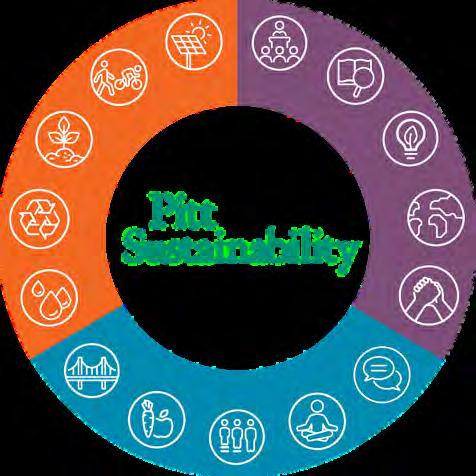
To help answer the question, "How are we doing on the Pitt Sustainability Plan," this 201822 Progress Report on the Pitt Sustainability Plan includes an update on progress made towards all original 2018 Pitt Sustainability Plan goals.
It should be noted that the boundary for this report is the 2018 Pitt Sustainability Plan, so not all Pitt Sustainability activities since 2017 are included or addressed herein.
Pitt Sustainability Plan: Impact Areas
Pitt cares for both the built & natural environments in a manner that ensures responsible & efficient resource management: we continually strive to minimize the negative impacts of our operations.
Through the integration of a multidisciplinary curriculum, groundbreaking research, & partnership, Pitt is working to educate every member of our community, support our leaders, & promote innovation.
Pitt is working to strengthen our campuses & communities by enhancing our culture of sustainability as a shared responsibility for our impact on surrounding communities, the region, & the world.
COMMUNITY
STEWARDSHIP EXPLORATION
& CULTURE INTRODUCTION
4 2018-22 Progress Report on Pitt Sustainability Plan
Pitt Sustainability Governance
The University of Pittsburgh’s sustainability work is guided by the Chancellor’s Advisory Council on Sustainability and its supporting committees. Chartered as the University Sustainability Committee in 2016, the body authored the 2018 Pitt Sustainability Plan and is responsible for its implementation. In February 2020, the committee was elevated to the Chancellor’s Advisory Council on Sustainability, retaining representation from staff, faculty, and students across a variety of departments and expertise.

The Sustainability Council works to align the University’s economic decision-making with ecological principles and human integrity, reflecting present-day and intergenerational equity so that we may regenerate life through networks of reciprocity; it is supported by several subcommittees, including:
ActiveMobilityCommittee—Helpachieveactivemobilitygoalsandensureactivemobility issafe,equitable,robust,andplanned.
CampusTreeAdvisoryCommittee—GuidecampusandUniversityconservationefforts, campuslandscaping,andenvironmentalprotection.
CarbonCommitmentCommittee—Hone,design,andmanagetheUniversity’splanto achieveitscarbonneutralitygoalby2037.
PollinatorHabitatAdvisoryCommittee— Helpcampusenvironmentmoresupportiveof healthy,nativepollinatorpopulations.
SustainableLaboratoriesCommittee—Advancesustainablelaboratoryandresearch practicesacrossdisciplinesandcampuses.
The Council also collaborates closely with several other University-focused sustainability committees, including the Facilities’ Energy & Sustainability Committee, Mascaro Center for Sustainable Innovation's Faculty Sustainability Task Force, the Student Office of Sustainability’s (SOOS) Student Council, and the University of Pittsburgh at Bradford's Sustainability Committee.
The University’s cross-departmental team of 19 sustainability professionals is led by the Office of Sustainability (established 2018) in partnership with the Mascaro Center for Sustainable Innovation (established 2003) and with support from the Student Office of Sustainability (established 2014, helping guide student sustainability activities). Over 20 paid student leaders and interns annually help advance sustainability across campus in a number of divisions, departments, and offices.
Faculty partners from all academic schools help advance sustainability-focused and -related courses, research, and learning. In October 2022, the Provost’s Ad Hoc Faculty Committee on Sustainability kicked off and is working to develop recommendations for a University-wide sustainability institute.
5
2018-22 Progress Report on Pitt Sustainability Plan
TRACKING PERFORMANCE
Tracking progress is critical in determining if the University of Pittsburgh is on track to achieving its sustainability goals; it also helps inform future strategy, decision-making, and program offerings.

The section below provides categories of University-wide progress on each 2018 Pitt Sustainability Plan goal, including clickable links to information addressing each goal in this Progress Report.


Approaches to goals designated as “Pivoted” were adjusted or adapted from the 2018 goal language to generate outcomes that meet the original goal’s intent, but not necessarily in the exact manner the goal was worded.





6
GOALS ACHIEVED
2018 Pitt Sustainability Plan goals were achieved as written; setting new goals in these areas is recommended to the University and/or Chancellor's Advisory Council on Sustainability.
Energy & Emissions
Establish design standards and operational practices to achieve energy use reduction goals.
Transportation & Mobility
Achieve Silver Bicycle Friendly University status from the League of American Bicyclists by FY20.
Engagement & Awareness
Create and deploy a comprehensive campus survey on student, staff, and faculty sustainability literacy by 2020.
GOALS ON TARGET
WaterSystems
Strivetowardsawaterneutralcampus, witha3%reductioninwateruseby2020 from2017baselines.
Establishdesignstandardsand operationalpracticestoachievewateruse reductiongoals.
Equity & Access
Form a committee or task force to consider socially responsible investing, to be composed of faculty, staff, student, and administration representatives.
Incremental progress towards definitive target can be confirmed via calculations and/or projections.
Energy&Emissions
Reducegreenhouseemissionscampuswide50%by2030(fromour2008 baseline)onthewaytoreachingcarbon neutralityby2037forthePittsburgh campus.
AchievePittsburgh2030Districtgoalsof 50%reductionsinenergyuseintensity (consumptionpersquarefoot)by2030 (below2003nationalmedianbaseline).
Produceorprocure50%ofthe University’selectricityfromrenewable resourcesby2030and100%by2037.
WaterSystems

Divert25%ofstormwaterfrom remainingimpervioussurfacesby2030 (toraingardens,bio-swales,or rainwaterharvestingtanks).Reduce impervioussurfaces20%by2030(from 2017baseline).
WorkwiththeCityofPittsburghto ensureclean,healthydrinkingwaterfor allinourcommunity.
Transportation&Mobility
AchievePittsburgh2030Districtgoalof 50%reductioningreenhousegas emissionsfromcommutertravelby2030 (belowthe2013Oaklandneighborhood baseline).
AchieveGoldBicycleFriendlyUniversity statusfromtheLeagueofAmerican BicyclistsinFY25.
Landscape & Ecology
Maintain at least 75% of landscaped areas in accordance with Northeast Organic Farming Association (NOFA) Standards for Organic Land Care by 2024.
Research
Provide more opportunities and incentives for interdisciplinary research as well as the bridging of academics and operations – promoting an environment of informing and working together.
2018-22 Progress Report on Pitt Sustainability Plan 7
Teaching & Learning
Annually increase the number of students applying for and graduating with the Undergraduate Certificate in Sustainability starting Academic Year 2017-18.
Engagement & Awareness
Train all staff (incoming and retained) on how to infuse the tenets of sustainability into their everyday work at Pitt. PIVOTED
GOALS ON TRACK
Equity & Access
Integrate the tenets of sustainability into the University’s procurement policies and guidelines. PIVOTED
Food Systems
Serve meals that put plants at the center of the plate by decreasing the amount of animal-derived products sold by 25% by 2025 (from 2017 baseline).
Progress towards goal intent has been made; ongoing efforts are required to sustain success.
Landscape & Ecology
Adhere to Pitt’s Sustainable Landscape Design Guidelines in all new landscape designs.
Materials&Waste
Usehealthyproductsforourbuilt environmentinaccordancewithPitt GreenBuildingStandards(tobe developed).
Establishprocedures,policies,practices, andeducationaltoolstoreducethe quantityandenvironmentalimpactof materialsenteringandexitingthe University.
CollaboratewithPitt’sOfficeofInnovation andEntrepreneurship,theUniversity’s hubforinnovationandentrepreneurship, toembedsustainabilityprinciples throughouttheorganization.

Workacrossimpactareastodefine innovationsandensurethatthereisa mechanismforstudents,faculty,andstaff toadvanceideasforimpact.
Research
UsethePittcampusasalivinglaboratory forfacultyandstudentstoimplement newideasandstudyoutcomesovertime. Raisethevisibilityoffacultyresearchin sustainability.
Teaching&Learning
Engageallundergraduateadvisorsand givethemthetoolsnecessarytoconnect interestedstudentstosustainabilitythemedcourses,majors,minors, internships,andcommunityactivities.
Increasesustainability-relatedservicelearningopportunities.
Createfacultytools,workshops,and incentivestoencouragetheincorporation ofsustainabilitycomponentsintocurrent syllabi.
Incorporatesustainabilityeducationinto allfirst-yearseminars.PIVOTED
2018-22 Progress Report on Pitt Sustainability Plan 8
Innovation&Entrepreneurship
GlobalOutreach


Promotesustainability-relatedtopicsat industryandacademicconferencesto informgreateraudiencesaboutour storiesofimpact.
Tracksustainability-relatedserviceand studyabroadopportunitiesforstudents.
Findalumnileadingsustainability initiativesnationallyandinternationally andconnectthemwithUniversityfaculty andstudents.
Engagement&Awareness
Shareourstoriesofimpactasleaderson anationalscaleandpromoteourmodel ofsustainability.
Incorporatethetenetsofsustainability intoallstudentprogramming.
Health&Well-being
EmbraceLEEDandWELLBuilding CertificationsandWELLCommunitiesfor ourbuiltenvironment.
Supportphysicalhealththroughfitness accessandactivedesignprinciples. Supportthementalhealthneedsofour students,faculty,andstaff.
Identifyandimprovetheenvironmental qualityofourindoorandoutdoorspaces.
Equity&Access
Integratethetenetsofsustainabilityinto theUniversity’sprocurementpoliciesand guidelines.
Createaresourcenetforincoming studentsthatwillallowustoproactively meetourstudents’physical,social, financial,andmentalhealthneeds.
WorkacrossallimpactareasofthePitt SustainabilityPlantoensurebenefitsfor allwithinthePittcommunity.
Partnerships
Establishlocalandregionalpartnerships toacceleratethetransferofsustainability ideasfromPittclassroomsand laboratoriesthroughimplementation. LinksustainabilityandCommunity EngagementCentersmoreexplicitly.
Connectwithindustryandcommunity collaboratorstosupportapplied sustainabilityresearchandeducation.
City&RegionalConnections
Takeactiveleadershiprolesin sustainabilityinitiativesinOakland, Pittsburgh,andthesurroundingregion anddemonstratesolutionstoourgrand challenges.
Embraceacultureofimpactfulservice throughlong-terminvestmentinour communities.
Createaprocessofgreatertransparency betweenPittandourcommunityfor knowledgesharingandcapacitybuilding (buildingthetoolsforempowering change).
Incentivizesustainabilityactivismand communityworkandprovide opportunitiesforvolunteerism, internships,service,andcommunity engagementeffortsthatfocuson sustainability.
2018-22 Progress Report on Pitt Sustainability Plan 9
GOALS OFF TRACK
Progress towards goal has not advanced at the speed or approach required to meet goal or its intent. Recommendation is for University and/or Chancellor’s Advisory Council on Sustainability to create strategies for putting goal attainment back on track or reframing goal.
Transportation&Mobility
IncreaseactivePittregisteredcarpools 2%annuallybetweenFY18andFY30. Add1newvanpoolannuallybetween FY18andFY30.
ApplyPittsburgh2030Districtgoalof 50%reductioningreenhousegas emissionsfordirecttransportationby 2030(below2017baseline).
Materials&Waste
Expandfoodwastecompostingprogram tocompost50%offoodwasteby2025.
Research
Developanendowedseedgrantfundto providegreateropportunitiesfor sustainability-focusedfederalgrants.
Raiseexternalfundsforendowed chair(s)tosupportfacultywithresearch expertiseinsustainability.
Increaseprestigiousscholarship opportunitiesforundergraduateand graduateresearchinsustainability.
Partnerships

Invigorate our existing programs to increase the impact of sustainability education in the K-12 curriculum.
UNCLEAR
Landscape&Ecology
Replace15%oflawnareawithindigenous andadaptedplantsby2030(from2017 baseline).
Increasetreecanopyby50%(from2017 baseline).PIVOTED
WaterSystems
AchievePittsburgh2030Districtgoalof 50%reductioninwateruseintensity (consumptionpersquarefoot)by2030 (belowhistoricdistrictaverage) Reduceimpervioussurfaces20%by2030 (from2017baseline).
FoodSystems
Supportalocal,fair,ecologicallysound, andhumanefoodsystembyexpanding theRealFoodChallengeacrosscampusto serve25%RealFoodby2025.
Serve50%ofto-gomealsinreusable containersby2025.
Serve50%ofto-gobeveragesinreusable containersby2025.
Goal achievement and/or progress is unclear due to changing or lack of information and/or circumstances.
Transportation & Mobility
Reduce Pitt Shuttle fuel usage 3% annually between FY18 and FY30.
Materials&Waste
Reducelandfillwaste25%by2030(from 2017levels).
Global Outreach
Increase the number of sustainabilityrelated international service projects.
Innovation & Entrepreneurship
Increase the number of sustainabilityrelated patents, licenses, and start-ups (both for-profit and nonprofit).
2018-22 Progress Report on Pitt Sustainability Plan 10
STEWARDSHIP

Pitt cares for both the built and the natural environments to ensure responsible and efficient resource management: we continually strive to minimize the environmental impact of our operations.
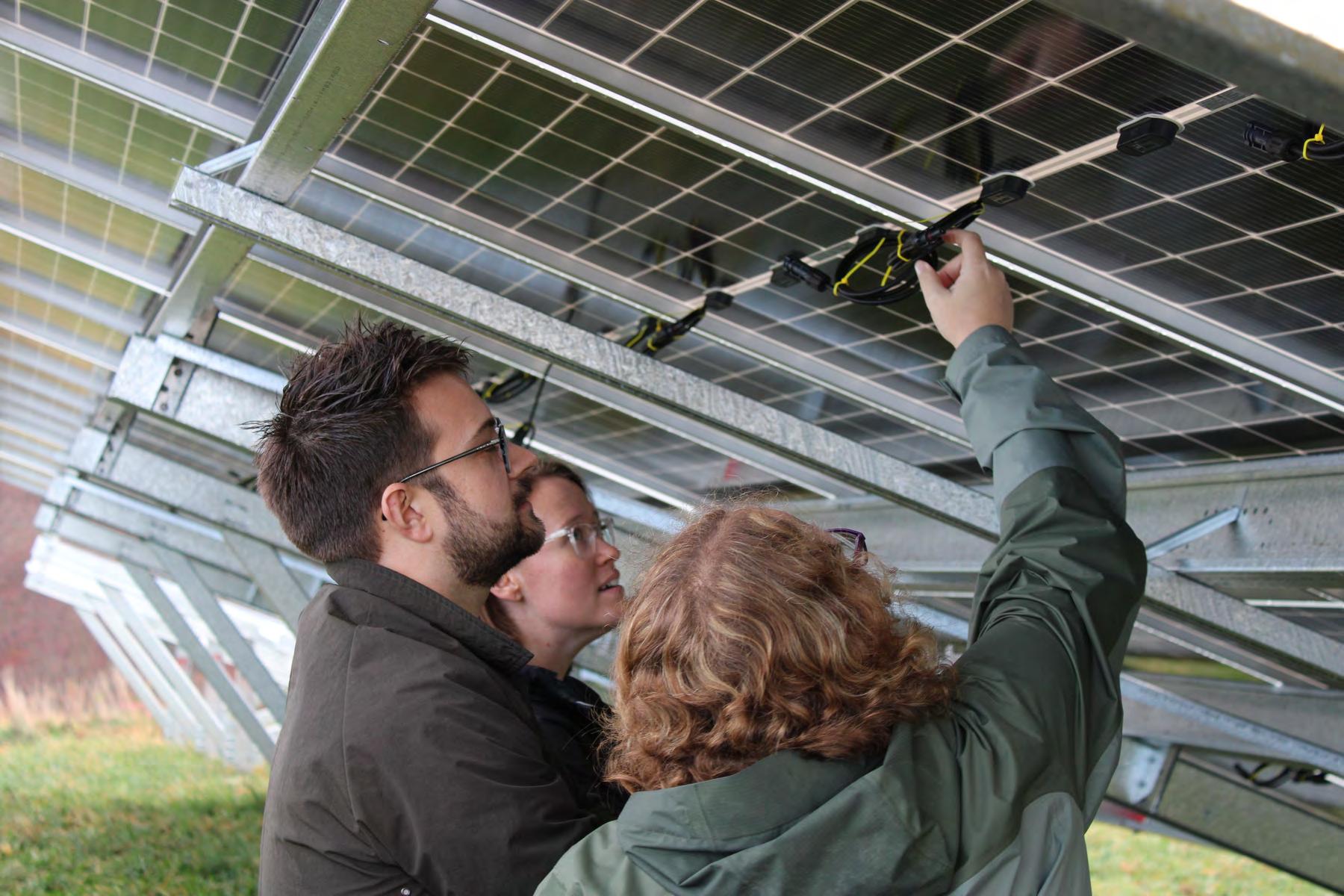
ENERGY & EMISSIONS


LANDSCAPE & ECOLOGY
TRANSPORTATION & MOBILITY

MATERIALS & RESOURCES
WATER SYSTEMS

11
LANDSCAPE & ECOLOGY
We cultivate sustainable landscapes that increase biodiversity and enrich ecosystem services, which are vital to environmental and human health and wellbeing.
2018 PITT SUSTAINABILTY PLAN GOALS
Design: Adhere to Pitt’s Sustainable Landscape Design Guidelines in all new landscape designs.

Standards: Maintain at least 75% of landscaped areas in accordance with Northeast Organic Farming Association (NOFA) Standards for Organic Land Care by 2024.
Trees: Increase tree canopy by 50% (from 2017 baseline).
Plantings: Replace 15% of lawn area with indigenous and adapted plants by 2030 (from 2017 baseline).
Where We Are: Lawn Reduction
Because decorative lawns offer little ecological benefit, are high maintenance, and offer comparatively poor stormwater management, the University has worked to replaced lawns with more sustainable plantings on both level and hillside areas across campus. Most noticeably since 2017, decorative lawns have been removed between Hillman Library and Posvar Hall, adjacent to the Petersen Sports Complex fields, above the K Parking Lot, and below the Falk Laboratory School loading dock.
Since our 2017 baseline, Pitt has converted ~0.5 acres of lawn to native plantings. Future lawn reduction opportunities are regularly evaluated as suggested in the 2021 Institutional Master Plan (IMP) and by Pitt Grounds, in balance with campus needs for open space.
To report on this category more quantitatively in the future, a cross-departmental tracking system relating to lawn reduction will be advanced in 2023.
Where We Are: Open Space & Public Realm
0.5 acres of lawn removed
Goal: Replace 15% of lawn area with native plantings
Where We Are: ~0.5 acres of lawn removed
As elucidated in the 2021 IMP, the 150-acre Pittsburgh campus includes nearly 80 acres of open space, of which 14 acres are considered “public realm” green space shared with the community. The University’s goal is to increase the amount of public realm green space 15% by 2031 while also improving existing open spaces to the public realm standard. The 2021 Bigelow Boulevard transformation is the most visible manifestation of this strategy, with a wide variety of future projects in planning and design (see below).

12
2018-22 Progress Report on Pitt Sustainability Plan
Lawn Reduction
Where We Are: Sustainable Landscapes
Newly Designed Landscapes: All new landscape designs adhere to Pitt’s Sustainable Landscape Design Guidelines, including (but not limited to) plantings, trees, green roofs, and edible, pollinator, and rain gardens.

The largest strategy is Pitt’s “Hillside Framework Plan” for transforming 68 acres of upper campus with a unified design connecting people, place, and sustainable landscapes while reforesting to improve stormwater management and hillside ecosystems; under construction now, this strategy won national recognition in 2022 from the Society for College and University Planners.
Existing Landscapes: Pitt Grounds has made a concerted effort to increase the number of perennials, native, and drought-tolerant plants for existing landscapes. Of new campus plantings since 2017, 95% are native species (including trees, shrubs, and groundcovers). In FY22, Pitt Grounds maintained ~ 75% of landscaped beds in accordance with NOFA Standards for Organic Land Care.
Organic Land Care

Goal: Maintain at least 75% of landscaped areas in accordance with NOFA Standards for Organic Land Care by 2024.
Where We Are: ~75% in FY22
Electric Equipment: In 2014, Pitt Grounds began transitioning its campus-wide equipment and vehicles from gasoline and diesel models to electric-powered options, helping reduce noise and air pollution on campus. In 9 years, Pitt Grounds has gone from 0 pieces of electric equipment to 56 (or ~25% of its handheld equipment). In 2022, Grounds added its first large area (stand on) electric mower. Additionally, the implementation of battery-powered blowers in all middle and campus zone has reduced gas-powered blower usage 92% annually.

75%
2018-22 Progress Report on Pitt Sustainability Plan 13
Where We Are: Pollinators
The University of Pittsburgh works to both protect existing pollinators and create new campus spaces where pollinator communities can grow and thrive.

Bee Campus USA Certification: The University’s Pittsburgh campus received its first Bee Campus USA designation in 2020 from the Xerces Society for Invertebrate Conservation. Bee Campus affiliates commit to supporting pollinators by establishing native plant habitats, providing nesting sites, reducing the use of pesticides, and providing educational opportunities about pollinators. This designation is renewed annually, with the University’s efforts highlighted in a Xerces’ Bee Campus USA report.
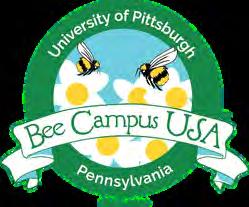
Pollinator Gardens: The University’s Pittsburgh campus is currently home to 6 gardens specifically designed for pollinators, many of which house solitary bee houses that were designed and installed in 2019 as part of a Pitt student project. Of these, 2 pollinator gardens are new since 2017, both originating from student projects: Posvar Pollinator Garden on Clemente (2021) and Posvar Relearn Our Land Garden (2022)
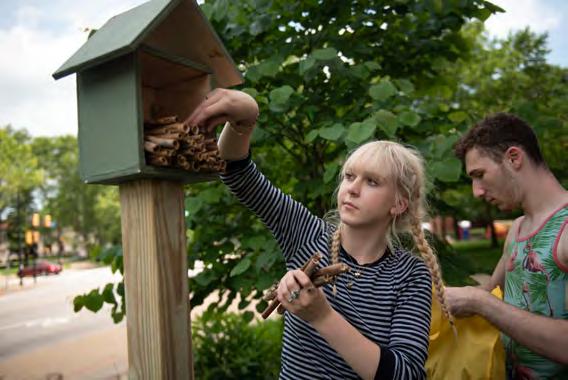
Pollinator Habitat Advisory Committee: In 2019, Pitt’s Pollinator Habitat Advisory Committee was established to help the quality of our campus environments support healthy, native pollinator populations. The Committee created and helps implement the Campus Pollinator Habitat Plan, which reflects University standards and national best practices in helping guide campus plant choices and landscaping. The Committee also oversees Pitt’s annual Bee Campus USA renewal process and works to increase campus-wide education about the importance of pollinators, including an annual celebration of Pollinator Week (view the events from 2021 and 2022 Pollinator Week).
Where We Are: Trees
Trees are integral to all University of Pittsburgh campuses, contributing beauty, stormwater management, ecosystem support, and mental health benefits.

Tree Campus Higher Education Certification: In 2021, the University’s Pittsburgh campus achieved its first national Tree Campus Higher Education designation from the Arbor Day Foundation for protecting and enhancing local tree canopy. This national certification honors universities and their leaders for fostering a tradition of excellence in tree care and education. Pitt’s Bradford campus has held a Tree Campus USA designation since 2015.
Pitt’s Johnstown campus has been a certified Audubon Cooperative Sanctuary since 2019. It was the first university campus in Pennsylvania and the 8th nationally to earn this designation.
2018-22 Progress Report on Pitt Sustainability Plan 14
Tree Canopy: A tree inventory for the University’s Pittsburgh campus was completed in 2019, documenting nearly 4,000 existing trees of diverse species and maturities that provide 29.95 acres of tree canopy coverage (or 16.8% of the 177.4-acre IMP study area). Despite losing a number of trees to age, disease, or construction, over 210 net new trees have been planted on or adjacent to the Pittsburgh campus since 2017, with full tracking on our goal to grow tree canopy in progress.
Given the urban nature of the University’s Pittsburgh campus, existing tree needs, and infrastructure, the 2019 Campus Master Plan indicated only 4% canopy growth is likely on the Pittsburgh campus over the next 10 years. As a result, the University increased focus on preserving and stewarding existing trees and their resulting canopy. Efforts to increase tree canopy both on and off the Pittsburgh campus includes supporting street trees, training Pitt Tree Tenders, and partnering with the City of Pittsburgh to identify off-campus areas for tree canopy growth.

Campus Tree Advisory Committee: In 2019, Pitt’s Campus Tree Advisory Committee was established to help to oversee the long-term preservation and expansion of the tree canopy on-campus, advance Pitt’s tree commitments, and help educate the Pitt community about the importance of trees. This diverse and interdisciplinary committee developed the Campus Tree Care Plan (2021), achieved. Tree Campus Higher Education designation for the Pittsburgh campus (2022) (Pitt is the first campus in Pittsburgh to receive this recognition), initiated annual Arbor Day educational campaigns, and supports tree-focused community partnerships.
Success Story: Pitt Tree Tenders



In 2022, Pitt began offering free Tree Tender trainings in partnership with Tree Pittsburgh, creating new opportunities for students and employees to learn tree care techniques and help maintain and grow tree canopy in Oakland and beyond. In the program’s first year alone, 78 Pitt community members became certified Tree Tenders, making them eligible to volunteer their expertise to regional community plantings and tree maintenance projects.
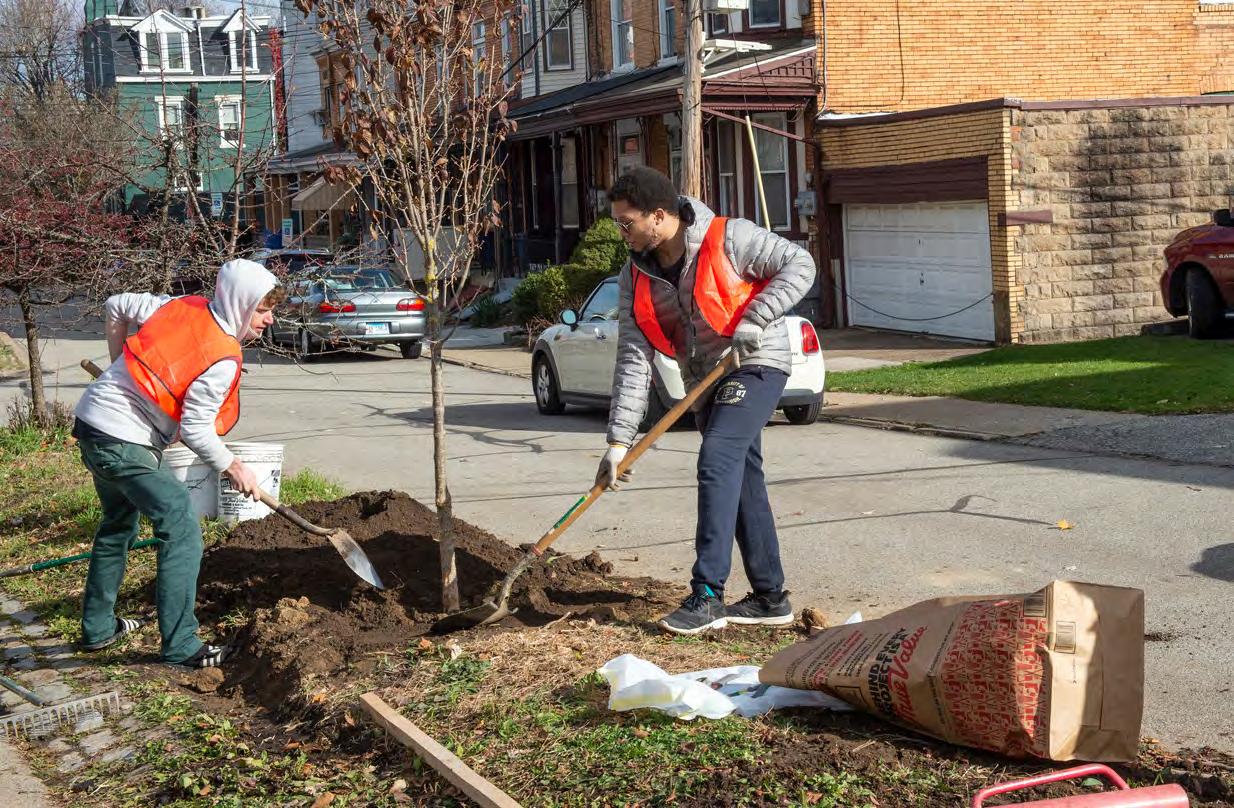
2018-22 Progress Report on Pitt Sustainability Plan 15
WATER SYSTEMS
We strive for responsible consumption of potable and nonpotable water and use best practice stormwater management and reuse on campus.
2018 PITT SUSTAINABILTY PLAN GOALS
Campus: Strive towards a water neutral campus with a 3% reduction in water use by 2020 from 2017 baselines.
Efficiency: Embrace the Pittsburgh 2030 District goal of 50% reduction in water use intensity (consumption per square foot) by 2030 (below historic district average).
Standards: Establish design standards and operational practices to achieve water use reduction goals.
Drainage: Reduce impervious surfaces 20% by 2030 (from 2017 baseline). Stormwater: Divert 25% of stormwater from remaining impervious surfaces by 2030 (to rain gardens, bioswales, or rainwater harvesting tanks).
Drink: Work with the City of Pittsburgh to ensure clean, healthy drinking water for all in our community.
Where We Are: Water Use
Campus Use: The University of Pittsburgh achieved (and surpassed) its goal to reduce water usage on campus 3% between 2017 and 2020. Pitt reduced water consumption 10.1% between FY17 and FY20, reflecting the University’s ongoing investment in several water reducing approaches, including:
Increasingwatermeteringandmonitoringtoallowforquickerreactionstowaterand steamuseaberrationsandpossiblemalfunctionsorleaks;
Investinginefficiencyprojectscampus-wide,includingattheUniversity’schilledwater plantsandattheplumbingfixturescale(whicheachreducewateruseby30%);and
PursuingLEEDbuildingcertificationsfornewbuildingsandlargecapitalprojects(which incorporateswaterefficiencyefforts).


For overall Pittsburgh campus water consumption, the University maintained an 11% reduction in FY22 compared to FY17.

Campus Water Use Reduction
Goal: 3% reduction in water use by 2020 from 2017 baselines.
Where We Are: 11% reduction for FY22 compared to FY17 baseline
ENERGY & EMISSIONS
2018-22 Progress Report on Pitt Sustainability Plan 16
Water Use Intensity: Even with a growth in University-owned building space, campus-wide water use intensity (WUI) for FY22 was down 12.9% compared to FY16 and 14.2% below the regional baseline. These reductions are slightly behind the University’s incremental targets to reach its Pittsburgh 2030 District goal; those targets are a 20% WUI reduction by 2020, 35% by 2035, and 50% by 2030. However, it is a vast improvement from FY18, when campus-wide consumption was 10.4% above baseline (meaning worse than the regional average for similar buildings)

The University has updated its plumbing design standards and includes our 50% WUI reduction targets in major capital project design requests. Pitt-selected design and construction teams are consistently evaluated regarding their predicted achievement of these goals.
Where We Are: Impervious Surface Reduction
The University’s 2021 Institutional Master Plan (IMP) reported 112 impervious acres in the IMP study area; to reach a 20% reduction of impervious surfaces by 2030 22.5 acres (975,744 square feet) would need become pervious.
Since 2017, the University has eliminated or converted at least 30,645 square feet of impervious surfaces to pervious areas, helping bring the Pittsburgh campus total to 3.1% of impervious space converted (only about 40% of the progress required to meet the 2020 incremental target in this category).
The most visible changes in this realm are the transformations of Schenley Quad, Bigelow Boulevard, and William Pitt Union (WPU) Plaza. Concrete removals around Posvar Hall also contributed (including a 2022 conversion of the Posvar amphitheater), as did a 2022 conversion of a Burrows Street property to neighborhood park.
30,645
square feet converted
Impervious Surface Reduction
Goal: 20%reductionof impervioussurfacesby2030 (22.5 acres or 975,744 sq ft)
WhereWeAre: 3.1%ofimpervioussurface converted
2018-22 Progress Report on Pitt Sustainability Plan
17
Green Roofs: Pitt’s 9 green roofs across the Pittsburgh campus also contribute to on-campus porosity. The only new green roof since 2017 is Schenley Quad (partial green roof, included above). The existing green roof on Forbes Hall is also being reconstructed in the near future. New green roofs are expected across campus over the next several years, including on the Campus Recreation & Wellness Center and Arena & Sports Performance Center—both of which were envisioned in the 2019 Campus Master Plan. These new green roofs will provide 135,750 square feet of pervious area by 2026.


Where We Are: Green Stormwater Infrastructure

To reach toward the goal of diverting 25% of stormwater from impervious surfaces by 2030, the University is using both green and gray stormwater infrastructure solutions. Green stormwater infrastructure includes nature-based solutions (i.e., rain gardens, green roofs, and bioswales) to capture and store rainwater. Increasing tree canopy and green spaces around campus also helps manage rainwater and reduce flooding. Gray stormwater infrastructure is typically underground and focuses on rainwater retention and/or reuse. Both approaches are required to help lessen the regional combined sewer overflow burden (which includes a City of Pittsburgh consent decree with the U.S. EPA).
RainGardens:Pitt’sraingardensdetainandabsorbexcess rainwater,enablingittonaturallyinfiltrateintoandnourishthesoil, whilehelpingmitigatePittsburgh’scombinedseweroverflow challenges.Twooftheseraingardensarenewsince2017,bringing thetotalraingardensoncampusto9:
BigelowBioswales—Thisseriesofraingardenswasaddedin 2020.Inadditiontohandling5,150cubicfeetofstormwater,the bioswalesincreasesafetybydirectpedestrianstothenew raisedcrosswalk.
SutherlandHallRainGardens—Expandedtoinclude2rain gardensin2020.
AnewraingardenadjacenttothenewScaifeHalladditionwillalso comeonlinein2023.
2018-22 Progress Report on Pitt Sustainability Plan
18
Built in 2020, these rain gardens manage up to 5,150 cubic feet of stormwater.
Bigelow Bioswales
Success Story: U.S. EPA RainWorks Challenge





In Spring 2021, a Pitt student group dubbed PreciPITTation earned second place in the U.S. Environmental Protection Agency’s (EPA) 9th annual Campus RainWorks Challenge. The project utilized multiple green infrastructure practices to create a master plan design focusing on eliminating combined sewer overflows while creating safe, multifunctional spaces accessible to the Pitt campus and greater Pittsburgh communities.


Rainwater Reuse: Given the urban nature of our Pittsburgh campus, only so many above ground rainwater management solutions are possible. As a result, the U large underground, interconnected cross-campus rainwater captur Currently in various stages of design and construction, the system will allow Pitt to capture and reuse treated rainwater for processes in Pitt’s central utility plants.
The first step of Pitt’s multi-phase rainwater reuse network included piping under Bigelow Boulevard (2020). The next phase will be linking existing stormwater collection to the University’s new Upper Campus Chilled Water Plant (2022). Follow-on phases will include distributed underground rainwater collection tanks and piping that will connect Pitt’s rainwater reuse network across campus.

2018-22 Progress Report on Pitt Sustainability Plan 19
Where We Are: Drinking Water
When the Pitt Sustainability Plan was drafted in 2017, the governance and state of Pittsburgh’s drinking water was in a very different place. However, in the last 5 years, Pittsburgh Water and Sewer Authority’s (PWSA) focus on providing cleaner drinking water has been nationally recognized, including concentration on replacing all lead service lines city-wide by 2026. Oncampus, the University of Pittsburgh also regularly tests drinking water to verify water quality.
Equitable access to clean drinking water is the subject of forthcoming research from the Water Collaboratory on drinking water equity. The Collaboratory was awarded a 2021 Pitt Momentum Funds Teaming Grant to establish a transdisciplinary team to advance regional water equity.


Where We Are: Water Research
As Southwestern Pennsylvania continues to evolve from its industrial past, a complex set of water challenges impact the region's economy, ecology, and public health.
Pittsburgh Collaboratory for Water Research,

Education, and
Outreach:
Founded in 2017, the Water Collaboratory aspires to elevate water resource sustainability and resilience through research collaborations, communicating knowledge, and innovating solutions. The Collaboratory has received external operational funding since 2018 and has conducted extensive outreach to gauge regional research needs with respect to water quality, green infrastructure, and flooding. In 2019 and 2020, the Collaboratory published 3 community consensus reports documenting input from over 200 participants and set the stage for the University of Pittsburgh to become a major force in advancing environmental and economic sustainability in the region.
Since its inception, the Collaboratory has diligently worked to expand its presence in the Upper Ohio River Basin water community, identifying over 125 regional water organizations for potential collaborations. Across Pitt, the Collaboratory has over 35 faculty affiliates from diverse disciplines, who help elevate water resource sustainability and resilience by fostering research collaborations, communicating knowledge, innovating solutions, and improving the health of the Upper Ohio River basin. The Collaboratory is actively working on uniting faculty, students, and community partners within research initiatives focusing on drinking water equity, ecological modeling, landslides, water quality monitoring, and public health.
2018-22 Progress Report on Pitt Sustainability Plan 20
ENERGY & EMISSIONS
To combat the global climate emergency, we are working to dramatically reduce energy consumption and greenhouse gas emissions while addressing the dangers that climate change presents for our mission, community, and the world.
2018 PITT SUSTAINABILTY PLAN GOALS
Carbon: Reach carbon neutrality by 2037 for the Pittsburgh campus, with an incremental goal of reducing greenhouse emissions 50% by 2030 (from our 2008 baseline).
Efficiency: Produce or procure 50% of the University’s electricity from renewable resources by 2030 and 100% by 2037.

Standards: Embrace Pittsburgh 2030 District goals of 50% reductions in energy use intensity (consumption per square foot) by 2030 (below 2003 national median baseline).
Renewables: Establish design standards and operational practices to achieve energy use reduction goals.
Where We Are: Carbon Emissions
Greenhouse Gas Emissions: The University of Pittsburgh’s greenhouse gas (GHG) emissions have been decreasing since our 2008 baseline year, and we remain on track to reduce GHG emissions 50% by 2030 and achieve carbon neutrality by 2037. Pitt’s fiscal year (FY) 2019 GHG inventory showed Pittsburgh campus GHG emissions were down 21.2% from the FY08 baseline. The FY20 and FY21 GHG inventories reflect additional (albeit pandemic-influenced) reductions.

Pitt completes an annual GHG inventory for the Pittsburgh campus using international and national protocols and best practices. Data and results are validated by cross-departmental stakeholders and reviewed by the Carbon Commitment Committee. GHG baselines for the regional campuses in Bradford, Greensburg, and Johnstown were initiated in 2022.
Goal: 50% reduction in GHG emissions by 2030 & carbon neutral by 2037
Where We Are: 39.2% below baseline for FY21, pandemic influenced
ENERGY
39.2%
& EMISSIONS
Greenhouse Gas Emissions Reduction
2018-22 Progress Report on Pitt Sustainability Plan 21
Governance: In April 2020, the Chancellor’s Advisory Council on Sustainability created a Carbon Commitment Committee (CCC) to hone, design, and manage the University’s plan to achieve its carbon neutrality goal by 2037 while annually evaluating progress. The CCC’s goals include creating and updating the Pitt Climate Action Plan, annually evaluating progress towards carbon neutrality, submitting progress evaluations, and sharing progress.
Where We Are: Energy Use
Building Energy Use: Pitt’s building energy use intensity has decreased consistently since 2014, in line with the University’s goal to reduce energy use intensity 50% by 2030 in existing buildings. For fiscal year 2022, Pitt was 27.8% below its campus-wide baseline. In FY20 and FY21 the Pittsburgh campus celebrated its lowest energy use intensity since 2008.

27.8% below baseline
Building Energy Use
Goal: 50% reduction in building energy use intensity by 2030
Where We Are: 27.8% below baseline in CY21
Pitt is committed to achieving "carbon neutral ready" new construction by 2030: this means every new capital project starts by aspiring towards 2030 Challenge-set site energy use intensity goals that are 80% below national baselines.
The University includes energy use intensity (EUI) performance targets in requests for major capital projects (e.g., Campus Recreation & Wellness Center, Hillman Library renovations, etc.). Project teams are consistently evaluated throughout the design & construction process to ensure achievement of these goals.
Case Study: Clockworks Continuous Commissioning
Pitt Facilities utilizes a sophisticated building automation system and special fault detection system software (Clockworks Analytics) that continuously identifies and prioritizes potential issues 24/7 in 1/3 of the 7.5 million square feet monitored by the University’s Energy Center. In 2022, Pitt was recognized by Clockworks for completing more energy saving tasks that year than any other Clockworks user: using this system, the University has saved over $1 million in 4 years.

2018-22 Progress Report on Pitt Sustainability Plan 22
Certified Green Buildings: All large University new construction and major renovation projects pursue third-party LEED green building certification, reflecting building energy efficiency, performance, and renewables alongside many other sustainable building strategies. In early 2021, Pitt celebrated reaching the milestone of 1.2 million square feet of LEED certified space across all-campuses, with over 2.2 million square feet in design, construction, or awaiting certification.
Where We Are: Renewables
Renewable Electricity



Pitt is committed to producing or procuring 50% of its electricity from renewable sources by 2030 and 100% by 2037. In calendar year 2021, 16.5% of Pitt’s electricity was attributed to renewables, down from a pre-pandemic high of 23% in FY19. The CY21 achievement meets the University’s incremental target and keeps Pitt on track to reach its 2030 and 2037 renewables goals.


Goal: 50% of electricity from renewable sources by 2030 & 100% by 2037
Where We Are: 16.5% in FY21

Reaching our goals requires a combination of solutions, including on-site renewables, purchased renewables, long-term power purchase agreements, and renewable energy certificates. Rooftop solar panels have been installed on both the Pittsburgh and Bradford campuses (dating back to 2012 and 2014, respectively). Since 2018, the University has installed rooftop solar on its leased space in the Energy Innovation Center (~50 kW in 2020) and the George B. Duke Engineering and Information Technologies Building (223.4 kW in 2022, expected to produce ~116.5 megawatt hours of electricity annually).
Success Story: Rooftop Solar
Constructed in 2022, Pitt Bradford's new George P. Duke Engineering & IT Building is pursuing LEED Gold certification and features Pitt's largest rooftop solar array to date. Once operational, it will produce ~116,500 kWh annually, avoiding over $10,000 in electricity costs per year.

16.5% 2018-22 Progress Report on Pitt Sustainability Plan
Power Purchase Agreements: In 2018 and 2020, the University announced agreements to purchase renewable electricity from two future facilities that will provide ~42% of Pitt’s future electricity from local renewables. These 2 commitments keep the University on track to reach its strategic renewables goal. Coming online in 2023 is a 20-megawatt solar power facility just 25 miles from the Pittsburgh campus. Announced first in 2018, a local, run-of-theriver hydropower facility fewer than 5 miles from campus on the Allegheny River will provide 25% of Pitt’s future electrical needs.
In 2019, Pitt became a part of the U.S. Environmental Protection Agency Green Power Partnership, joining other universities, businesses, and organizations working to reduce the environmental impacts associated with conventional electricity use.



In 2020, Pitt was ranked #30 on the U.S. EPA’s Top Green Powered Universities list.
Next Steps
Pittwillcontinuetocompleteenergyefficiency projectsincampusbuildingsandisadvancing renewableprojectson-campusandoff:
2023—RooftopSolaron4existingPittsburgh campusbuildings
2023—VesperGauchoSolarfacilitybecomes operational
Future—RyeDevelopmentrun-of-the-river hydropowerfacilityoperational

2018-22 Progress Report on Pitt Sustainability Plan 24
TRANSPORATION & MOBILITY
We strive for convenient multi-modal access to and through our campuses, prioritizing low carbon connections via active, shared, and low carbon mobility that promotes the health and safety of individuals, our community, and the environment.
2018 PITT SUSTAINABILTY PLAN GOALS
Fleet: Employ Pittsburgh 2030 District goal of 50% reduction in greenhouse gas emissions for direct transportation by 2030 (below 2017 baseline).
Shuttles: Reduce Pitt Shuttle fuel usage 3% annually between FY18 and FY30.
Commuting: Embrace Pittsburgh 2030 District goal of 50% reduction in greenhouse gas emissions from commuter travel by 2030 (below the 2013 Oakland neighborhood baseline).
Carpool: Increase active Pitt registered carpools 2% annually between FY18 and FY30.
Vanpool: Add 1 new vanpool annually between FY18 and FY30.
Biking: Achieve Silver Bicycle Friendly University status from the League of American Bicyclists by FY20 and Gold in FY25.

Where We Are: Lower Carbon Pitt Fleet
Electric Fleet Vehicles: In September 2020, the University of Pittsburgh expanded its partnership with Enterprise, shifting the University’s 268 fleet vehicles to leases. The expanded partnership puts Pitt on a path to more hybrid and electric vehicles in the future, including pickup trucks, box trucks, cargo vans, and passenger vans. As of July 2022, the University had 13 electric vehicles, including 3 utility vehicles (2 Athletics & 1 Pitt Eats), 1 Nissan Leaf (Parking), and 9 electric bikes (8 for Pitt Police & 1 cargo for Sustainability).
In FY20 & 21, Pitt leased 4 Mitsubishi Fuso electric box trucks that were very visibly used across campus by Logistics. Mitsubishi exited the vehicle leasing market in FY22, so those trucks are no longer part of Pitt’s fleet.
The Pitt Climate Action Plan acknowledged the University’s intention to fully electrify its vehicle fleet over time, including shuttles.

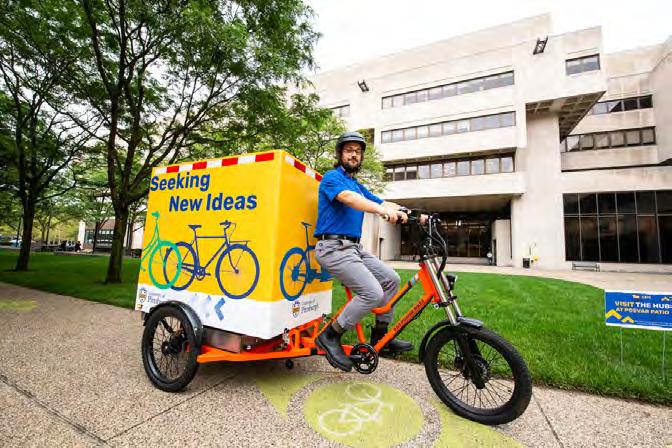
25
2018-22 Progress Report on Pitt Sustainability Plan
Pitt Shuttle Fuel Switching: In July 2020, 18 of the University’s 20 shuttles shifted to propane, helping reduce shuttle carbon emissions by 33% and localized nitrogen oxide emissions by ~20% (compared to previous shuttles, which utilized gasoline or 5% biodiesel).
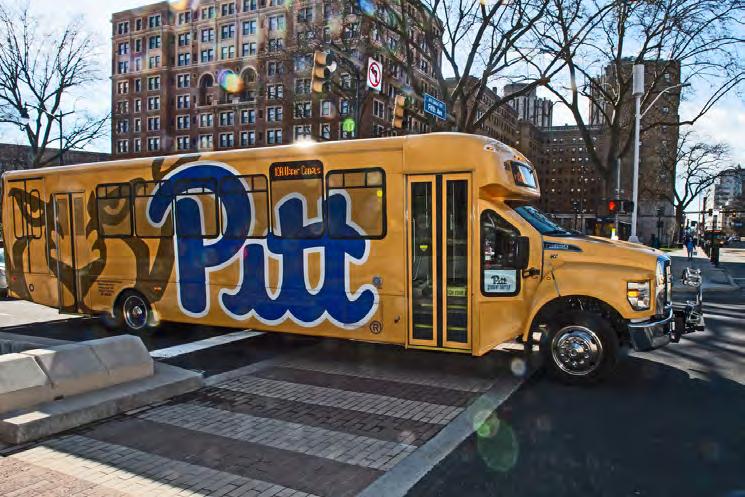
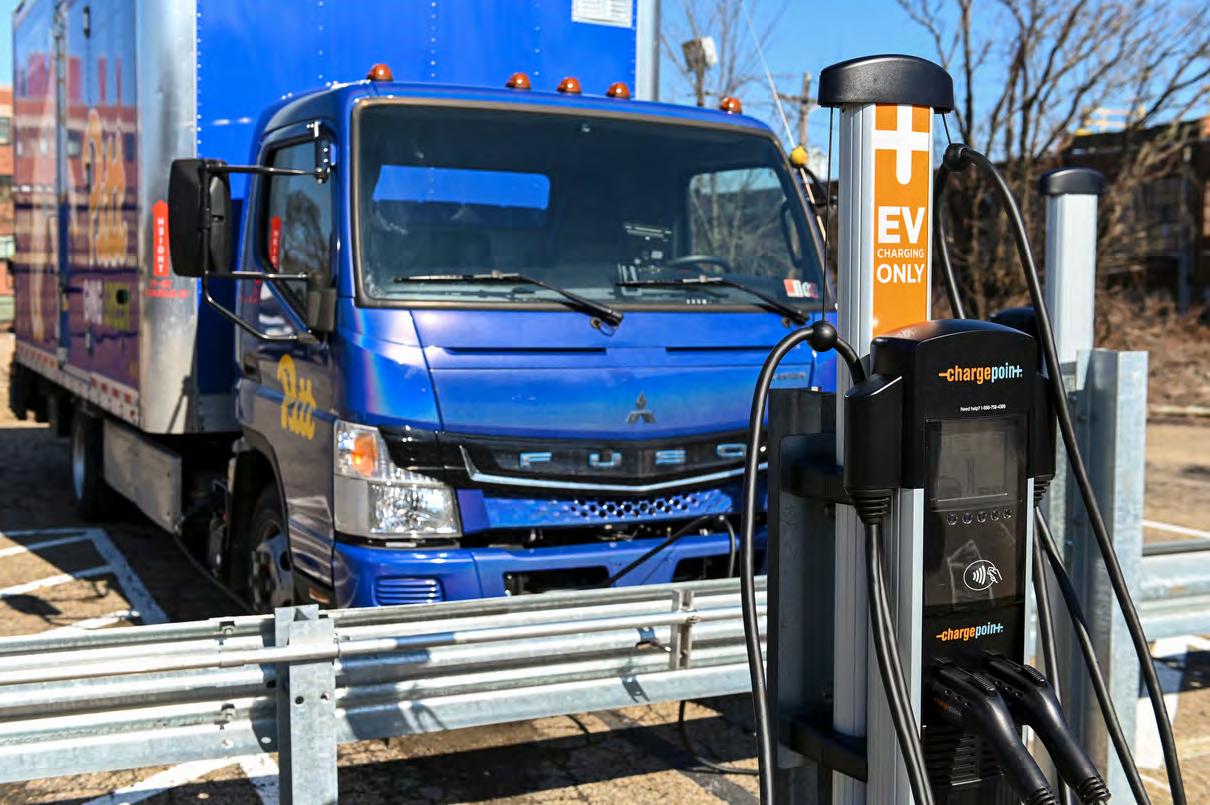
Where We Are: Commuting Greenhouse Gas Emissions
Commuting Emissions: The University of Pittsburgh’s FY21 GHG inventory reported a 54% reduction in GHG emissions below our FY08 baseline year, an outlier reduction not anticipated to be durable post-pandemic. Commuting has traditionally been Pitt’s 3rd largest GHG emissions contributor, but for FY21, GHG emissions from commuting were 66% lower than FY20 (by 17,048 MT CO2e). This significant drop is attributed to the global COVID-19 pandemic response, which created a virtual learning and working experience for most Pitt students and employees in FY21 (thus significantly reducing the number of commutes, which have rebounded to some extent in FY22 and FY23).
In Fall 2022, the 2022 Pitt Commuter Survey gathered over 6,000 individual responses. While responses are still being analyzed, clear trends between 2018 and 2022 include a marked increase in formalized staff flex work arrangements (which help maintain avoided daily commutes when employees work from home). Full survey responses will provide postpandemic insights into Pitt commuter decision-making, strategically guide the University’s mobility strategies, and fulfill local reporting commitments.
Electric Vehicle Charging: The University of Pittsburgh was an early electric vehicle (EV) charging leader, adding 16 EV chargers in 2012. More recently, the University dramatically expanded its EV charging capacity for commuters and fleet vehicles, reaching 80 total EV plugs in FY22. Pitt community members can access these EV chargers with a Pitt EV parking permit – and vehicles charged on-campus benefit from the University’s renewable electricity production and procurement.
EV chargers are also coming online soon at Pitt’s Bradford and Greensburg campuses.
2018-22 Progress Report on Pitt Sustainability Plan 26
Where We Are: Shared Mobility
Because the University’s Pittsburgh campus is located in the third largest business district in the Commonwealth of Pennsylvania, both our urban scale and density compel us to prioritize active, shared, and low carbon mobility choices for traveling to, from, and around campus.
Free Pittsburgh Regional Transit: Pre-pandemic in FY19, Pitt riders took over 5.8 million rides on Pittsburgh transit annually. The University of Pittsburgh has offered free Pittsburgh Regional Transit (PRT) rides since 1996 and in 2021 the University reaffirmed the partnership with a multi-year agreement, ensuring Pitt students and employees can continue to avoid driving via free shared transit commutes on PRT buses, light rail, and inclines.
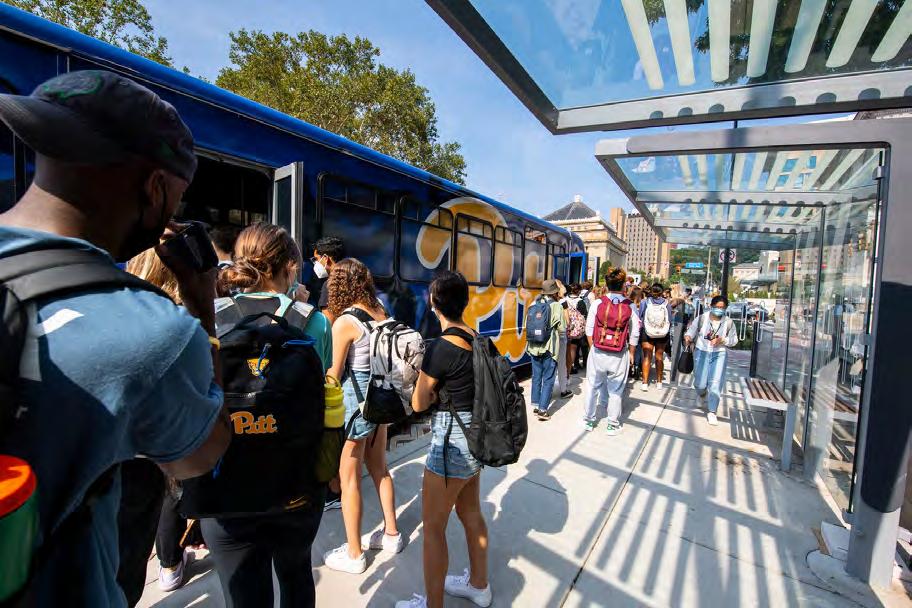
Carpools: Pitt’s 2018 carpooling goal was to increase Pitt-registered and active carpools 2% annually between FY18 and FY30. While carpools destined for Pitt are obviously more numerous, the University had only 157 registered carpools in FY18. In FY21, Pitt had 167 registered carpools, representing an 8.4% growth between 2018 and 2021 (meeting the annual 2% growth goal). However, in FY22, registered carpools dropped to 116, which is below the FY18 baseline.

Despite technically being behind pace on tracked carpool growth, the University of Pittsburgh remains committed to maintaining existing carpooling services through our CommuteInfo partnership, as well as offering Pitt-sponsored benefits to parking permit holders who share a ride and register with Pitt Mobility. Through these efforts, we hope to go beyond the 2018 Pitt Sustainability Plan goal of 2% annual carpool growth (e.g. 195 registered carpools by 2030), by better serving carpools that drop off riders at Pitt on their way to other final destinations.
Vanpools: The University of Pittsburgh has lost ground on its Pitt Sustainability Plan vanpool goal, which was to add 1 new vanpool annually between FY18 and FY30. In FY18, Pitt had 7 vanpools, which it sustained through FY20 in partnership with CommuteInfo. As of December 2022, the University only has 3 vanpools, falling far behind its goal of 12 by FY23. The University remains committed to reestablishing its vanpool program in concert with CommuteInfo and Commute with Enterprise, who introduced smaller vanpool vehicles in 2021. Additionally, 2022 Pitt Commuter Survey results will be invaluable in determining the application of vanpools for post-pandemic commutes and work schedules.
2018-22 Progress Report on Pitt Sustainability Plan 27
Where We Are: Active Mobility
Pitt is committed to deprioritizing vehicle traffic and enhancing and increasing safe and accessible pedestrian and biking routes across and to campus.
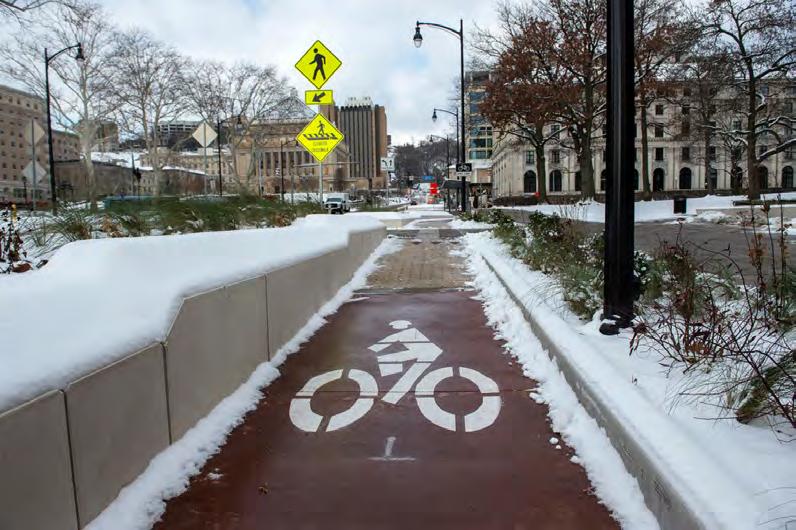
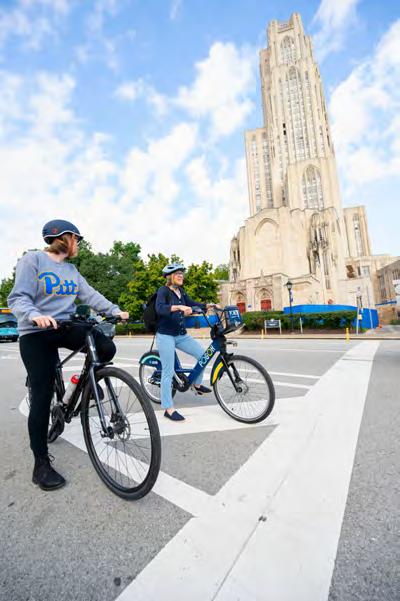

Walking: In addition to providing health benefits through physical activity, walking to class, work, and around Pitt’s urban campus is an important commuting mode. The 2021 Institutional Master Plan (IMP) reported that 5.2% of Pitt employees walked to campus in 2019 – and committed the University to maintaining at least 5.2% of employees as walkers through 2029. Combined with the 7,900 students living on-campus, by 2035 over 8,375 individuals could commute to campus by walking.
To further encourage and support walking, the University created the first “Walking” page on the Pitt Mobility website in 2021, helping highlight the benefits of walking and offering walking safety resources.
Bike Friendly Campus: In 2021, the University of Pittsburgh was honored with a Silver Bicycle Friendly University (BFU) award by the League of American Bicyclists (up from Bronze in 2018). This designation recognizes the University’s achievements in promoting and enabling safe, accessible bicycling on campus – and keeps us on track to achieve Gold by 2025.

Bike Friendly Campus
Goal: Achieve Silver Bicycle Friendly University status from the League of American Bicyclists by FY20 and Gold in FY25.
Where We Are: Silver Bike Friendly University Awarded in 2021. On track for Gold BFU in 2025.

2018-22 Progress Report on Pitt Sustainability Plan 28
Biking Infrastructure & Amenities: Pitt continues to make biking more accessible on campus with various strategies. Previously a stand-alone map, the Pitt Campus Bike Amenities Map was official folded into the Pittsburgh campus map in 2020. The University’s Pittsburgh campus currently boasts 450 bike racks, which offer 1,508 bike parking spaces via indoor, outdoor, and/or covered racks; bike lockers; and bike storage rooms (in select residence halls and the Murdoch Building).
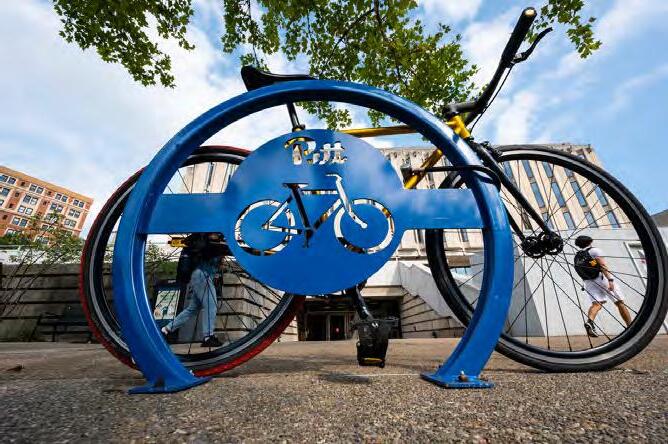

Regional transportation organizations regularly benchmark pedestrian and bike traffic at various campus locations: in Fall 2022, bike counters indicated that ~450 bikes travel through Posvar Passage every weekday (i.e. between Posvar Hall and Hillman Library).
In 2018, bike lanes were added on Forbes Avenue from Bigelow Boulevard to South Craig Street. In 2020, the Bigelow Boulevard transformation added separated bike lanes to this important pathway for bikes, pedestrians, and motor vehicles (which is Pitt’s first Complete Street).

2018-22 Progress Report on Pitt Sustainability Plan 29
Success Story: Pitt Bike Cave




Established in 2017, the Pitt Bike Cave is a student-run bicycle maintenance & teaching shop open to anyone interested in biking. The concept won Pitt’s 2017 Sustainable Solutions competition and since 2017, the Pitt Bike Cave has helped hundreds of visitors every semester with expertise about biking and bike repair. The Pitt community and public can use the Bike Cave service to access bike repairs, safety, and educational materials; participate in workshops; and gather as a community -- all free of charge.

POGOH Bike Share: In Fall 2020, Pitt began offering all full-time Pitt students and employees free, unlimited 30-minute rides on POGOH, Pittsburgh’s bike sharing system (previously named “Healthy Ride”). The University first piloted its bike share benefit in FY20 for first-year students only (an opportunity cut short by the pandemic in Spring 2020).

Pitt community members have embraced the partnership, tallying 56,230 rides from August 2019 through October 2022. In FY22 alone, Pitt community members took 25,643 POGOH bike share rides.
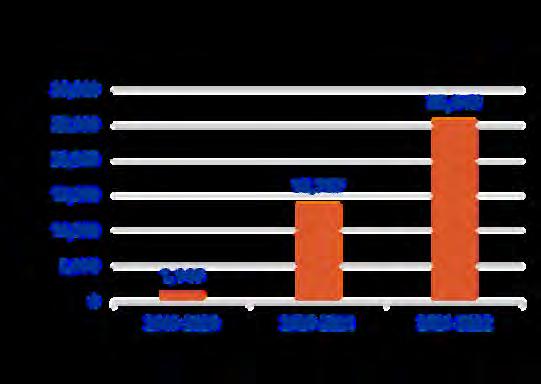
2018-22 Progress Report on Pitt Sustainability Plan 30
MATERIALS & WASTE
We strive for sustainable consumption and diversion practices by considering sourcing, usage, durability, and end-of-life at the time of purchase.
2018 PITT SUSTAINABILTY PLAN GOALS
Purchase: Establish procedures, policies, practices, and educational tools to reduce the quantity and environmental impact of materials entering and exiting the University.
Building Materials: Use healthy products for our built environment in accordance with future Pitt Green Building Standards.
Landfill: Reduce landfill waste 25% by 2030 from 2017 levels.

Compost: Expand the food waste composting program to compost 50% of food waste by 2025.
Where We Are: Sustainable Purchasing
The University of Pittsburgh aims to both integrate the tenets of sustainability into Universitywide procurement policies and guidelines, and put into place the support mechanisms for these efforts to proliferate via departmental procurement practices.
Sustainable Contracted Suppliers: Pitt’s contracted suppliers andpurchasing processes are set up to help campus purchasers choose more sustainable itemsfrom more diverse and local companies, while still getting the best price and adhering to the University’s financial requirements. Pitt’s procurement teams work with every contracted supplier to help ensure offerings are sustainable and suppliers diverse. Contracted suppliers provide clear environmental impact information for the life cycle of their products and services – and are easily searchable online by whether or not they offer “green” options.
Additionally, the Pitt Employee Green Guide web page has a dedicated purchasing section that was expanded in 2020, helping consolidate campus-wide resources on materials reuse, sourcing, and sustainability considerations.
Though the University’s campus-wide office supply contract was consolidated in 2014, new sustainability initiatives and offerings since 2017 have continued via the University’s partnership with SUPRA and ODP Business Solutions (formerly Office Depot). Examples include K-cup recycling, a regular “Business Solutions Sustainability Show,” and the Green Tote reusable desktop delivery program (launched in 2022).
The University’s diverse and local purchasing goals and achievements are detailed in the “Equity & Access” section. Pitt exceeded its historic goal of purchasing 10% of non-construction goods and services from diverse businesses in 2022. A new more ambitious goal has since been set, striving for diverse non-construction procurement by 2025. In addition, the University deeply analyzed local spending and established a goal to purchase at least 25% of non-construction goods and services from Allegheny County businesses by 2025.
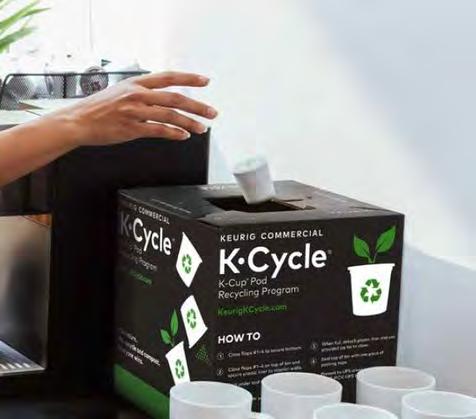
31
2018-22 Progress Report on Pitt Sustainability Plan
Strategic Sourcing: Since 2017, sustainability has been expanded within and strategically infused into and a number of supplier contracts, including:
Food Services: Pitt Sustainability Plan goals are embedded into this 10-year Pitt contract, inked in 2020 with Chartwells (referred to as Pitt Eats). Partnerships and key performance indicators focus on the Real Food Challenge, Cool Food Pledge, to-go reusables, and waste reduction.
Hazardous Waste: Pitt’s Environmental Healthy, & Safety department has been focused on environmentally friendly waste treatment methods for over 15 years, including striving each year towards increasing the amount of chemical waste that is recycled, re-used or re-purposed. In 2020, Pitt updated its hazardous waste management contract with Veolia to increase the focus on lessening the impact of proper chemical waste disposal on the environment; as a result, in 2022, 70% of Pitt’s chemical waste was processed via waste to energy, fuels blending, or other sustainable options.
Janitorial Products: Clarified and embedded green cleaning product requirements and tracking in Universitywide procurement.
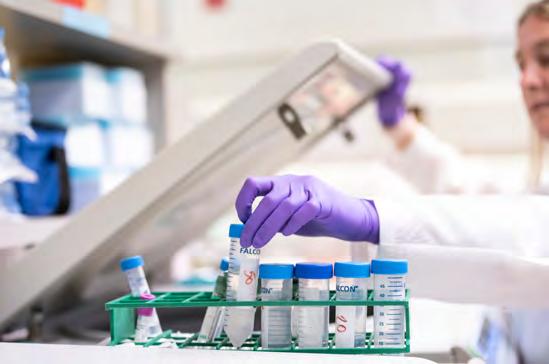
Managed Print: In 2022-23, the University put its managed print services contract out for bid, with the intention of optimizing campus-wide standalone printers and multifunction devices, while ensuring consistent service. Under final contract negotiations in early 2023, additional outcomes will help reduce the overall volume on-campus printing by reducing overall consumption, decreasing resource use, and further reducing carbon impacts in this category.
Pouring Rights: Contracted to offer healthy drink options on campus, while supporting campus-wide transition to more sustainable packaging options and reducing vending machine energy use.

Scientific Supplies: Updated in January 2023, Pitt’s third-largest contract (for scientific supplies) is held by Fisher Scientific, which supports laboratory sustainability through dedicated project funding focused on diverting polystyrene and hard plastics from landfills and circular economy solutions. The new Fisher Scientific contract also includes support for sustainability research, internships, and education.
Since 2017, contracts for endpoint computing, IT peripherals, and medical supplies have also been adapted to embed sustainability language. In 2022, the University’s online travel booking tool, Concur, started helping travelers embed sustainability into travel decisions by providing carbon emissions information for flights and offering information on rail alternatives.
2018-22 Progress Report on Pitt Sustainability Plan 32
Where We Are: Healthy Building Materials
Pitt’s design guidelines for architectural, engineering, and construction professionals address many important indoor health and materials considerations, especially through Division C: Architectural Design Guidelines for Sustainability, Products and Materials, which was updated in November 2019 with holistic practices in mind and is utilized on all University projects managed by Design & Facilities.
Healthy Materials: In addition to Pitt’s design guidelines, LEED and other third-party green building rating systems are used to incorporate consideration of healthy indoor environments through both materials selection and consideration of indoor environmental quality.
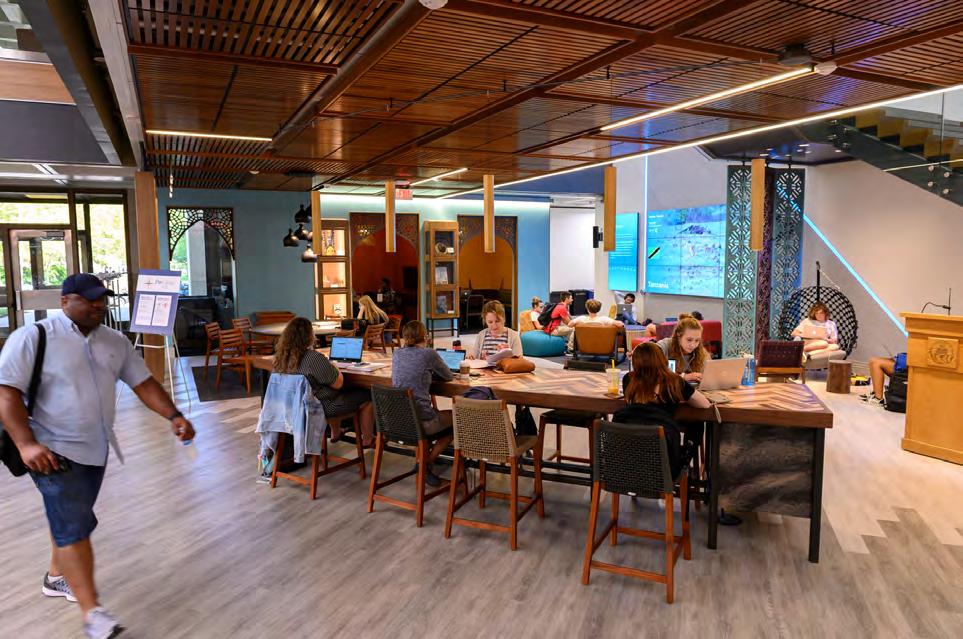
Healthy and sustainable material considerations incorporated into Pitt spaces include material and product content, type, and sourcing; reduction of heavy metals in building materials; and overall life cycle impact reduction (i.e., embodied carbon). Indoor environmental quality considerations include (but are not limited to) indoor and outdoor air quality; low-emitting materials; thermal, acoustic, and lighting comfort; and access to daylight and aesthetic views. Indoor air quality is addressed in the “Health & Wellness” section.
Where We Are: Materials Education
Campus-wide Materials Diversion Signage: In 2019, multiple Pitt departments collaborated to update University-wide waste and materials diversion signage as part of a concerted effort to encourage waste reduction across the campus. Work to install this signage campus-wide is still in progress; it is publicly available online for download and use across campus.



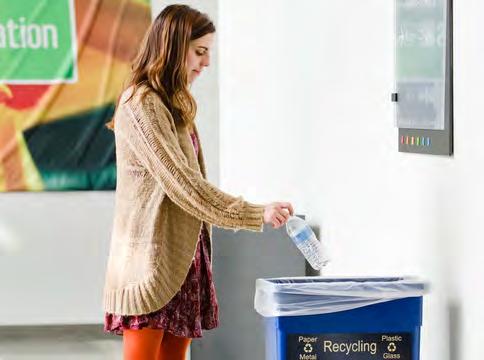
2018-22 Progress Report on Pitt Sustainability Plan 33
Race to Zero Waste (formerly Recyclemania): Starting in 2010, the University of Pittsburgh has annually participated in the national Campus Race to Zero Waste competition, which includes campus-wide education about zero waste and recycling programs, alongside materials diversion tracking. Notable achievements from 2018 through 2020 include:

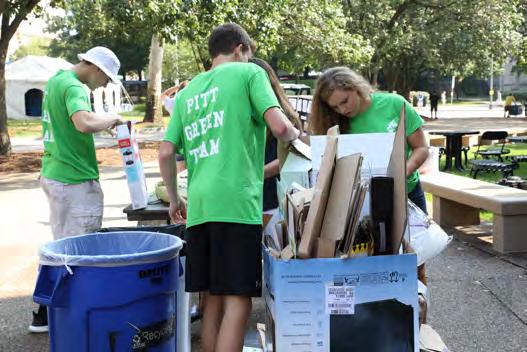
2018 Over the 8-week competition, Pitt diverted 45.5% of materials from landfill at a rate of 25.6 pounds per capita. The “Game Day Challenge” basketball game diverted 46.7% of all materials from landfill, ranking Pitt #7 among competitors in this category.
2019 Pitt diverted 38% of materials from landfill at a rate of 19.8 pounds per capita. The “Game Day Challenge” basketball game diverted 18.3% of all materials from landfill from a game attended by 10,289 people.
2020 Recyclemania was truncated due to the pandemic, but Pitt maintained a 38.5% campus-wide diversion level, but was #25 overall in the per capita category at 14.8 pounds per person.
2021-22 Due to the pandemic, Pitt did not publicly log materials diversion, but provided copious virtual educational and engagement opportunities in 2021 and a mix of in-person and virtual events in 2022

2022 Pitt menstrual health equity case study won 1st place in case study competition, “Education and Awareness” category.
Where We Are: Culture of Reuse
While the 2018 Pitt Sustainability Plan goals address reducing landfill waste and expanding food waste composting, materials reduction and diversion at Pitt is a much broader effort.
Approaching the campus and global materials challenge with a variety of zero waste strategies is important, including ways to: Rethink, Refuse, Reduce, Repair, Reuse, and Recycle materials. Several “refuse” strategies with BYO bags and togo containers are included in the “Food Systems” section. Examples of “rethinking,” “repairing,” and “reusing” efforts are below.
Surplus: Established in 1980, the University of Pittsburgh’s Surplus Property operation has collected used items from departments across the University to facilitate the resale or donating of items to other departments, local organizations, and the public. From 2018 through 2022, Surplus helped divert thousands of items from the landfill (including office furniture, lab equipment, musical instruments, computers, and even vehicles); during this time period, Pitt Surplus recycled over 246 tons of scrap metal.
2018-22 Progress Report on Pitt Sustainability Plan 34
University of Thriftsburgh: The University of Thriftsburgh is a student-founded and -operated thrift store on campus open to the Pitt community and public to buy and donate secondhand clothing and accessories. Thriftsburgh officially opened its doors in March 2015 and has been growing since, helping to reduce textile waste, cut carbon, and promote a culture of reuse. In Fall 2022, Thriftsburgh had over 600 separate transactions, each helping materials find their next, best life. Thriftsburgh’s annual return to campus Reuse Rummage sale is included in the “Health & Well-being” section.
Clutter For a Cause: Since 2016, Pitt has hosted a zero-waste move-out process with Clutter for a Cause. The multi-day event collects clothing, textiles, dorm room essentials, electronics, and non-perishable food items from both on- and off-campus locations at the end of the academic year in May and June. Led by the cross-departmental sustainability team with many partners, Clutter for a Cause helped keep 44,443 pounds of materials out of the landfill from 2018 to 2022. In Spring 2022, Clutter for a Cause collected a record breaking 21,689 pounds of materials (over 10 tons) during student move-out that may have otherwise gone to landfills.


Clean & Swap: Held for the first time in 2020 and repeated in 2022, Pitt’s Clean & Swap program is an opportunity for employees and departments to de-clutter their workspaces by donating unwanted items to be reused within the University or donated to local nonprofits. The inaugural event in 2020 collected 728 pounds of unwanted office items. In 2022, over 3,155 pounds of office and medical supplies were collected and diverted from landfills.

2018-22 Progress Report on Pitt Sustainability Plan 35
Where We Are: Materials Redirection



In line with reducing landfill waste campus-wide 25% by 2030 (from 2017 levels), the University attempts to find the next highest and best use for materials, including the examples below:
Textile Recycling: Recognizing that clothing and textiles make up ~6.3% of the U.S. waste stream, Pitt launched textile recycling collection and diversion on the Pittsburgh campus in January 2020. From 2019 to present, Pitt has diverted over 30 tons of textiles from the landfill and back into the circular economy; the offering is the foremost topic of external inquiries to the Office of Sustainability.

Zero Waste Period Initiative: In 2020, the student-led Zero Waste Period collaboration won a Pitt Sustainability Award, recognizing their efforts distributing 650 reusable menstrual products over just 2 years. Campus wide zero waste period and menstrual equity is an ongoing initiative, as described in the “Equity & Access” section.

Success Story: Dorm Mattress Reuse

The University of Pittsburgh regularly ensures its mattresses from residence halls and multifamily apartment buildings are diverted from landfill to recycling. From 2018 through 2022, Pitt diverted 1,474 mattresses to recycling or reuse. When 500 dorm mattresses and bed frames were removed in 2021 as part of a residence hall remodeling project, Pitt partnered with local nonprofit Global Links. The beds were cleaned and repurposed and donated to locations in Nicaragua and Honduras that provide expectant mothers a place to rest and heal preand postpartum.

2018-22 Progress Report on Pitt Sustainability Plan 36
Where We Are: Materials Diversion
Materials to Landfill: The University’s goal is to reduce landfill waste 25% by 2030 ( levels); calendar year (CY) 2021 material and waste data show o down 37.2% from the CY17 baseline. While this absolute reductio incremental goal for CY21, both CY20 and CY21 campus activity a pandemic-influenced; it is unclear whether these reductions are



Recycled Materials: The University of Pittsburgh began recycling in 1990; single stream recycling rates grew gradually from 22.7% in 2008 to 32.4% in 2017. Standard campus-wide single stream recycling accepts cardboard, glass, metals, plastic, and paper (including books).

Global recycling changes in 2018 also impacted local options – and Pitt’s campus-wide single stream recycling rates decreased dramatically (reflecting national trends). The global COVID-19 pandemic also dramatically impacted both quantities, types, and diversion from landfill abilities for campus materials such as the shift to takeout-only dining that required the use of hundreds of thousands of single-use takeout packages.
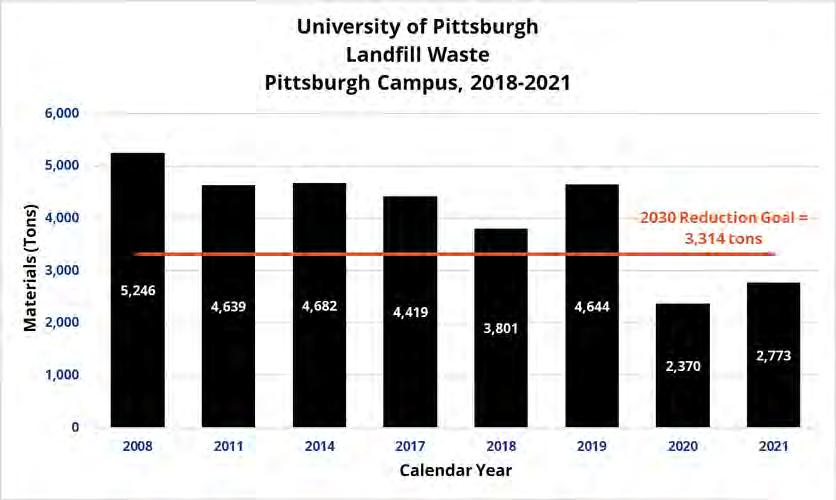
Reflecting all these realities, in CY21, the Pittsburgh campus only saw 15.9% of all materials diverted from landfill via single stream recycling.
Specialty Recyclables: Beyond single stream recycling, the University also recycles batteries, carpet, chemicals, compostables, corrugated cardboard, electronic equipment and devices, fluorescent light bulbs, mattresses, surplus items (including large household appliances or "white goods"), textiles, toner and ink cartridges, K-Pods, pharmaceuticals, and gloves (2019-22 pilots in labs and Housing).
2018-22 Progress Report on Pitt Sustainability Plan 37
With materials to landfill down in CY21, materials diverted via both single stream and specialty recycling were also down (75.7% and 51.1%, respectively).
University of Pittsburgh Materials Management & Diversion Pittsburgh Campus 2018-2021
Clutter for a Cause donations to local nonprofit organizations are not included in these totals.
However, University-wide focus on responsibly diverting more specialty material streams from landfill have resulted in categorical successes. In addition to textiles and Clutter for a Cause diversion growth (described above), Pitt Environmental Health & Safety announced a high of 70% chemical waste diversion from landfill in 2022.

The University remains committed to meeting the intent of the Pitt Sustainability Plan goals, including by rethinking waste and materials across their life cycles. Pitt is utilizing both traditional reduction and recycling techniques and exploring opportunities for reuse and specialized recycling materials streams.
Case Study: Print Reduction
While both Pittsburgh campus paper use and metered print was down nearly 70% between FY18 and FY22, the University has identified ongoing opportunities to retain and build upon digital adoption trends through a print reduction initiative.
In addition to reducing paper, ink, and energy usage, reducing print will help save the University time and money.

2018-22 Progress Report on Pitt Sustainability Plan 38
Where We Are: Compost
University-wide diversion of compostable materials from landfill started in 2015, during which 1,200 pounds were collected from campus. Since then, campus-wide compostable collection and diversion has scaled up across campus, with consumer-focused collection expanded to 8 Pittsburgh campus buildings in 2019.
In 2020, the University launched its Compostable Collection Dashboard to show campus-wide diversion of compostable materials monthly by building. Pre-pandemic, fiscal year 2020 was on track to be Pitt’s highest compost diversion year ever. Despite setbacks, in FY21, a new vendor partnership allowed a brief expansion of pre-consumer compostable material diversion from residential and retail dining locations.

However, aggregate results from 2018-22 indicate that diversion of compostable materials across the Pittsburgh campus has been erratic, the direct result of both the COVID-19 pandemic (2020-21) and the loss of a key compost hauling vendor in mid-2022.

As a result, the University is simultaneously pursuing additional vendor resources and continuously working with current vendors to bolster and expand efforts to offer more robust composting opportunities across the Pittsburgh campus. Continuous educational opportunities are critical in both normalizing and expanding compostable diversion offerings within the University community and its operations.



2018-22 Progress Report on Pitt Sustainability Plan 39
Progress towards the goal of expanding food waste composting to compost 50% of food waste by 2025 is unclear, but undoubtedly off track. No baseline of food waste campus-wide exists, in part because various approaches over the years have helped ensure that not all campus food waste is wasted. These strategies include a graywater digester at The Eatery dining hall, food recovery (addressed in the “Food Systems” section), and educational campaigns, including student-led food waste audits to reduce dining hall waste. Campus-wide food recovery alone ensured over 108,000 pounds of food made it not just to landfill but to people in need from 2018 through September 2022.
Specific to compostable materials, nearly 490 tons were diverted from the Pittsburgh campus from 2018 through 2022. Only 63 tons were diverted in CY22 alone.
The University recognizes the opportunity for expanded and more frequent diversion of compostable materials from the Pittsburgh campus and is actively seeking and rethinking solutions.
As an alternative to compostables, Pitt Sustainability Plan “Food Systems” goals focus on expediting the shift to reusable to-go beverage and food containers. Pitt’s residential dining (The Eatery and The Perch) are reusable by default.


On-campus catering also offers reusable serving and dinnerware for events. While the University remains committed both to reducing food waste overall and increasing composting food waste and compostable materials, the actual goal and timeline likely need to be reassessed.
Yard Waste: While not included in the data above, the University of Pittsburgh has long diverted landscaping materials from landfill to compost. From 2018 through 2022, 261 tons of yard waste were composted from the Pittsburgh campus.
Where We Are: Materials Research
University of Pittsburgh faculty have received funding for and published research on a variety of sustainable materials. Examples from 2018 through 2022 include, but are not limited to, solar power end of life, circular economy (described in the “Research” section), sustainable healthcare, oncology, medical devices, and surgeries (with collaborations between Pitt Engineering, Health Sciences, and UPMC).
Nonconventional Materials: Pitt Nonconventional Materials and Alternative Technologies (NOCMAT) engages in cuttingedge engineering research and servicelearning education involving sustainable, locally sourced, non-conventional materials adapted to lower technology production environments.
2018-22 Progress Report on Pitt Sustainability Plan 40
EXPLORATION
Through the integration of a creative, multidisciplinary curriculum, groundbreaking research, and social engagement, Pitt educates every member of its faculty, staff, and student communities on sustainability, fosters and supports its environmental leaders, and promotes innovation to contribute to a more sustainable world.

INNOVATION & ENTREPRENEURSHIP

GLOBAL OUTREACH


PARTNERSHIPS


RESEARCH TEACHING & LEARNING
41
TEACHING & LEARNING
We use sustainable principles to prepare students to lead lives of impact through a supportive environment focused on holistic and individualized approaches to learning inside and outside the classroom.
2018 PITT SUSTAINABILTY PLAN GOALS
Advisors: Engage all undergraduate advisors and give them the tools necessary to connect interested students to sustainability-themed courses, majors, minors, internships, and community activities.
First-Years: Incorporate sustainability education into all first-year seminars.
Certificate: Annually increase the number of students applying for and graduating with the Undergraduate Certificate in Sustainability starting Academic Year 2017-18.
Service Learning: Increase sustainability-related service learning opportunities.
Curriculum: Create faculty tools, workshops, and incentives to encourage the incorporation of sustainability components into current syllabi.

Where We Are: Engaging Advisors
Undergraduate Advisor Toolkit: In 2019, the Mascaro Center for Sustainable Innovation (MCSI) rolled out Pitt’s Undergraduate Advisor Toolkit for Students Interested in Sustainability. Regularly updated and distributed to advisors across campus, the toolkit provides advisors with the most up-to-date information to help students find academic sustainability courses, majors, minors, internships, and community activities.
Where We Are: Sustainability for First-Year Students
The original 2018 Pitt Sustainability Plan goal was to reach first-year students by incorporating sustainability education into first-year seminars. However, the Pitt Sustainability team found multiple opportunities to embed sustainability into a wide variety of incoming and first-year experiences as described below.
Online Pre-Orientation: All first-year and transfer undergraduate students take Pitt’s Online Orientation modules. To help students learn about campus sustainability efforts and positively contribute to the University’s culture of sustainability, an information module on sustainability was added to online orientation in Fall 2019 and has been annually updated since.

ENERGY & EMISSIONS 42
2018-22 Progress Report on Pitt Sustainability Plan
Success Story: Pre-Orientation Connections
Pitt offers pre-orientation opportunities for incoming first-year students to explore campus, connect with Pitt, serve the community, and develop friendships prior to enrollment. Recently dubbed “Panther Connect”, sustainability has been integrated into pre-orientation experiences since 2015. In 2022, sustainability-related first-year pre-orientation experiences included a wide variety of sustainability-related activities including planting a campus green wall, helping maintain Oakland trees, and assisting with post-Clutter for a Cause (move out) materials sorting.
Sustainability in Orientation: Since 2013, Pitt Green Team has been a mechanism for incoming first-year students to become eco-ambassadors, as trained by the Student Office of Sustainability. Though involved in multiple campus sustainability activities throughout the year, the 60 first-year student Pitt Green Team members are most visible at Arrival Week, during which they are responsible for recycling dozens of tons of cardboard.
Additionally, since 2015, a growing number of inperson Orientation events have added composting and/or zero waste strategies. In Fall 2021, Welcome Week featured 15 Pitt Green Events with ~7,400 attendees (including the Chancellor’s Picnic and Global Carnival). The Pitt Green Event designation Pitt Green Host format late in Fall


Sustainability Living Learning Community:
Developed by Pitt undergraduates and launched in Sustainability Living Learning
(LLC) helps students living on the same residence hall floor explore and engage with sustainability across all disciplines together. Both first-year and upper-level students thrive in the Sustainability LLC, learning best practices for living sustainably and how to model these behaviors for their peers and the Pitt community.

2018-22 Progress Report on Pitt Sustainability Plan 43
Nature-Cities-Humans First-Year Academic
Community: Pitt’s Academic Communities are an opportunity for first-year students to meet others who share their academic passions. Established by an MCSI Len Peters Faculty Fellow, Pitt’s Nature-Cities-Humans academic community was founded on sustainability in 2019 and has been offered annually since, with 15 students enrolling each year. The associated sustainability-focused First-Year Seminar is currently taught by an MCSI-affiliated staff instructor.
First-Year Seminar Sustainability Presentations:

While select faculty and students offered sustainability presentations to First-Year Seminars for at least a decade, MCSI standardized and centralized these offerings in 2019. Since then, MCSI-trained student and staff instructors have provided campus-wide Pitt Sustainability presentations to first-year and other departmental seminar courses, helping introduce undergraduate students to Pitt Sustainability initiatives and how they can engage with sustainability on campus. From 2019 through 2022, over 4,028 students from a wide variety of academic departments have experienced these presentations.

Where We Are: Academic Sustainability Programs
Undergraduate Sustainability Certificate: Launched in 2015, the University of Pittsburgh’s Undergraduate Certificate in Sustainability allows students to formally enhance their education by focusing on sustainability through interdisciplinary coursework. To date, 178 students have been awarded this certificate, with an additional 169 students pursuing it.
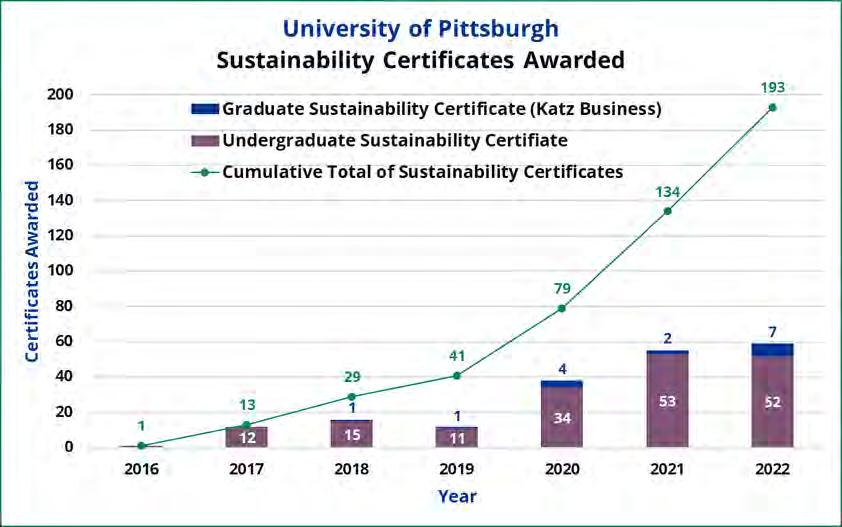
2018-22 Progress Report on Pitt Sustainability Plan 44
Sustainability Transcript Distinction: Launched in 2021 as 1of 4 piloted distinctions, Pitt’s Sustainability Transcript of Distinction provides students with a mechanism to gain recognition on their transcript for their high impact sustainability endeavors outside the classroom and broadens the number of undergraduate students participating in sustainability activities throughout campus. Still a new offering, 6 undergraduate students have graduated with the Sustainability Distinction through 2022 with an additional 28 students pursuing it.
Sustainable Engineering Master’s: Launched in 2018, Pitt’s Master’s of Science (MS) in Sustainable Engineering explores applying sustainable solutions in various professional settings by learning strategies to identify and solve our grand challenges using systems approaches in the context of the triple bottom line of environmental, societal, and economic problems. From 2018 through 2022, 13 students have graduated with the degree with an additional 32 students currently enrolled.
Where We Are: Service Learning
Across a wide swath of Pitt courses and research, faculty integrate academically relevant service activities that address human, environmental, and community needs into the course. Examples of new and expanded sustainability-themed service-learning coursework and partnerships include, but are not limited to, the following:

Oasis Farm & Fisheries Partnership: Since 2015, MCIS has partnered with the Oasis Project’s Farm and Fisheries, an urban micro-farm in the Pittsburgh’s Homewood neighborhood. A 2020 Year of Engagement grant funded a high tunnel greenhouse at the Homewood site to ensure year-round production of fruits, vegetables, and herbs. Constructed in Summer 2021 by the Pitt Hydroponics Club and sustainability interns, the new greenhouse provides a larger growing capacity and new space for community members and students to gather and learn.
Food Systems: Re-envisioned with support of a John C. Mascaro Lectureship in 2021, the “Introduction to Sustainable Food Systems” course now includes hands-on, real-life experiences with inspirational changemakers. Students visit Pittsburgh urban farms and work with community leaders on food issues. The course highlights the importance of nutrition as a catalyst for a sustainable food system and how a quality diet for people is healthy for the planet.

2018-22 Progress Report on Pitt Sustainability Plan 45
Provost Academy: Starting in 2019, Pitt’s Provost Academy offers a pre-orientation Urban Ecology and Sustainable Food Systems-based project for incoming students. Projects have included helping Grow Pittsburgh establish a farm stand in an area designated as a food desert, setting up protective deer fencing around native plants, helping Pittsburgh Parks Conservancy remove invasive species, and planting 63 native pawpaw tree seedlings.
Where We Are: Course & Curriculum Advancements
Sustainability is a broad, deep, and diverse cross-and transdisciplinary topic. As a result, efforts to identify, expand, and create sustainability-related courses have been varied and evolving since 2018.
Course Attribute Codes: Starting in November 2019, Pitt students can use 2 course attribute codes (sustainabilityfocused and sustainability-related) to filter and identify courses with sustainability content. Faculty apply for the designation for existing and future courses in Curriculog, with syllabi reviewed to ensure content integrity. Through 2022, 20 courses have acquired these official course attribute codes. MCSI continues to work with faculty to designate existing and new courses in the system and to adapt their syllabi and course content to include greater sustainability integration and focus.
Regardless, the 2022-23 academic calendar alone lists 34 courses with “sustainability” in their titles or course descriptions and MCSI has catalogued 86 courses as contributing to the cross-disciplinary Undergraduate Certificate in Sustainability. Through a broader definition, the University reported 446 sustainability-focused and “inclusive” courses in its 2021 AASHE STARS documentation. Future efforts are focused on developing a more comprehensive and accessible catalog of sustainability focused and related course options for students.
2 course attribute codes for sustainability

446 sustainability-focused courses reported via AASHE STARS

86 courses applicable towards Undergraduate Certificate in Sustainability

2018-22 Progress Report on Pitt Sustainability Plan 46
2019 Sustainability in the Curriculum Series: In 2019, MCSI and the Pitt Engineering Education Research Center (EERC) delivered a series of 3 workshops to help faculty integrate sustainability content and experiential learning into their curricula. A total of 67 faculty of various disciplines participated in the series, resulting in the addition of new sustainability and service-learning components in their courses.
MCSI Faculty Fellows: Since 2014, MCSI faculty fellowships have supported faculty in developing new sustainability-focused courses and/or reimagining current courses by incorporating sustainability content. New courses created since 2017 include, but are not limited to:

Design for Circular Economy (Engineering)
Freedom Seminar: Environmental Justice & Collective Economies (Education; Environmental Studies)
Freedom Seminar: Global Water, Activism, & STEM Pedagogies (Education; Environmental Studies)
Happiness and Human Flourishing (Nursing; Engineering)
Introduction to Engineering for Humanity (Engineering)
Introduction to Sustainable Food Systems (Honors)
Seminar in Composition: Sustainability (English)
Case Study: Faculty Sustainability Resource Hub

In 2022, the MCSI Faculty Sustainability Task Force initiated the creation of an online resource hub for Pitt faculty interested in integrating sustainability topics into their curricula. Still in development, the Faculty Resource Hub will provide various course materials and pre-developed content across disciplines. This hub will also identify faculty experts across a wide variety of sustainability topics, enabling faculty to call upon colleagues to help educate and inform students on sustainability-related topics and the Sustainable Development Goals.

2018-22 Progress Report on Pitt Sustainability Plan 47
RESEARCH
We advance the frontiers of knowledge and make a positive impact on the world through collaborative and multi-disciplinary approaches to sustainability-related research that focuses on areas of great social and environmental need.
2018 PITT SUSTAINABILTY PLAN GOALS
Celebrate: Raise the visibility of faculty research in sustainability.
Collaborate: Provide more opportunities and incentives for interdisciplinary research as well as the bridging of academics and operations – promoting an environment of informing and working together.
Living Lab: Use the Pitt campus as a living laboratory for faculty and students to implement new ideas and study outcomes over time.
Fundraise: Raise external funds for endowed chair(s) to support faculty with research expertise in sustainability.
Endowed Research: Develop an endowed seed grant fund to provide greater opportunities for sustainability-focused federal grants. Scholarships: Increase prestigious scholarship opportunities for undergraduate and graduate research in sustainability.

Where We Are: Sharing Faculty Research

The University of Pittsburgh is committed to sharing the story of Pitt’s sustainability-focused and -related research locally, nationally, and globally.

In the 2023 QS World University Rankings in Sustainability, the University of Pittsburgh ranked #34 of U.S. institutions and #126 globally. Both the social and environmental categories included research considerations. Pitt ranked above the global median for both -- #164 in the social “knowledge impact” category and #396 in the environmental “sustainable research” category.
As demonstrated in the University’s 2021 AASHE STARS Gold documentation, 68.6% of all Pitt departments hosted faculty doing sustainability-focused or -related research. While it is difficult to track media outreach and communication across 85 academic departments, in just the narrow “Green & Sustainable Science & Technology” category, Pitt faculty published 104 research papers from 2018 through 2022.
48
2018-22 Progress Report on Pitt Sustainability Plan
Many Pitt faculty are advancing sustainability-focused and -related research, with their work garnering positive media attention. A few examples include:
Mark Abbott (Geology & Environmental Science) — Measuring climate change in glacial cores.

CB Bhattacharya (Business) — How sustainability is embedded into corporations and business decision-making.
Eric Beckman (Chemical Engineering, MCSI) — Molecular green chemistry & product design, including being named a National Academy of Inventors Fellow in 2020.
Vikas Khanna (Civil & Environmental Engineering) — Connecting water use and beef.
Carla Ng (Civil & Environmental Engineering) — Battle against per- and polyfluorinated alkyl substances (PFAS)
Cori Richards-Zawacki (Biology) — Exploring, in partnership with National Science Foundation, how amphibians and other species are facing human-caused changes to global systems

Engineering Sustainability Conference: From 2005 through 2019, the Mascaro Center for Sustainable Innovation (MCSI) led and collaborated on delivering the Engineering Sustainability conference biannually in Pittsburgh. The 2019 conference subtitled “A Climate for Change”, attracted 258 attendees from 49 different Universities, including students, post-docs, and faculty. In addition, private industry, government, nonprofit, and media representatives also attended.
Conferences Grants: Since 2009, MCSI has provided conference grants for undergraduate and graduate students as well as young faculty to more broadly promote MCSI-funded and sustainability-focused Pitt research and participate in conferences. From 2018 through 2022, this funding has helped 37 students raise the visibility of Pitt’s sustainability research around the world.
2018-22 Progress Report on Pitt Sustainability Plan 49
Photo courtesy of Mark Abbott
Where We Are: Interdisciplinary Sustainability Research
MCSI Research Seed Grants: Since 2004, MCSI’s Research Seed Grants have helped catalyze the formation of convergent research teams focused on sustainability and related solutions. From 2004 through 2022, MCSI’s research grants have supported over 115 faculty research projects with ~$4.5 million, which has helped leverage nearly $34.5 million in follow-on funding. Recent projects focused on decarbonizing electricity, acoustic monitoring of birds, amphibian resilience, decarbonizing electricity, infrastructure, magnetics, materials, plastic nurdle monitoring, rare earth free motors, and solar.
Momentum Grants: A 2019 reframing of University-wide internal research funding resulted in the Pitt Momentum Funds, focused on seeding, teaming, and scaling grants. Interdisciplinary, sustainability-focused projects have been successful in all 3 funding rounds to-date, including:
CircularEconomyResearch: Pitt’scirculareconomyresearchhas grownininclusionandscalesince2018,startingwitha2018 MacArthurFoundationgrantfocusedonplasticsrecycling.A2-year, $1.3million,2019NationalScienceFoundation(NSF)Growing ConvergenceResearchgranthelpedexpandthisworkwitha5universityteamfocusedonthecomplexchallengeofglobalwaste throughcirculareconomydesignandledbyDr.MelissaBilec(MCSI, CivilandEnvironmentalEngineering(CEE)).Afollow-on2020Pitt MomentumgrantsupportedaninterdisciplinaryPittteamfrom Chemistry,Engineering,andLawtofocusonAttackingthePlastic WasteProblem.In2022,PittandtheUniversityofGeorgiareceived anotherNSFgranttoassessoptimizingcirculareconomiesover traditionallineareconomiesentitled“ATaleofTwoCities:Optimizing CircularityfromMoleculestotheBuiltEnvironment.”

EnvironmentalHealth:Detailedinthe“Equity&Access”sectionof thisreport,theCenterforHealthyEnvironmentsandEquityResearch (CHEER)isamultidisciplinary,intersectional,andcommunity-based researchprojectfundedbya2022PittMomentumgrant.CHEERis addressingextensiveenvironmentalhealthdisparitieswithfacultyin PublicHealth,Engineering,andGeology&EnvironmentalSciencesin partnershipwithAlleghenyCountyHealthDepartment.
WaterEquity:ThePittsburghWaterCollaboratoryledasuccessful 2021PittMomentumFundsTeamingGrantfocusedonwaterquality, affordability,andpracticetransparencyinAlleghenyCounty (MeasuringUp:GradingDrinkingWaterQuality,Affordability,& TransparencyPracticesinAlleghenyCountyWaterSystems),which includedresearchfacultyfromGeology&EnvironmentalSciences, HealthSciences,GSPIAandSociologyalongsidethelocalnonprofit WomenforaHealthyEnvironment.
Center for Sustainable Business Grants: The Center for Sustainable Business (CSB) annually allocates $10,000 to funding research on sustainable business research. Recent grants have supported projects on assessing how financial incentives impact auditor assessment of suppliers and theorizing how entrepreneurial demands reinforce, conflict, and resolve issues with democratic organization. The CSB maintains a call for research proposals that support decarbonization, inclusive workforces, and ESG literacy (environment, social, and governance).

2018-22 Progress Report on Pitt Sustainability Plan 50
Engineering + Public Health: In 2023, the University of Pittsburgh’s Swanson School of Engineering and School of Public Health launched “Trans-Disciplinary Collaboration” pilot research grants. Priority areas for funding are a) climate change and health; b) global health; and c) environmental justice.

Where We Are: Campus as a Living Laboratory

On-Campus Sustainability Internships: Students are imperative contributors to sustainability at the University of Pittsburgh. From 2018 through 2022, over 80 students have interned in Sustainability roles across campus, gaining hands-on and co-curricular skills and knowledge that help prepare them for high-impact careers focused on and/or incorporating sustainability concepts.
Sustainability Dashboards: In addition to providing transparency on specific Pitt Sustainability Plan goals, the Pitt Sustainability Dashboards provide interactive views of building-specific and campus-wide progress in many Stewardship categories. Many dashboards were created by Pitt students. The data informing all Pitt Sustainability dashboards are available for Pitt community members to download and analyze, opening up campus and building data, systems, and performance as opportunities for teaching, research, and improvement.
Additional dashboards are in development by Pitt’s Office of Sustainability and Pitt IT, helping facilitate ongoing research interaction with the University’s Pittsburgh campus operations.
Electric Power Systems Lab: The Electric Power Systems Lab in the Swanson School of Engineering is used for research and education. Sponsored in-kind by Eaton, the lab provides opportunities for Pitt faculty and students to perform advanced work in AC and DC microgrids, innovative grid technologies, power electronic devices and converters, renewable energy systems and integration, controls and communications, automation and relaying, distribution engineering, and other emerging electric power technology areas.
Student Projects: A number of the University’s sustainability-focused and -related courses regularly originate student projects focused on campus sustainability. Core courses such as ENGR 1907: Sustainability Capstone and GEOL 1333: Sustainability annually generate projects. From 2018 through 2022, student sustainability research projects also originated in Biology, Business, Civil and Environmental Engineering, Computer Science, English, Environmental Studies, GSPIA, Industrial Engineering, Law, and Urban Studies courses. Topics in recent years include, but are not limited to, carbon offsets, environmental justice, on-campus renewable electricity generation, reusable to-go containers, pollinator gardens, and stormwater management.
2018-22 Progress Report on Pitt Sustainability Plan 51
Where We Are: Research & Operations Collaboration
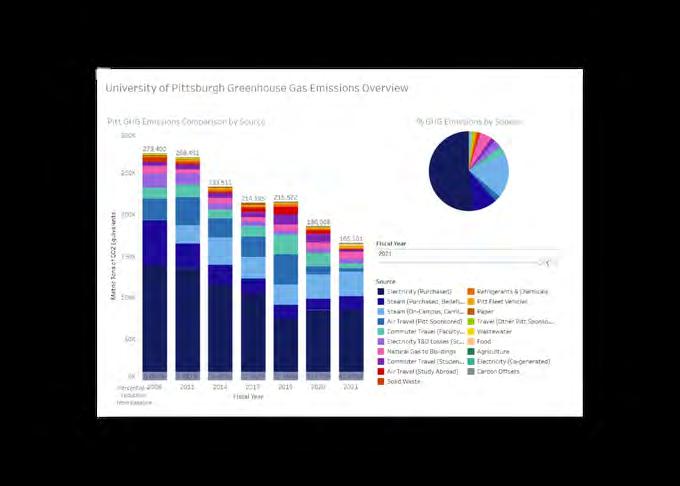
GHG Inventories: The University’s greenhouse gas (GHG) inventorying process is one of the longest standing collaborations between Pitt’s research and operations teams. Overseen by Dr. Melissa Bilec (MCSI & CEE) since the first inventory for fiscal year 2008, the process is completed by a Pitt graduate student. Pitt’s GHG inventorying process is an ongoing data and analysis feedback loop between research and operations with now annual Pittsburgh campus GHG inventories (and regional campus GHG inventories being initiated). This collaborative effort supports both the University’s academic mission and work towards carbon neutrality by 2037.
Picogrid Digital Twin: The Picogrid Digital Twin laboratory in Benedum Hall became fully energized in 2022, with research experiments being conducted. Led by Dr. Bob Kerestes (ECE), the Picogrid Lab’s research is connected to the Benedum rooftop solar array and focused on sustainable energy production and security.
Design & Construction Capstone: The University of Pittsburgh’s built environment is an obvious learning and research opportunity. Every Spring semester, student projects in Pitt’s Civil and Environmental Engineering Capstone course focus on improving the built environment on-campus and off, with many focused on or related to sustainability.
Local Renewable Power Generation: In addition to powering the Pittsburgh campus with renewable electricity, the University’s 2 long-term power purchase agreements for local, renewable power provide opportunities for faculty and students at these solar and run-of-theriver hydro facilities for learning and research.

MCSI Task Force Research and Operations Subcommittee: Since 2019, a sub-committee of the MCSI Faculty Sustainability Task Force has been focused on building internal Pitt relationships and frameworks for internships, course projects, summer research, and facultyled research opportunities that benefit Pitt operations and provide hands-on research project experiences for faculty and students.

2018-22 Progress Report on Pitt Sustainability Plan 52
Where We Are: Student Research Opportunities
MCSI Undergraduate Research: Since 2004, MCSI has offered 12-week, paid undergraduate summer research opportunities that partner Pitt students with faculty on sustainability-focused research projects. From 2004 through 2022, MCSI supported 325 undergraduate student research opportunities across a wide array of disciplines including biological sciences, communications, economics, education, engineering, environmental studies, equity, history, psychology, and sociology. For 2023, opportunities are offered from 15 different academic departments creating a truly interdisciplinary research program.
Honors Fellowships: Since Summer 2021, the David C. Frederick Honors College’s undergraduate Community Research Fellowship has supported a number of experiential learning opportunities focused on creating a socially responsible, mutually beneficial exchange of knowledge and resources with community partners. Over the years, over $12,000 in Honors College creative and research fellowships have also been awarded to sustainability-related undergraduate research projects, including a 2020 art installation focused on campus building energy use.
Case Study: Energy Inspires Art
The Campus Energy Constellation was a dynamic light installation that portrays the University’s energy usage as an array of stars. The focus and goal of this project is to physicalize the environmental impact of the University community to promote transparency in the University’s community on the matters of environmentalism ad operations.

The piece was envisioned and created by Jonathan Coles (SSOE ’20), who also led creation of the Pitt Sustainability Dashboard.

Sustainable Business Research: Since 2020, Pitt's Center for Sustainable Business has partnered graduate students with corporate sponsors on semester and year-long research projects, resulting in tailored sustainable business solutions. Results have included assisting CONSOL Energy with the creation of a just energy transition stakeholder engagement strategy, conducting research on bias intervention strategies for a retailer, and assessing the viability of new transportation industry technology adoption for Ingevity.
Partnered Water Research: Since 2018, the Pittsburgh Water Collaboratory has hostedresearch interns and fellows whopartner with water system practitioners in nonprofits, local governments and their agencies, and community organizations.Recent projects have focused on drinking water affordability, urban stream ecology, emerging and legacy river system contaminates, community perceptions of water resources, modeling population impacts on water quality, and green infrastructure solutions for localized flooding.
2018-22 Progress Report on Pitt Sustainability Plan 53
Where We Are: Research Fundraising
There are 3 goals in the 2018 Pitt Sustainability Plan that concentrate on sustainability fundraising, with focus on supporting research by faculty, endowed research funds, and undergraduate and graduate student research scholarships.

Endowed Research: Thanks to the generosity of several Pitt alumni, MCSI has created endowed funds that support the MCSI summer undergraduate research program, detailed in the “Engagement & Awareness” section.
Graduate Research Giving: John C. Mascaro Fellowships support graduate students pursuing the degree. John “Jack” Mascaro was a Distinguished Alumnus of Pitt’s Swanson School of Engineering. Along with founding MCSI, his passion for sustainability created an impactful legacy at the University in student scholarships, research, and beyond.
Pitt Alum: Jack Mascaro
Jack Mascaro founded Mascaro Construction, one of the largest contracting and construction management firms in the nation at the forefront of green construction. He also founded Pitt's largest sustainability-focused academic center, the Mascaro Center for Sustainable Innovation.

Multi-year funding from Covestro for the Covestro Circular Economy Program supports 3-year graduate fellowships for talented doctoral students advancing circular economy research.
Sustained, multi-year funding from The Heinz Endowments and Hillman Foundation supports Pittsburgh Water Collaboratory doctoral students advancing regional water research.
Pitt Day of Giving: Starting in 2019, Pitt’s Sustainability partners have individually and collectively offered opportunities for alumni, internal, and external donors to support Pitt Sustainability during the Pitt Day of Giving. This University-wide day brings the Pitt community together with the shared goal of giving today to transform tomorrow. Recent sustainability fundraising has focused on funding student-led sustainability projects.

2018-22 Progress Report on Pitt Sustainability Plan 54
INNOVATION & ENTREPRENEURSHIP
We strive to ensure that our research translates into innovations that positively impact our community and the environment at Pitt and beyond.
2018 PITT SUSTAINABILTY PLAN GOALS
Ideas: Increase the number of sustainability-related patents, licenses, and start-ups (both for-profit and nonprofit).

Innovation: Collaborate with Pitt’s Office of Innovation and Entrepreneurship, the University’s hub for innovation and entrepreneurship, to embed sustainability principles throughout the organization.
Access: Work across impact areas to define innovations and ensure that there is a mechanism for students, faculty, and staff to advance ideas for impact.
Where We Are: Sustainability-Related Startups and Spinouts
As exemplified by some of the sustainability-related Pitt startups and spinouts below, Pitt students, faculty, and staff have been looking to balance equity, environment, and economics in entrepreneurship for a number of years. The University is incredibly proud of companies and organizations led by Pitt alumni who deliver products and services built on the triple bottom line framework which values social and environmental concerns in addition to economic profit.
Aeronics — Leverages advanced materials to more efficiently store oxygen for consumer, veterinary, and medical applications. (Est. 2017)
EcoSoap Bank — Global nonprofit recycles leftover hotel soaps to redistribute to people in need to improve health, significantly reduce waste, and provide livelihoods and free education to disadvantaged women with no other reliable source of income. (Est. 2014)

Ecotone Renewables — Closing the “food loop” by recapturing lost nutrients to create nutrient rich fertilizer while producing hyper-local energy. With the “Seahorse” anaerobic digester, Ecotone makes sustainable food and agriculture systems more accessible andprevalent outside the industrial scale (Est. 2019)

55
2018-22 Progress Report on Pitt Sustainability Plan
Photo courtesy of EcoSoap Bank
Hibersense — A command console and app to control home temperatures in multiple rooms based on comfort and preferences while monitoring indoor air quality and system efficiency. (Est. 2016)
Interphase Materials Products designed to provide a better interface between critical technologies’ surfaces and their environments, thus reducing inorganic & biological fouling, saving energy, and improving performance and cleanability. (Est. 2015)
pathVu — Enables independent mobility by creating a more accessible and livable world for pedestrians of all abilities. pathVu tools help evaluate and plan critical sidewalk + curb ramp infrastructure projects, alongside best-in-class solutions and data collection. (Est. 2019)
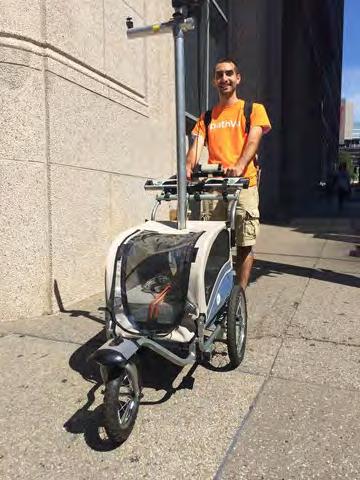

Polycarbin — Closed-loop solution to help ensure plastic waste leaving the biopharma and life sciences industry is turned into the laboratory products for tomorrow.
Trek Gum — 100% plastic-free gum that helps clean teeth and is compostable. (Est. 2019)

Where We Are: Advancing Innovative Sustainability Ideas at Pitt
Pitt Sustainability Challenge: Taking to heart the goal to “ensure that there is a mechanism for students, faculty, and staff to advance ideas for impact”, the Office of Sustainability and Mascaro Center for Sustainable Innovation (MCSI) introduced the Pitt Sustainability Challenge, which launched in December 2022.
Offering a $300,000 implementation grant, the Pitt Sustainability Challenge will fund the best proposal to carbon neutrality with lasting benefits for the Pitt community. Through this Challenge, we invite innovative solutions that are grounded in an understanding of local conditions; that are ambitious, yet achievable; that show the greatest potential to realize measurable improvements for the Pitt community; and that will endure in their intended outcomes over time. For this effort to succeed, we must reach beyond any single understanding of what is possible – representing an opportunity to think big for the benefit of everyone, to envision a bolder and greener future for Pitt.
Registered teams will submit proposals in April 2023, and the winning project will be selected in September 2023, with an expected implementation over 1 to 2 years.
2018-22 Progress Report on Pitt Sustainability Plan 56
Photos courtesy of PathVu, Polycarbin, & Trek Gum
Where We Are: Sustainability + Innovation & Entrepreneurship
Over the past several years, both Pitt Sustainability and Pitt’s Innovation ecosystem have evolved their structures, resulting in more collaborations and pathways for innovation including from students, faculty, and regional entrepreneurs and businesses and in partnership with industry and investors. Examples of these outcomes include, but are not limited to:
Randall Family Big Idea Competition: Finalists and winners of the Big Idea Center’s Randall Family Big Idea Competition are often sustainability-focused or related, exemplifying the embedment of sustainability into successful Pitt student entrepreneurship. Recent examples include FlowCellutions (2022), Polycarbin (2020) Trek Gum (2019), Four Growers (2018).
Student Prototype Funding: Starting in 2021, MCSI and the Office of Innovation and Entrepreneurship (OIE) co-delivered support for innovative student product or process prototypes that enhance sustainability. This support includes funds, makerspace access, feedback, expertise, and references.


Entrepreneurs in Residence (EIRs): Several of OIE’s EIRs have sustainability expertise and/or regularly make connections between aspiring Pitt and Pittsburgh entrepreneurs to Pitt Sustainability subject matter experts who provide market insights.
Entrepreneurial Excellence: In 2021 and 2022, the Institute for Entrepreneurial Excellence worked in collaboration with Pitt’s Community, Government Relations, and Purchasing teams to help local businesses increase their reach and capacity. Training and information sessions programs included subject matter expert input on diverse and sustainable purchasing best practices and opportunities. Sessions focused on specific categories of opportunity including food businesses; maintenance, repair, and operations contracts; and security services.
2018-22 Progress Report on Pitt Sustainability Plan 57
PARTNERSHIPS

We support sustainability through a robust capacity to partner.
2018 PITT SUSTAINABILTY PLAN GOALS
Local: Establish local and regional partnerships to accelerate the transfer of sustainability ideas from Pitt classrooms and laboratories through implementation.
Collaborate: Connect with industry and community collaborators to support applied sustainability research and education.
Community: Link sustainability and Community Engagement Centers more explicitly.
K-12 Schools: Invigorate our existing programs to increase the impact of sustainability education in the K-12 curriculum.
Where We Are: Organizational Partnerships
Center for Sustainable Business: Founded in 2019, the University of Pittsburgh’s Center for Sustainable Business (CSB) helps companies and students learn how to leverage investments in sustainability. With 12 member companies spanning a wide range of industries, the CSB established its Sustainable Business Forum in 2020 as a corporate peer-to-peer learning network that combines cutting-edge academic insight with open discussion to help companies learn to leverage their investment in sustainability to create more business and social value.
The CSB also connects studentsinterested in driving research and relationship collaboration between major companies. In 2022, fellowship opportunities were focused on benchmarking, clean energy, climate action, equity, ESG, and supply chain projects.
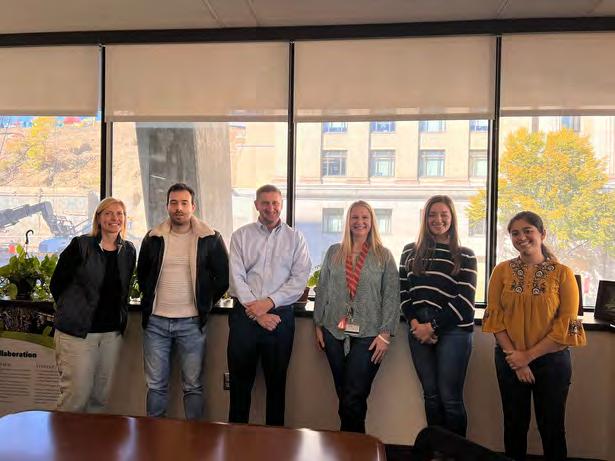
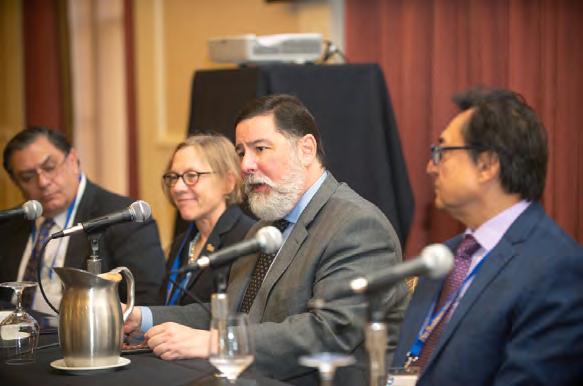
Sustainability Capstone Project Partnerships: Every semester, undergraduate students in the Sustainability Capstone course undertake semesterlong projects focused on sustainability with a broad range of partners ranging from small nonprofit organizations, government agencies, to Fortune 100 and multi-national corporations. In the past several years, projects have included Avient Corporation, City of Pittsburgh, Corning, The Mosaic Company, Carnegie Museum of Art, McCandless Township, and many more.
Circular Economy Program: In Fall 2022, the University of Pittsburgh welcomed its first cohort of students into the Covestro Circular Economy Program. The first academic offering of its kind in the U.S., the program combines a circular design curriculum with an innovative training partnership with Covestro and other organizations focused on creating circular, sustainable product and service solutions.
58
2018-22 Progress Report on Pitt Sustainability Plan
Industry Partnerships: Pitt has partnerships across various industries on a diversity of projects; newer collaborations announced since 2017 include:
Alstom — Global mobile transportation leader is partnering with Engineering to make transportation smarter, more sustainable, and energy efficient through mentorship, research, and career pathways.
Advanced Magnetics for Power & Energy Development (AMPED) Consortium —
Created in 2020, the AMPED industry consortium is focused on applying advanced materials to the electric power industry to make industrial components more efficient and longlasting. AMPED includes 20 industry members and 8 government agencies.
Duquesne Light — The energy provider is partnering with Pitt’s Energy GRID Institute to create a collaborative platform that will advance and implement innovative solutions in support of a more secure, resilient, and clean energy grid.

Eaton — The intelligent power management company has increased research collaborations on electric vehicle infrastructure.
Energy Innovation Center — Pitt laboratories and incubator space at Pittsburgh’s Energy Innovation Center (EIC) in the Lower Hill District helps facilitate large-scale research and promote industry partnerships. Pitt Labs currently at the EIC include the Electric Power Technologies Laboratory, High-Temperature Corrosion Testing Laboratory, and the Next Generation Energy Conversion and Storage Technologies Laboratory.
Leidos/Energy — National Energy Technology Lab (NETL) — Pitt’s partnership with Leidos/Energy (principal contractor to NETL) has generated more than $1.75 million in annual research by Pitt faculty dedicated to alternative energy, reducing fossil fuel dependency, grid efficiency and resilience, and related areas.
Malvern Panalytical — The laboratory instruments manufacturer is partnering with Pitt Next-Generation Energy Conversion and Storage Technologies Lab on interior battery chemistry to enhance efficiency of energy conversion and storage.
Peoples Gas/Essential Utilities — The natural gas provider is partnering with Pitt Engineering to identify, test, and apply novel materials to natural gas infrastructure to enable delivery of clean hydrogen safely and efficiently.
Power Purchase Agreements — Beyond making Pitt’s energy sourcing more sustainable, Pitt’s solar and hydro power purchase agreements open the door for those facilities to be activated by faculty and students as a living laboratories for student learning and research.
Westinghouse — The nuclear power company instituted a new five-year master research agreement to facilitate Pitt researchers’ direct collaborations on advanced clean energy nuclear research.
59
2018-22 Progress Report on Pitt Sustainability Plan
Sustaining Sustainability Podcast: Hosted by the Center for Sustainable Business, Sustaining Sustainability is regular podcast series started in 2021 to explore sustainability lessons and challenges magnified by the COVID-19 pandemic. Over 50 episodes so far focuses on a specific topic during an interview with industry managers, academic experts, government officials, and civil society leaders.
Where We Are: Higher Education Partnerships
United Nations Sustainable Solutions Network: In February 2019, the University of Pittsburgh became a founding member of the U.S. Chapter of the United Nations Sustainable Solutions Network, which connects Pitt and other universities around collaborative sustainability efforts.


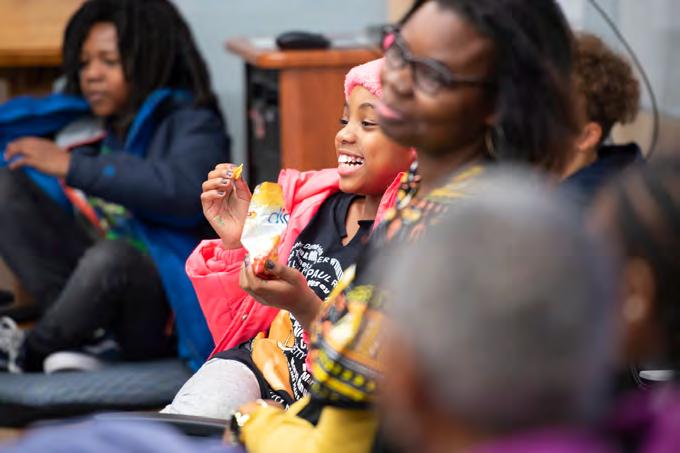
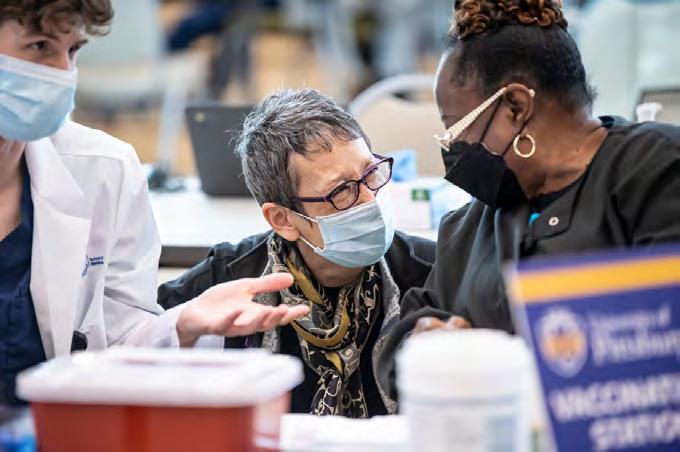
Additional Pitt partnerships on the local, national and global levels are detailed in the “Engagement & Awareness” and “City & Regional Connections” sections.
Where We Are: Community Partnerships
Community: The University of Pittsburgh has an extensive variety of community engagement and outreach activities. Pitt faculty, staff, and students work shoulder-to-shoulder with community leaders every day to support our various communities. Whether connecting clinical training with community health needs, helping residents learn valuable skills to unlock tech sector opportunities, or providing safe and welcoming spaces for community leaders to participate in and contribute to Pitt’s higher education mission, Pitt is a vibrant partner in the region’s progress.
Much of Pitt’s work with local communities is intrinsically related to sustainability, in line with helping communities thrive by advancing the international Sustainability Development Goals through improving the natural and built environment and scaling up positive economic and social impacts.
60
2018-22 Progress Report on Pitt Sustainability Plan
Success Story: Community Engagement Centers



The University of Pittsburgh has two Community Engagement Centers (CECs) located in Pittsburgh’s Homewood and Hill District neighborhoods, with a third in planning in Hazelwood. Each CEC represents the University’s 15-year commitment to the neighborhoods by offering diverse programming, providing dedicated staff, helping build organizational capacity, and strengthening partnerships between Pitt’s educational and research capabilities with community leaders who are working to help their neighborhoods to thrive.

Since 2018, over 11,000 Pittsburgh residents have utilized Pitt’s CECs’ high quality educational, health and wellness, and economic opportunity programming. The Homewood CEC has hosted an average of 30 programs for community members annually. In 2022, the Homewood CEC operated an in-school and Saturday tutoring program for 75 students in first through fifth grades to combat learning loss during the remote schooling year; students experienced positive academic achievement outcomes in oral reading fluency, spelling, and math.




The Hill District CEC works to support underrepresented community members through programming that builds capacity, improves quality of life, advances beneficial research, and enhances education through STEM opportunities. To help bridge the digital divide, the Hill District CEC offered 9 programs for residents of all ages to learn about digital careers and technology. These efforts reached 229 community members via K-12 STEAM initiatives, IT workforce development, and enriched digital learning opportunities including how to use computers and gain internet connectivity).
Pitt’s third CEC is taking shape in Pittsburgh’s Hazelwood neighborhood and will bridge Pitt’s life sciences expertise with preK-12 education and workforce development. The Hazelwood CEC will help accelerate the University’s commitment to contributing to expanded community-guided preK-12 educational opportunities, community development, and building a more inclusive workforce.
61
2018-22 Progress Report on Pitt Sustainability Plan
Community Engaged Research: Since 2020, the Mascaro Center for Sustainable Innovation (MCSI) has served on the Planning Committee for Pitt’s annual “Community Engaged Scholarship Forum,” helping bring environmental justice and sustainability-related topics to the conference program and attendees.

Business Support: The University of Pittsburgh’s Institute for Entrepreneurial Excellence (IEE) provides business support for entrepreneurs and small, family-owned, and closely held businesses. In 2019 and 2020, the IEE supported 1,300 businesses – and has a variety of programs to help develop and grow minority entrepreneurs in disadvantaged communities
In 2021 and 2022, IEE incorporated diverse and sustainable purchasing best practices in training and information sessions focused on food businesses; maintenance, repair, and operations contracts; and security services.
Environmental Management Assistance: Since 2015, IEE has provided free and confidential environmental assistance to small businesses through the Environmental Management Assistance Program (EMAP), which has been operating out of small business development centers (SBDC) across Pennsylvania since 1997. Through EMAP, IEE has helped educate and assist hundreds of small businesses comply with environmental regulations, embrace sustainability, pursue green business and product designations and certifications, and reduce energy consumption and greenhouse gas emissions.
From 2018 through 2022, IEE’s EMAP provided in-depth environmental consulting assistance to 96 small businesses in Pennsylvania, including 64 new clients and 40 on-site assessments of small business facilities. IEE also helped clients submit 32 state and local environmental permits, of which 23 were approved.
In 2022, the statewide EMAP program (including delivery via IEE) was recognized with the 2022 Small Business Environmental Assistance Program Excellence Award from the National Steering Committee of Small Business Environmental Assistance Programs & Small Business Ombudsmen.
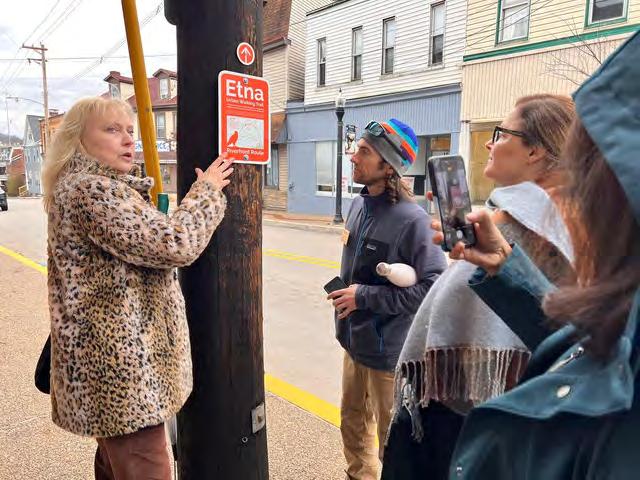
62 2018-22 Progress Report on Pitt Sustainability Plan
Training: In 2020, Pitt’s Manufacturing Assistance Center (MAC) trained ~70 individuals for careers in manufacturing, which is an important part of the region’s just energy transition. At that time, 40% of MAC trainees lived in under resourced Pittsburgh neighborhoods, 31% had been previously incarcerated, and 95% of graduates were placed in living wage jobs. In 2021, the MAC relocated to Pitt’s Titusville hub, helping expand its impact across the region.

Where We Are: K-12 Education Partnerships


Allegheny Traditional Academy Energy Education: In 2021 and 2022, MCSI partnered with The Efficiency Network Inc. (TEN) to support Pittsburgh Public Schools’ plans to improve the educational experience for students and improve the teaching environment for faculty districtwide by improving Allegheny Traditional Academy’s (ATA) energy use, operational costs, and building infrastructure. Through 2022, MCSI hosted 4 educational sessions for students, which are continuing in 2023. TEN completed ATA’s energy conservation project in 2022, including lighting upgrades, a deep HVAC system retrofit, and steam-hot water conversation.
Teach the Teacher: Between 2014 and 2020, MCSI offered a 2-day Teach-the-Teacher professional development program through which middle school science teachers from across Western Pennsylvania learned how to enhance their curricula by integrating engineering and sustainability modules. Delivered in collaboration with UCLA’s Center X for Teachers, the program indirectly engaged ~2,000 students across the Pittsburgh region, over half from underserved schools. Post-workshop surveys indicated that 93% of teachers would be incorporating the sustainability modules into their classrooms and 100% recommended this series to their peers and colleagues.
63 2018-22 Progress Report on Pitt Sustainability Plan
GLOBAL OUTREACH
We engage with the world through sustainability to explore and address issues that improve global quality of life.
2018 PITT SUSTAINABILTY PLAN GOALS
Celebrate: Promote sustainability-related topics at industry and academic conferences to inform greater audiences about our stories of impact.
Experiences: Track sustainability-related service and study abroad opportunities for students.
Service: Increase the number of sustainability-related international service projects.

Alumni: Find alumni leading sustainability initiatives nationally and internationally and connect them with University faculty and students.
Where We Are: Global Partnerships
Pitt - Newcastle University Partnership: Pitt’s ongoing collaboration with Newcastle University in the United Kingdom focuses on sustainable, place-based universities -- and how universities can positively impact, support, and strengthen their communities through collaboration with city officials, local nonprofits, and community engagement programs. As post-industrial cities both undergoing reinvention, Newcastle and Pittsburgh face similar challenges including balancing efforts that may benefit the city as a whole but have disproportionate effects on underrepresented and at-risk communities.
So far, the partnership has yielded place-based virtual conferences in 2021 and 2022. The 2022 conference, “Universities: How can we take a people-centered approach to engage with our places?,” explored and shared best practices on how universities advance place-based approaches through community and student engagement, measure impact, and demonstrate accountability to our communities and stakeholders.
In addition to the place-based initiatives, Pitt and Newcastle engage in additional collaborations including healthy aging, children's literature, and beyond.

2018-22 Progress Report on Pitt Sustainability Plan 64
Global Engagement in Sustainability Grants: Awarded for the first time in 2022, Pitt’s Global Engagement in Sustainability grants enable people to share, develop, and expand their research, teaching, or professional practice beyond the University’s campuses. This joint initiative of the Mascaro Center for Sustainable Innovation (MCSI) and University Center for International Studies (UCIS), supports many first-year projects aligning with the Sustainable Development Goals (SDGs) and national and international partners. Seven grants were awarded for a range of projects including but not limited to; Medical Design for Low Resource Environments, Harnessing Human-Centered Design for Intervention Development in Global Public Health: A Community-engaged Pilot Study in Nepal, Realizing Sustainable Development Goal 6: Challenges & Opportunities, and more.
Jean Monnet Network: Transatlantic Perspectives on Energy and Cities (TPEC): From 2018 through 2023, Pitt’s European Studies Center (ESC) worked to strengthen research and to teach actions on transatlantic, urban, and energy policy studies among the University of Pittsburgh (USA), Newcastle University (United Kingdom), University Jean Monnet Saint-Étienne (France), and Sciences Po Lyon (France).
Funded by the European Union, Pitt hosted workshops focused on cities and energy, including a Spring 2019 workshop on Cap and Trade in the EU and U.S. (which produced international cap and trade policy recommendations) and a Summer 2022 conference focused on assessing lessons learned in just energy transitions in the EU and the U.S.
Between 2018 and 2022, international study tours have helped students learn about urban development related to cultural regeneration projects and resiliency related to climate change and the COVID-19 pandemic.
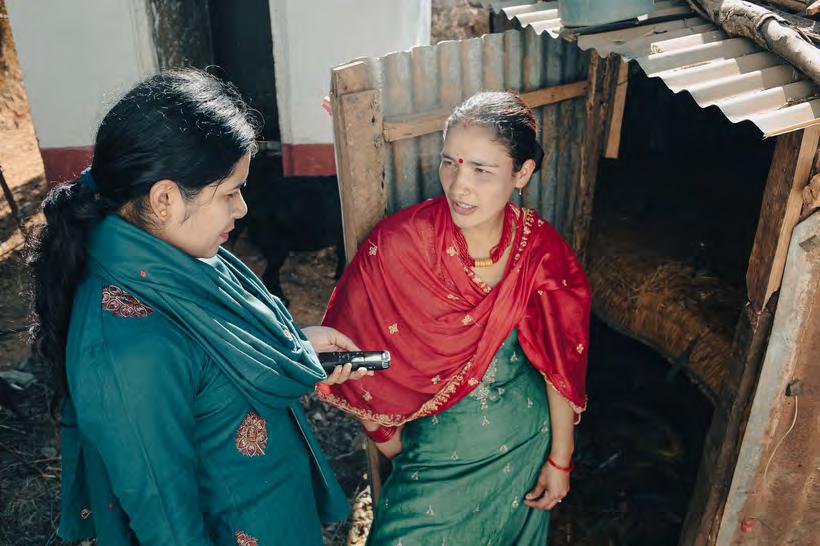

Climate Change & Small Island Nations: In 2022,Dr. David Sanchez (CEE, MCSI) explored sustainability challenges for Pacific Island Nations in Micronesia in collaboration with the IPIKU government, and educational and nonprofit leaders from the Republic of the Marshall Islands, Republic of Palau, Federated States of Micronesia, Commonwealth of the Northern Marianas Islands, and Guam. In 2021, they hosted an international webinar series on “Climate Change as a National Security Issues for Small Island Nations” featuring world renowned government leaders, climate envoys, climate scientists, and environmental lawyers discussing the challenges facing Pacific islands in Micronesia. This work was funded by a 2-year Global Academic Partnership grant from Pitt’s Global Studies Center and the Office of the Provost.

2018-22 Progress Report on Pitt Sustainability Plan 65
CSB Working Papers: Pitt’s Center for Sustainable Business’s working papers collaboration continues to grow, yielding 11 publications from 18 scholars across 5 countries and 3 continents to date. Topics include, but are not limited to: Purpose Claims and Capacity-Based Credibility: Evidence from the Labor Market, Corporate Purpose and Employee Sustainability Behaviors, and The Power of Purpose: Using Internal Marketing to Drive Employee Sustainability Engagement.
Where We Are: Sharing our Global Impact

The University Center for International Studies (UCIS) leads Pitt’s global programs and partnerships; it is home to 6 global and area studies centers, international funding opportunities, global experiences, and more.

Conferences & Research Grants: In FY22, UCIS provided ~$300,000 for faculty and students to attend conferences across various topics including sustainability. As described in “Research,” from 2018 through 2022, MCSI conference grants have helped 37 students raise the visibility of Pitt’s sustainability research around the world.
In January 2021, the China-Latin America & the Caribbean: Infrastructure, Connectivity, & Everyday Life conference detailed the impact of China’s Belt & Road Initiative on Latin America. Several of the conference papers outlined the environmental impact of China’s large-scale infrastructure projects on sensitive environmental areas across the hemisphere; all papers will be published as a book in 2023.
In 2023, Pitt’s Asian Studies Center hosted the “Global Asia Issues, Challenges, and Opportunities” virtual conference, featuring faculty from Pitt and the University of the Philippines. Papers focused on Asia’s critical and ever-expanding role on the global stage regarding issues such as globalization, environmental sustainability, health, and labor migration.
Higher Education Climate Action: At the 2021 Higher Education Climate Leadership Summit hosted by Second Nature, Pitt representatives helped represent U.S. higher education at the “Japan and U.S. Bilateral Climate Coalition Workshop,” focused on establishing a shared understanding of how higher education institutions are involved in accelerating climate action in both the U.S. and Japan.
2018-22 Progress Report on Pitt Sustainability Plan 66
Where We Are: Sharing Global Sustainability Conversations
Sustainability is a global concern – and putting local, regional, and national considerations in a global context is key to improving quality of life. Pitt’s global centers are key generators of global sustainability education, as demonstrated by the following sampling of educational and research events between 2018 and 2022:
Center for African Studies:
Given rapid African population growth, economic and sustainability considerations are inherently connected on the continent, including the demand for reliable and clean energy, secure jobs, and an equitable future continue.
College Model African Union – Every Spring, Pitt students participate at the International Model African Union Conference hosted by Howard University in collaboration with the African Union Mission and Member State Embassies. Participation helps increase awareness of key economic, social and political security issues facing the African continent as it seeks sustainable solutions.
Celebrate Africa – Hosted for the first time Fall 2022, the now annual Celebrate Africa conference and cultural event features a series of issues pertaining to the SDGs.
Center for Latin American Studies (CLAS): The 2021-22 Latin America & the Caribbean Competency Virtual Series included sessions on “The Urban Amazon: The Rainforest is Much More Than You Know” and “The Dark Side of Superfoods: Negative Externalities in Luxury Commodity and Consumption.
In 2023, CLAS created the Amazonian Studies Program, an interdisciplinary and inter-institutional collaboration that will bring together faculty and students from the Amazon countries with various Pitt departments and programs to develop, support, and promote teaching, learning, cooperative research and discussion about the Amazon region with a global multidisciplinary focus.

Center for Russian, East European, & Eurasian Studies:

Environment as an Imaginative Force: Nature and Culture in Southeast Europe and the Middle East (January 2023)
Speaker Series: Environmental Scars on Central Asia (Fall 2022)
Business for Humanity Conference: Current Events and The ESG Obligations of Multinational Corporations (September 2022)
Nature’s Revenge: Ecology, Animals, and Waste in Eurasia (Spring 2021)
2018-22 Progress Report on Pitt Sustainability Plan 67
Asian Studies Center
Career Journeys in Global & Public Health (2023)
Global Geopolitics: The United States, Russia, and China (2021) – 1 session focused on development between China and Russia along the Amur River and its impact.
Garbage, Music, and Environmental Sustainability in Contemporary Taiwan (2022)
The Politics of Hearing: Noise Control under the Chinese Kuomintang in Taiwan (2022)

The World in a Mine (2023) --The impact of coal mining and use of carbon-based fuels in China’s modern development.
European Studies Center
Cap and Trade in the EU and the U.S. (2019)
Climate Change and EU Policy (2019)
Climate Change: Perspectives and Initiatives from France and Italy (2023)
Europe's Green Recovery: Conversation with European Commission Executive Vice President Frans Timmermans (2021)
Just Energy Transitions (2022)
“Conversations On Europe” (2008- Present) — This series regularly connects top U.S. and European experts on contemporary issues facing Europe and the Transatlantic relationship; recent sessions have included decolonization, a European Green Deal, climate change, cities, and renewable energy.
Global Studies Center
America's Energy Gamble K-12 Educator Workshop (2022)
American Apartheid Cities: Human Rights Strategies for Advancing Racial and Housing Justice Community Action Dialogue (2022)
Applying Arts Methods to Climate and Environmental Research Across the Disciplines (2022)

Climate Change as a National Security Issue (2022)
Creative-Critical Practices for Anthropocene: Thinking through Place, Poetry, and the Visual Arts (2022)
Healing Landscapes and Grieving Eco-Warriors: Ecological Activism in Children’s Literature (2022)
Introduction to Artic Issues: Climate Change, Security and More (2022)
2018-22 Progress Report on Pitt Sustainability Plan 68
Micro-courses: Cities & Social Justice (2021)
Global Health and Climate Change: SDGs 13 &15 (2020)
Global Health and Gender Equality: SDG 5 (2019)
Global Health and Wellness: SDGs 2 & 3 (2019)
Transforming Cities: Cities & Sustainability (2021)
Technology, Humanity, and Social Justice (2022 & 2023)
Threads of Production: Weaving Art and Agriculture- K-12 Educator Workshop (2022)
Water Forms: Re-Imagining H20 through Paint, Poetry, and Postcard (2022)
World Water Day (2022)
Where We Are: Global Sustainability Academic & Co-Curricular Opportunities

National Resource Centers: UCIS’s 6 academic centers bring the world to Pitt, helping shape outstanding global citizens. Through 2026, all 6 centers are recognized and funded as U.S. Department of Education Title VI National Resource Centers — the largest number in Pitt history and the most of any Pennsylvania institute of higher education. Pitt’s National Resource Centers are also in the top 5 nationwide for the most recent funding cycle.

Latin American Environment & Social Justice: Special sustainability-related initiatives of the Center for Latin American Studies include Latin American Social and Public Policy Program (which focuses on social justice, public health and environmental policy) and the Amazonian Studies Program (focused on the Amazon rainforest and its ecosystem).
New Global Sustainability Courses: Many of the globally focused courses include sustainability content. In the past several years, additional global courses focused on sustainability have been introduced, including but not limited to:
Central Eurasian Water Future – (Spring 2020, Spring 2021) Students focused on Kazakhstan and incorporating analytic approaches from the Business of Humanity Project.
Climate Change & Public Policy in Europe & the U.S. (2019, Political Science).
Introduction to Engineering for Humanity (Fall 2021)
Environmental Education for Social Change –Taught as part of the 2019 “Pitt in South Africa” global experience.
French Language Trailer (Fall 2021, 1-credit addition to “Introduction to Environmental Studies” course allowed students to expand their world language training in a course focused on the SDGs and taught entirely in French).
2018-22 Progress Report on Pitt Sustainability Plan 69
International Development Badge – Started in 2021, the International Development Badge working group, composed of Honors College and GSPIA students, focused on high impact and policy-oriented research focused on specific SDGs, including working with local partners and engaging undergraduate students in applied development policy-oriented high-impact research.
Millennium Fellows: In both Fall 2019 and 2020, the University of Pittsburgh hosted cohorts of Millennium Fellows— a program that gathers, challenges, and celebrates student leadership for the Sustainable Development Goals.


Where We Are: Global Experiences
Global Experiences Focused on Sustainability: Pitt’s sustainability-focused and -related study abroad and study away global experiences for 2023 include:
Empathic Global Leadership for Social Change: South Africa
Engineering Perspectives of the Renaissance and Sustainability: Florence
Engineering Research: Blaustein Institutes for Desert Research (Israel)
Engineering Sustainability Munich
Engineering Sustainable Design and Innovation in Island Nations: Guam
Exploration of Energy and Electrification: Brazil
Food Studies in Italy
Global Service Learning: Bolivia, Puerto Rico, Trinidad, & Tobago
9. Global Water Policy DC (Washington DC)
10. Himalayan Health & Wilderness First Responder
11. International Internship Program (Berlin, Dublin, Madrid, & Paris)
12. Lakota Perspectives on Environmental Sustainability & Indigenous Rights (South Dakota)
13. Moving the Cities (Brazil)
14. Pitt in Bolivia: Culture, Society and Health
15. Pitt in Tanzania: Language, Culture, & Society
16. Wyoming Spring Creek Field Studies: Anthropology/Archaeology

2018-22 Progress Report on Pitt Sustainability Plan 70
1. 2. 3. 4. 5. 6. 7. 8.
Guam: Offered in 2021, the “Sustainability of Island Nations: Guam” global experience provided an opportunity for students to travel to Guam. Students explored engineering sustainability challenges and opportunities on the island by considering social (culture, history, governance), environmental (natural resources, built infrastructure, of industry) and economic (production, imports, development) systems. This program was an expansion of a similar 2019 global experience in Jamaica.

Florence Renaissance: Offered for the first time in 2022, “Engineering Perspectives of the Renaissance & Sustainability: Florence” is a month-long, 6-credit series of courses for students to gain insight into the great minds of the Renaissance from art history to engineering. Focus on art history contextualizing the thoughts and social situations of renaissance engineers in Florence, including how Renaissance principles of engineering and physics compare with today’s practices in engineering sustainability.
Pitt in the Himalayas: A multi-disciplinary study abroad program developed by the Asian Studies Center and Pitt Geology, through which 45 students visit India’s Hanifl Center in Mussoorie to study the effects of development on this important ecosystem.Students work with local residents to manage the growing impact of human activity on the region.


Puerto Rico: Working with local community-based organization Caras con Causa, Pitt Business supports several sustainability projects in San Juan, Puerto Rico. The largest project is focused on developing a laboratory facility adjacent to an urban wetland that provides scientific research opportunities and education support for local students, in partnership with Pitt Environmental Studies and Science. Travel will resume in Spring 2024.

2018-22 Progress Report on Pitt Sustainability Plan 71
Where We Are: Global Service
Alternative Spring Break: Pitt students participate in sustainability-focused Alternative Spring Breaks around the world. These experiences allow students to gain insight on how other parts of the world are addressing sustainability issues.


During the Alternative May Break in Iceland (2018), students were exposed to the use of geothermal energy solutions to help combat global climate change. Students worked with the Center for Ecological Living and Learning and Iceland’s oldest environmental nonprofit Landvernd over 10 days. The trip also included volunteer work at the oldest eco-village in the world, building traditional Viking turf walls, planting enough trees to sequester all of the carbon generated by their trip, and learning about the most pressing sustainability related issues in Iceland.
Since 2018, Pitt Alternative Break trips to Ecuador have including sustainability-related projects. The 2023 Galapagos trip will focus on how local communities protect endemic species and biodiversity.

Where We Are: Alumni Engagement
Starting in 2018, the Office of Sustainability and MCSI began dedicated efforts to unite University of Pittsburgh alumni around the world with current Pitt Sustainability activities and collaboration opportunities. Many of these alumni connections have resulted in new collaborations, student projects, alumni profiles and campus speaking engagement, and connections to graduating students.
Recent examples include: 1) Young alumni panels for engineering undergraduates focused on sustainability-focused careers and 2) Inclusion of Pitt alums on the Pitt Sustainability Challenge’s evaluation panel, helping the University decide how to deploy $300,000 to advance carbon neutrality to the benefit of the Pitt community.
Pitt Alumni Newsletter: Starting in 2019, Pitt Sustainability alumni receive quarterly newsletters about University campus sustainability updates, alumni features, student and faculty highlights, and event announcements. This distribution list is growing and interested alums can sign-up here.
2018-22 Progress Report on Pitt Sustainability Plan 72
COMMUNITY & CULTURE
Pitt works to strengthen its campus and communities by creating a culture of shared responsibility for our impact on surrounding communities, the region, and the world. This is achieved by supporting and facilitating opportunities for students, faculty, and staff to be active participants in advancing the University's social, economic, and environmental sustainability goals.
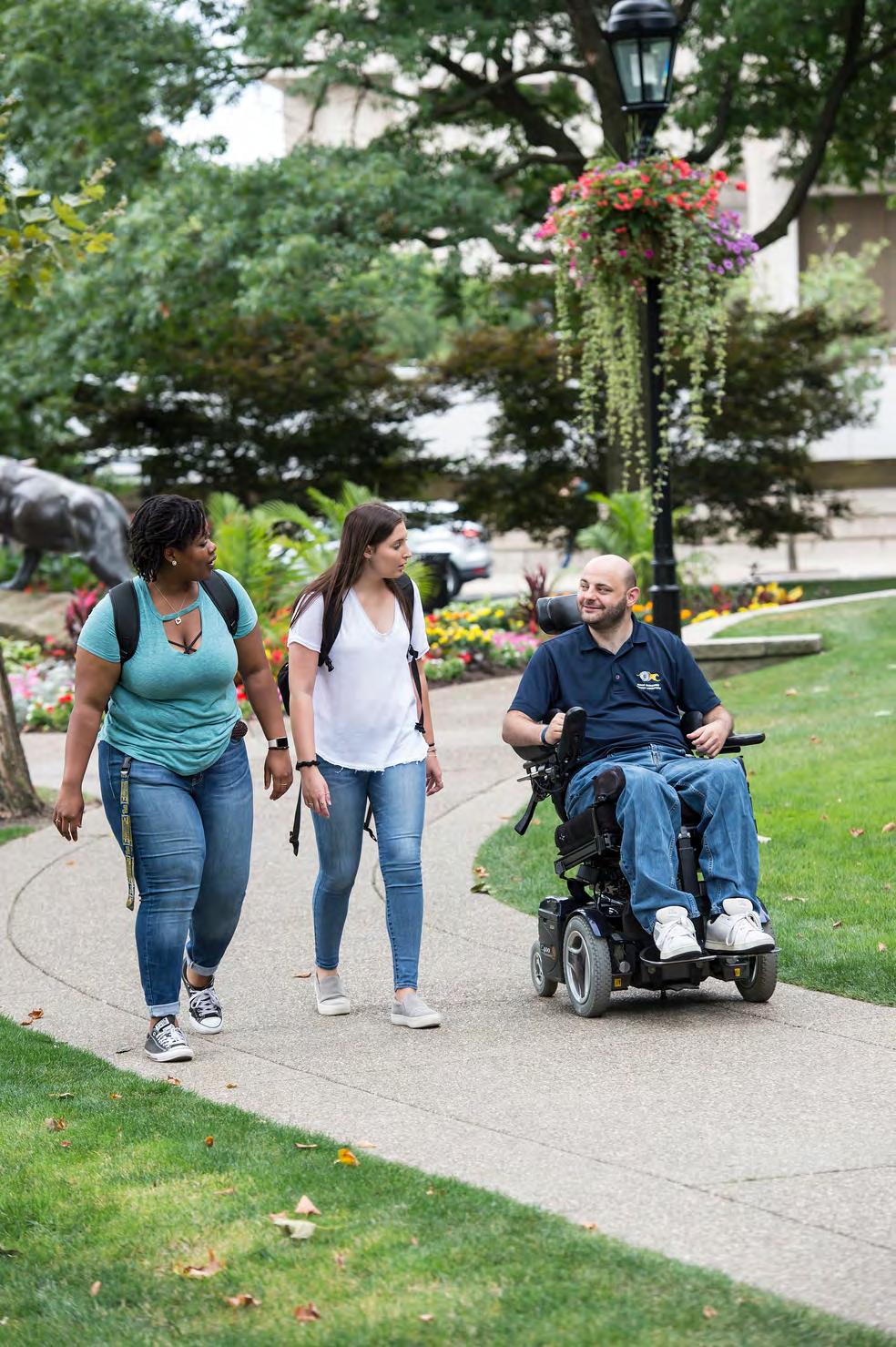
HEALTH & WELLBEING

EQUITY & ACCESS

ENGAGEMENT & AWARENESS


FOOD SYSTEMS
CITY & REGIONAL CONNECTIONS

73
ENGAGEMENT & AWARENESS

We weave a culture of sustainability into the everyday fabric of our campus and community.
2018 PITT SUSTAINABILTY PLAN GOALS
Survey: Create and deploy a comprehensive campus survey on student, staff, and faculty sustainability literacy by 2020.
Students: Incorporate the tenets of sustainability into all student programming.
Training: Train all staff (incoming and retained) on how to infuse the tenets of sustainability into their everyday work at Pitt.
Employees: Create an online sustainability education module for staff. Teamwork: Develop departmental Green Teams.
Celebrate: Share our stories of impact as leaders on a national scale and promote our model of sustainability.
Where We Are: Sustainable Literacy & Culture
Pitt’s first sustainability culture survey was distributed in 2017 as part of the development of the 2018 Pitt Sustainability Plan.
In Spring 2020, Pitt’s Office of Sustainability administered the second Pitt Sustainability Culture Survey, embedded in the first of a new triennial Pitt Sustainability Literacy & Culture Survey Simultaneously assessing Pitt community members’ sustainability knowledge, practices, opinions, and preferences, the 2020 survey had 1,033 respondents across all five University of Pittsburgh campuses.
Sustainability Literacy: In the 2020 survey, 92% of respondents answered 50% or more of the 20 sustainability literacy questions correctly, but only 43% of survey takers answered 75% or more of the questions correctly. Knowledge gaps existed about climate change, poverty, and the Sustainable Development Goals; these results helped the Pitt Sustainability team focus educational efforts from 2020 forward.
Sustainability Culture: In the 2020 survey, 51% of respondents agreed that Pitt was a leader in sustainability practices relative to other universities; this response was a notable increase from 2017, when only 30% of people choose to “agree” to “strongly agree” that Pitt was a leader in sustainability practices compared to other universities. Other 2020 sustainability culture survey responses informed development of campus-wide sustainability efforts, including the creation of the Sustainability Professional Certificate program for employees and the 2022 Pitt Climate Action Plan
Reflecting its triennial schedule, the next Pitt Sustainability Literacy & Culture Survey will be delivered in Spring 2023.
Sustainability Literacy Survey

Goal: Create & deploy campus survey on student & employee sustainability literacy by 2020.
Where We Are: Survey deployed in 2020; triennial future deployment
74
2018-22 Progress Report on Pitt Sustainability Plan
Where We Are: Campus Culture
Pitt Green Guides: Though the first official Pitt Student Green Guide was published in 2017, Pitt’s Student and Employee Green Guides were embedded into the Pitt Sustainability website in 2020. These interactive and dynamic resources combines information from across the University, allowing Pitt community members to easily and actively engage in Pitt’s thriving culture of sustainability.

Pitt Green Events: The University of Pittsburgh’s Pitt Green Event program was started in 2016 by the Student Office of Sustainability, supporting events that utilized zero waste and other sustainable event strategies. From Fall 2018 through Spring 2020, the Pitt Green Event program tracked 193 self-identifying Pitt Green Events, attended by 45,134 attendees. Due to the global Covid-19 pandemic, no Pitt Green Events were tracked from Summer 2020 through Summer 2021.
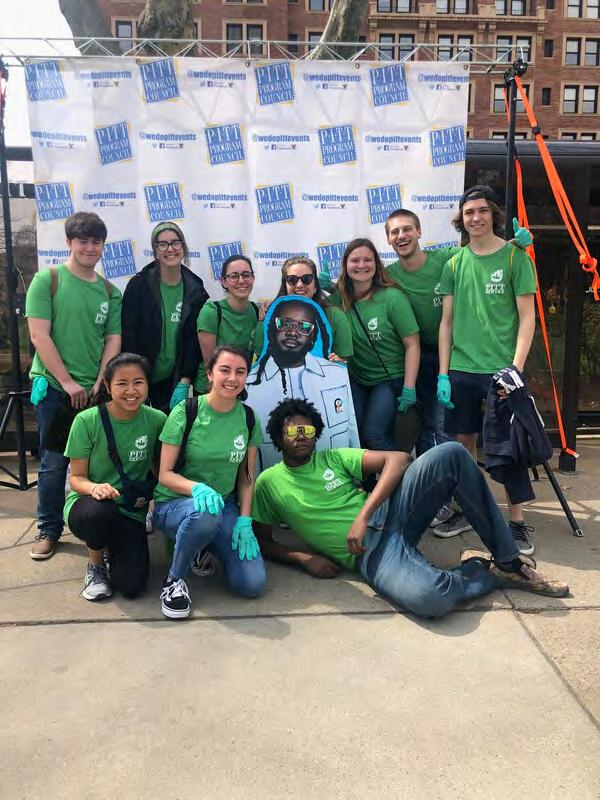
Pitt Green Host: In Fall 2022, the Pitt Green Event designation evolved into a new Pitt Green Host format to allow green events to proliferate more broadly and quickly across the University. The Pitt Green Host program trains employees and students on how to host a green event from conception to execution by providing education about and access to information on sustainable purchasing practices, zero waste principles, and accessibility. Successful candidates gain access to the Pitt Green Host community and sustainable event planning resources. In Fall 2022, the Pitt Green Host designation was piloted with over 75 employees and students becoming Pitt Green Hosts.
Pitt Green Ambassadors: Being piloted in 2022-23, Pitt Green Ambassadors is a peer-education program that embeds sustainability throughout the University regardless of department, campus, or areas of expertise. Individuals who have successfully demonstrated their knowledge of Pitt’s Sustainability commitments, strategies, and programs sign up to help educate and train their peers on sustainability at Pitt and off-campus.
2018-22 Progress Report on Pitt Sustainability Plan 75
Where We Are: Student Engagement

Student Office of Sustainability: Founded in 2014 by Student Government Board, Pitt’s Student Office of Sustainability (SOOS) is a unique student-led unit in Student Affairs. With 20+ affiliated student organizations, SOOS leads coordination of student sustainability activities oncampus and supports the potential of students to creatively revolutionize the way the Pitt community approaches environmental and social justice. Since 2015, the SOOS team has grown to include 7 student leaders and a staff lead working to engage students in sustainability programs and help raise awareness about Pitt’s sustainability progress.
Pitt Green Fund: The student-run Pitt Green Fund finances and supports student-initiated projects and programs that make Pitt’s operations more environmentally sustainable, socially equitable, and energy efficient. Piloted by Pitt’s Student Government Board in 2010, the Pitt Green Fund was formally created in 2011 with student activity fee-based funding as the “Green Fund Advisory Board.” From 2018 through Fall 2022, Pitt Green Fund invested $34,249 in 56 projects including, but not limited to, menstrual equity; solar picnic tables; composting programs; and internships focused on diversity, equity, and inclusion.
Pitt EcoReps:
In 2019, the University of Pittsburgh established the Pitt EcoReps program to promote a culture of sustainability within residence halls. Pitt EcoRep students work with members of the Pitt community to integrate sustainability into the residence hall culture by reducing energy and water use, increasing recycling and composting, and advancing other sustainability initiatives. Pitt EcoReps lead the deployment of Pitt Green Resident & Floor designations.
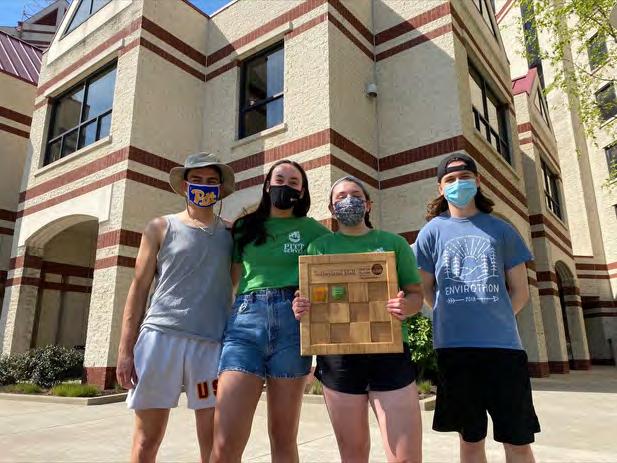


Pitt Green
Residents
& Floors:
Launched in 2018, the Pitt Green Resident and Green Floor designations engage students living in residence halls to examine their everyday practices via a self-assessment and encourages them to adopt sustainable behaviors. From 2019 through 2022, the Pitt Green Resident program had 3,444 participants, of which 1,590 students gained the Pitt Green Resident designation (including 254 students in Fall 2022). From 2019 through 2022, 5 residence hall floors earned Pitt Green Floor distinctions when 50% of their residents earned Pitt Green Residents designations.

2018-22 Progress Report on Pitt
Plan 76
Sustainability
Where We Are: Employee Engagement
Since 2018, several Pitt divisions have created official “green teams” including Athletics, Hospitality, Student Affairs, and the University Stores. Most offices, departments, and divisions engage with sustainability through University-wide “Pitt Green” programs (all launched since 2017).



Pitt Green Offices: First piloted in 2018, the Pitt Green Office designation became a University-wide offering in 2019. Through 2022, there were 54 Pitt Green Offices across 4 achievement levels (Seed, Sprout, Sapling, and Sustainable Oak). The Pitt Green Office assessment helps offices evaluate their practices relating to energy, food, transportation, printing, purchasing, waste, and their culture of sustainability. Pitt’s Office of Sustainability provides follow-on guidance to help offices grow to the next level of achievement.
Pitt Green Laboratories: Piloted in 2019, the Pitt Green Laboratory designation provides Pitt laboratories an opportunity to assess their current operational practices and earn recognition across 4 achievement levels. Similar to the Pitt Green Office program. To date, 22 labs have achieved a Pitt Green Lab designation across a variety of disciplines; their actions are building a thriving culture of sustainability and help inform the University’s Sustainable Laboratories Committee.
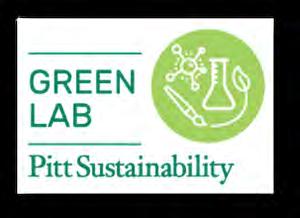
Where We Are: Online Employee Learning

The original Pitt Sustainability Plan employee educational goals were both narrowly focused on developing online employee sustainability education and broadly fixed on infusing the tenets of sustainability into the everyday work of existing and incoming Pitt employees. Reflecting the intent of these goals, the following 2018 through 2022 achievements demonstrate a variety of Pitt employee educational experiences relating to sustainability:
Pitt Sustainability Employee Orientation Video: In April 2019, a Business and Operations Emerging Leader project developed the first Pitt Sustainability employee orientation video. It has been shown from April 2019 through the present, reaching approximately 6,830 new hires through February 2022.
2018-22 Progress Report on Pitt Sustainability Plan
77
Pitt Green Home Office Challenge: Launched in 2020, the Pitt Green Home Office Challenge helps employees support Pitt’s culture of sustainability while working remotely. From 2020-2022 203 employees have accepted the Challenge, collectively avoiding over 1.3 million pounds of CO2e through sustainable practices in their home offices. While not an official online learning module, the Green Home Office Challenge helps Pitt employees think holistically about their home workspaces and incorporate small changes to be more sustainable when working from home.
Virtual Events: During the Covid-19 pandemic, the Pitt Sustainability team hosted Green Home Office Lunch & Learns to engage the Pitt community on sustainability topics. Recordings from these sessions are available on the Pitt Sustainability YouTube page, which also includes curated video playlists on a multitude of sustainability topics to help individuals learn about energy, climate change, ecology, economy, environmental justice, and more. Several sustainability-focused events still offer all or partial virtual attendance options, making them more accessible across the University and to external partners.
How You Can Help: With the launch of the Pitt Climate Action Plan in 2022, answers the number one question we get from Pitt employees: “ Pitt and the world advance toward carbon neutrality?” While the University itself is making big sustainability decisions, individual actions also make an imperative difference at Pitt, at home, and around the world. Resources include, but are not limited to, active and shared commuting options, home energy efficiency, and retirement investments considering sustainability-related criteria.
Where We Are: Professional Development


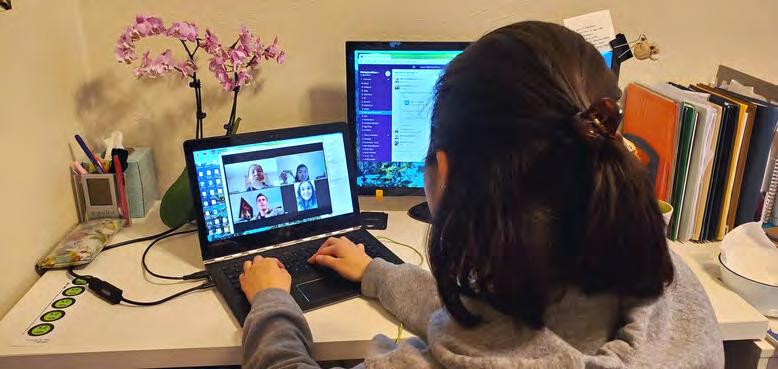
Employee Sustainability Professional Certificate: A professional development opportunity for Pitt employees through the Office of Human Resources’ Faculty and Staff Development Program, the Sustainability Professional Certificate helps participants gain knowledge to apply core sustainability principles and create solutions throughout their career that balance equity, environment, and economy. To earn the certificate, employees take 6 professional development classes offered by the Pitt Sustainability team. The first “Sustainability Foundations” class was taught in 2021 and the first certificates earned in 2022. From October 2021 to December 2022, 187 employees attended at least one class and 19 individuals completed the certificate from 17 different University departments.
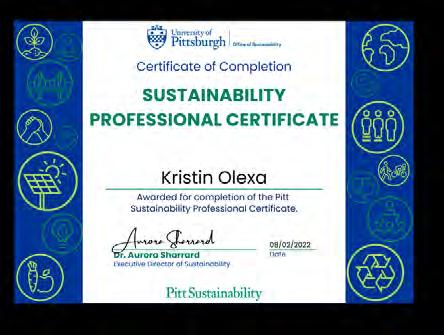
2018-22 Progress Report on Pitt Sustainability Plan 78
Where We Are: National Collaborations
AASHE: Since 2017 the University of Pittsburgh has been a proud member of the Association for the Advancement of Sustainability in Higher Education (AASHE), the primary national professional association for higher education sustainability professionals and students. To share sustainability successes with our national peers, Pitt Sustainability team members, students, and collaborators regularly present at AASHE’s annual conference and interact on AASHE Connect, a very active online member community to which all Pitt students and employees have access, thanks to our University-wide membership. Pitt’s Executive Director of Sustainability, Dr. Aurora Sharrard, also serves on AASHE’s Advisory Council.
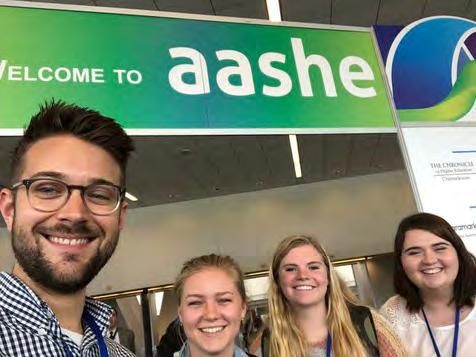
Second Nature: National nonprofit Second Nature manages the Presidents’ Climate Leadership Commitments, formal commitments signed by over 440 college and university presidents committing to carbon neutrality and/or climate adaptation. Subsequent to Pitt’s 2020 commitment to carbon neutrality by 2037, University staff and faculty have been engaged via Second Nature with other higher education institutions with similar commitments. This engagement includes presenting at Second Nature conferences and webinars and engaging in Working Groups on commuting and strategy. In 2020, Pitt also received a Second Nature Acceleration Fund to support the Oakland Energy Master Plan.
Post Landfill Action Network: The University of Pittsburgh is also a member of national nonprofit Post Landfill Action Network (PLAN); through this collaboration, Pitt students get unlimited access to PLAN zero waste manuals, resources, and digital trainings.
Where We Are: Sharing Our Impact
The University of Pittsburgh is committed to sharing the story of Pitt’s sustainability journey and empowering our community and others to incorporate sustainability into their decision making and daily lives. From 2018 through 2022, the Pitt Sustainability team reached over 11,600 individuals with over 240 trainings, presentations, tours, and events. Over that same time period, Pitt sustainability initiatives were featured in over 240 national, regional, local, and campus media articles.

Monthly Newsletter: Since February 2019, a monthly Pitt Sustainability newsletter has helped keep Pitt community members informed about University and local sustainability achievements, news, programs, events, job opportunities, and more. Pitt community members, external partners, and alums opt into the newsletter

2018-22 Progress Report on Pitt Sustainability Plan 79
Pitt Sustainability Online: In 2018, Pitt launched its Sustainability website, offering the Pitt community an up-to-date platform to learn about the Pitt Sustainability Plan, cross-campus sustainability news, achievements, reports, and more. Refreshed in 2022, the site has thousands of annual visitors from all over the world. Across the University, over 54,000 webpages reference “sustainability.”


Pitt Sustainability reaches additional audiences through various social media accounts created since 2018. New content is consistently created for the thousands of followers on Twitter, Instagram, and YouTube.
On-Campus Connections: While the original intent of the Pitt Sustainability Plan goals in this section is focused on internal education and external awareness, creating a University culture with sustainability as a core value is vital to actively advance. Pitt Sustainability regularly hosts events cultivating this culture. One example is Pitt Green Speakeasies, which brings faculty, staff, and graduate students from across the University together to share research and foster relationships across schools and departments that leads to collaboration and interdisciplinary work.
Every Fall and Spring semester, the Pitt Student Sustainability Symposium is highlights undergraduate student sustainability projects from two courses. Each Spring, Pitt Sustainability Awards are also presented at this event, recognizing Pitt students, faculty, and staff that utilize their talents and leadership to contribute to the culture of sustainability at Pitt. The event is open to the Pitt community and public, helping create an inclusive space for an open dialogue about sustainability both on- and off-campus.

2018-22 Progress Report on Pitt Sustainability Plan 80
EQUITY & ACCESS
We will continue to engage across campus to ensure that we are providing access and opportunity to all members of the Pitt community.
2018 PITT SUSTAINABILTY PLAN GOALS
Basic Needs: Strive to create a resource net for incoming students that will allow us to proactively meet our students’ physical, social, financial, and mental health needs.
Purchasing: Integrate the tenets of sustainability into the University’s procurement policies and guidelines.
Investing: Form a committee or task force to consider socially responsible investing, to be composed of faculty, staff, student, and administration representatives.

Equity: Work across all impact areas of the Pitt Sustainability Plan to ensure benefits for all within the Pitt community.
Where We Are: Basic Needs
Campus Basic Needs Committee: Established in 2020, the University of Pittsburgh’s Campus Basic Needs Committee was created to understand, communicate, and advocate for students’ basic needs and create resources to ensure student success.
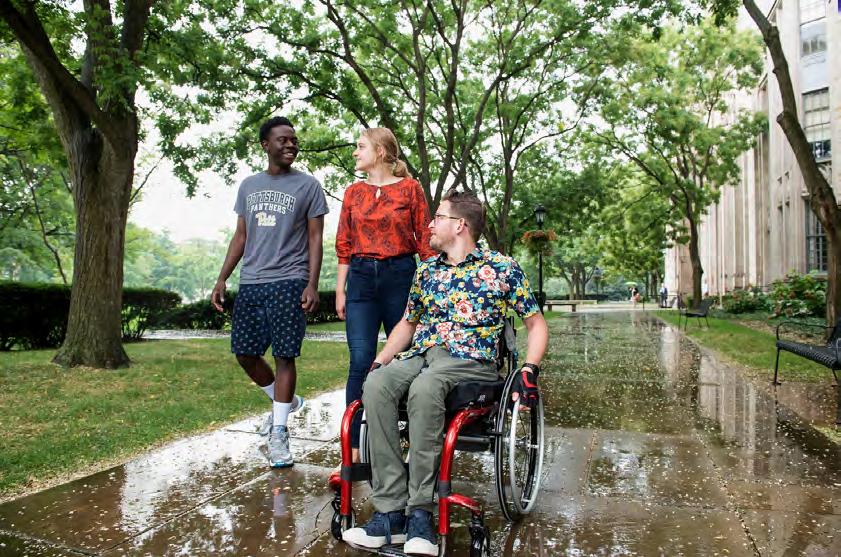

Real College Survey: In Fall 2020, Pitt partnered with the Hope Center for College, Community, and Justice at Temple University to administer the #RealCollege survey. This survey gathers information on the lived experiences of today’s students outside of the classroom. This highly regarded survey is the largest annual assessment of students’ basic needs in the country. Results revealed that 43% of students experience at least one form of basic needs insecurity, and 54% of students experiencing these insecurities didn’t apply to campus support programs because they didn’t know how to. Read Pitt’s full #RealCollege report and find resources that help address basic needs on campus.

2018-22 Progress Report on Pitt Sustainability Plan 81
Case Study: Pitt Pantry


Established in 2015, the Pitt Pantry is a critical part of meeting the Pitt community’s basic needs; its mission is to ensure that all members of the Pitt community have regular access to a balanced and nutritious diet. Newly relocated to the O’Hara Student Center in Fall 2022, the student-run Pantry has served 1,355 visitors between 2018 and 2022. In FY22, the Pantry had 974 visits from 387 shoppers, ~66% of which were graduate students, 31% undergraduates, & 3% employees.
Basic Needs Recommendations: Following on Pitt’s 2020 Real College survey, the Campus Basic Needs Committee made internal recommendations in 2022 that are currently being implemented by Student Affairs’ Wellness team. Authored by cross-departmental Committee members, suggested interventions and opportunities address student needs relating to mental health, food security, housing, employment, childcare, and communications.
Hunger Free Campus: For meeting both basic and innovative steps to address student hunger, Pitt was designated a Pennsylvania Hunger-Free Campus+ in 2023. The designation keeps the University eligible for future grants in addition to its 2023 PA Hunger-Free grant.
Basic Needs Library Guide: In 2017, staff and student leaders from across campus collaborated with the University Library to create a campus-wide basic needs resource guide to be distributed through various student service centers, social media, and newsletters. The guides include Pitt and community-based resources for food, housing, employment, financial security, academic-related expense assistance, and more. Updated in 2018 and 2019 with cross-campus input, the guide’s content is influenced by data from the annual Hope Center for College, Community, and Justice Report, which is used to identify gaps between student needs and resource availability.
Emergency Meal Assistance: Created in 2020, Pitt’s emergency meal assistance program offering was critical to helping alleviate food insecurity across campus. In FY22 alone, the program provided over 9,000 meals to 602 students, including $7,500 in external grant support from Greater Pittsburgh Community Food Bank.
Thriftsburgh Reuse Rummage Sale: Started in 2018, the annual Thriftsburgh Reuse Rummage Sale provides affordable pre-owned clothing, dorm essentials, home goods, and furniture to Pitt students. In Fall 2022, the Thriftsburgh Reuse Rummage Sale had its largest year yet, with 4 days of sales helping rehome 7,160 pounds of items.

2018-22 Progress Report on Pitt Sustainability Plan 82
Where We Are: Equitable Access

Digital Equity & Accessibility: Adopted in 2020, Pitt’s Electronic & Information Technology Accessibility policy established standards for accessibility in digital environments. As a result, since 2020, Pitt websites have become 25% more accessible, with 63% of all Pitt-hosted websites meeting the industry benchmark for accessibility. Pitt provides courses and resources to help University stakeholders advance University’s accessibly in digital environments and stay up-to-date on technology advances.
Pitt IT is a leader in the University's efforts to help bridge the digital divide by providing access to affordable broadband, effective technical support, computer skills and digital literacy, and quality computing devices.
In 2022, the Pittsburgh Digital Equity Coalition was named Technic.ly’s “Community Leader of the Year.” The Commission is a collaboration of several organizations seeking to address inequity in technology accessibility through Pittsburgh communities; the University of Pittsburgh is a proud member.
Menstrual Equity: Campus-wide education about menstrual equity is a collaborative effort supported by many student organizations. In 2022, a SOOS-led case study took first place in the 2022 Campus Race to Zero Waste “Education & Awareness” category for student-led menstrual health equity efforts partnered with Pitt EcoReps, Pitt Planned Parenthood, and Free the Planet. The case study describes a Spring 2022 Pitt Zero Waste Period program at Pitt addressing the short- and longterm environmental and health impacts of disposable and reusable products, menstrual health, period poverty, and equity – and distributing reusable products to students.
Pitt’s Days for Girls student organizational chapter of the international nonprofit is working to advance menstrual equality globally through education and sustainable menstrual products. The Pitt chapter focuses fundraising for sustainable feminine hygiene solutions in developing economy countries and education about women's health on-campus.
Success Story: Menstrual Product Access & Reusability


Beginning in 2019, Pitt Planned Parenthood and the Student Office of Sustainability (SOOS) partnered to purchase and distribute 400 reusable menstrual cups and 46 menstrual pads. In addition to avoiding waste, the effort makes reusable menstrual products more visible and financially accessible to students. Continuing to make menstrual products more accessible on-campus, 44 dispensers providing free, single-use period products have been installed across campus from 2019 to present in 17 buildings, including in men’s restrooms in Barco, Towers, and Sutherland.



2018-22 Progress Report on Pitt Sustainability Plan 83
Campus Recreation: In 2022, Pitt’s Wellness team reviewed existing facilities to ensure an accessible and inclusive environment. In fitness areas across campus, updated signs and labels promote clean and organized fitness spaces with a more welcoming and inclusive environment in free weight areas. Campus Recreation is also piloting a program for specialized times and fitness spaces for gender neutral and female communities. Signage and wayfinding for gender neutral restrooms in fitness areas is in the process of being updated.


Where We Are: Diverse & Local Purchasing
Diverse & Local Purchasing: Pitt’s historic goal was to purchase 10% of non-construction goods and services from diverse businesses. In 2022, the University exceeded this goal and set a more ambitious target of 15% diverse non-construction procurement by 2025, with a sub-goal of spending 5.5% of non-construction expenses with Black-owned companies by 2025. Previously, the University spent ~2.5% of its annual non-construction dollars with Black-owned companies.
In addition, Pitt has launched a Buy/Build/Hire Local initiative to fuel economic development throughout the region by using our position as an anchor institution to benefit local communities. The Buy Local component helped set an additional goal to procure at least 45% of non-construction goods and services from Southwestern Pennsylvania by 2025. Pitt’s partnership with a Pittsburgh-based organization helping Black-owned businesses scale up also strategically increases the University’s ability to engage local Black-owned companies in requests for proposals.
One of Pitt’s largest minority-owned suppliers is SUPRA Office Solutions (a minority-owned business based in Philadelphia) who has partnered with ODP Business Solutions (formerly Office Depot) since 2014. Other key regional minority-owned business suppliers include Zoltun Studios (graphic design), Affordable Linens (special linens and laundering services), and Movin’ on Up Laundry Services (collaborating with Dining).
2018-22 Progress Report on Pitt Sustainability Plan 84
Where We Are: Environmentally & Socially Responsible Investing
The University of Pittsburgh’ has reviewed and discussed environmental, social, and governance (ESG) considerations for the University’s investments since the1970s, as outlined in the Board of Trustees’ Investment Committee’s governing documents.

Since 2018, several University committees and strategies have helped clarify and focus Pitt’s ESG efforts:
Goal: Form a committee to consider SRI, composed of employee, student, and administration representatives. Where We Are: 2018-19 SRI Committee report advanced campus dialogue.

2018-19: Socially Responsible Investment (SRI) Committee of Pitt faculty, staff, and students answered the Chancellor’s charge to explore and report on the potential impacts of SRI strategies on Pitt’s Consolidated Endowment Fund (CEF) investments.
2020: Pitt’s Board of Trustees (BOT) adopted a SRI Screening Process for how the University should consider proposed CEF investment exclusions. University’s Office of Finance released its ESG Policy for the CEF.
2020-21: Pitt’s BOT activated the SRI Screening Process and created the 2020-21 Board of Trustees Ad Hoc Committee on Fossil Fuels, whose report on “whether, to what extent, and via what methods the University, in its Endowment, should consider divestment from fossil fuels in existing and/or future investments” was adopted in full by the BOT in February 2021, including the following actions:
Choose to not apply a negative screen to the CEF with respect to fossil fuels. Apply University’s ESG Policy to every investment decision. Develop and implement a strategy to seek investments that help reduce, avoid, and eliminate greenhouse emissions. Monitor and report on the CEF’s current and projected exposure to fossil fuel investments.
Publish an annual ESG Report highlighting how ESG has been applied to the CEF while ensuring strong financial returns while updating fossil fuel investments.
2022: University released its first ESG Report (for fiscal year 2021), hosted on a brand new CEF webpage
In an effort to increase transparency regarding the CEF and application of the ESG policy, enhance awareness about the CEF, and advance dialogue on this important topic, Pitt’s new Chief Investment Officer is regularly meeting with key student leaders and speaking at various University forums.
Pitt does not currently have a separate SRI or ESG Committee. All CEF investment decisionmaking is governed by the BOT’s Investment Committee (including Trustee members, and faculty, staff, and student reps) and the Office of Finance.
2018-22 Progress Report on Pitt Sustainability Plan 85
Where We Are: Sustainability + Diversity, Equity, & Inclusion
Pitt is dedicated to helping build a world-class model of diversity, equity, and inclusion (DEI) defined by inclusive academic excellence and an environment that allows everyone to succeed. Equity is a key pillar of sustainability, and the examples below represent just a few efforts overlapping DEI and Sustainability.

Annual Pitt Diversity Forum: Since 2020, the University of Pittsburgh has hosted a free Diversity Forum that works to equip thousands of participants with the knowledge, skills, and resources to dismantle systems of oppression. The Pitt Sustainability team has worked with OEDI to help curate content and speakers annually focused on environmental justice, climate justice, and equitable communities.
Indigenous Community Collaborations: In September 2022, the University of Pittsburgh hosted its first annual Indigenous Cultural Festival in partnership with the Council of Three Rivers American Indian Center (COTRAIC) and Pittsburgh Parks Conservancy. This week-long celebration highlighted our region’s indigenous traditions, knowledge, and history.
In 2022, the University also launched its first Indigenous Community Engagement Committee, tasked with helping Pitt become a higher education leader in recognition and inclusion of the diverse and unique histories and cultural identities of indigenous people. While many departments honor indigenous cultures with their own land acknowledgement, an official University of Pittsburgh land acknowledgement is in development in partnership with local indigenous groups.

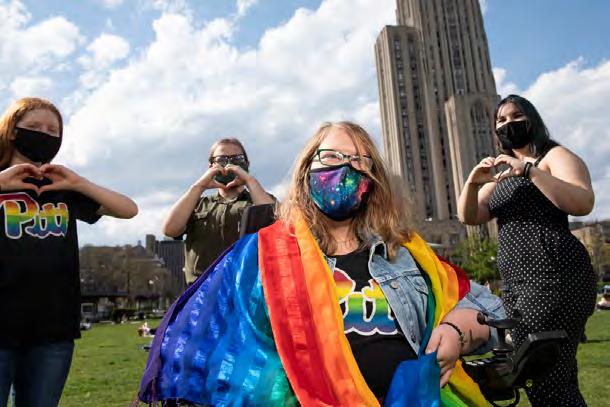
2018-22 Progress Report on Pitt Sustainability Plan 86
Case Study: Pitt Sustainability Land Acknowledgement
We recognize that the University of Pittsburgh occupies the ancestral land of the Adena culture, Hopewell culture, and Monongahela peoples, who were later joined by refugees of other tribes (including the Delaware, Shawnee, and Haudenosaunee), driven here from their homelands by colonizers.
We honor these traditional Native inhabitants of this place and uplift their historic, unique, and enduring relationship with this land, which is their ancestral territory. We pay our respects to their Elders and their past, present, and future people, community, and culture.


While we cannot change the past, we commit to continued gratitude for the gifts of nature, along with ongoing respect, care, and stewardship of the land, each other, and future generations.
Where We Are: Environmental Justice
Pennsylvania Environmental Justice Workshops: In April 2021, the University of Pittsburgh supported Urban Kind Institute and Breathe Project in forming the Southwest Environmental Justice Community Hub, which engaged with the Pennsylvania Department of Environmental Protection about regional environmental justice issues and concerns. Pitt helped co-facilitate the “Environmental Justice in Pennsylvania” workshop, which gathered community input to help inform government officials and statewide new policies.
Faculty Environmental Justice Focus: Started in 2021,a Mascaro Center for Sustainable Innovation Faculty Task Force subcommittee focused on environmental justice and how Pitt can engage on this important topic through research and community engagement. The faculty-led group has several educational and research collaborations with Engineering, Geology, History, Public Health, and others. Most recently, the group submitted a training grant proposal on environmental justice that is under review by the National Science Foundation.
CHEER Research: The Center for Healthy Environments and Equity Research (CHEER) is a multidisciplinary, intersectional, and community-based environmental health research program focused on identifying and addressing environmental health disparities, which have a major impact on the health and well-being of individuals and communities. With 2022 Pitt Momentum Funding, CHEER is coordinating faculty, students, and community partners to create research that addresses extensive environmental health disparities across our region, the nation, and beyond.
SOOS Environmental Justice Collective: Created in 2022, the Student Office of Sustainability is working to elevate black, indigenous, and people of color (BIPOC) voices while removing actual and perceived participation barriers in environmental organizations, clubs, and majors. The SOOS EJ Collective is helping raise awareness in the Pitt community about environmental justice issues through partnership with local organizations and educational campaigns.
2018-22 Progress Report on Pitt Sustainability Plan 87
FOOD SYSTEMS

We strive to build food systems that support a healthy body and a healthy planet, strengthen local communities, and minimize waste.
2018 PITT SUSTAINABILTY PLAN GOALS
Procurement Support a local, fair, ecologically sound, and humane food system by expanding the Real Food Challenge across campus to serve 25% Real Food by 2025.
Plant-Forward: Serve meals that put plants at the center of the plate by decreasing the amount of animal-derived products sold by 25% by 2025 (from 2017 baseline).
To-Go Meals: Serve 50% of to-go meals in reusable containers by 2025.
To-Go Drinks: Serve 50% of to-go beverages in reusable containers by 2025.
Where We Are: Expanding Vision
Pitt Eats Sustainability: Since becoming Pitt’s dining contractor in 2020, Chartwells has instituted several new sustainability initiatives impacting the 30,000 meals served on campus daily. Though not addressed by the original Pitt Sustainability Plan goals, these strategies reflect the University’s intention to provide students and employees with more sustainable and healthy food on-campus that also strengthens our communities and environment.Examples include:
Achieving 4 Sustainable Pittsburgh Restaurant certifications & 6 Live Well Allegheny designations for campus dining locations; Growing hyperlocal herbs and leafy greens using on-campus hydroponic growing units; and Serving Fair Trade Certified coffee and chocolate in coffee shops across campus.
Where We Are: Food Sourcing
Real Food Challenge: Pitt participates in the Real Food Challenge (RFC), a national initiative to source more local and sustainable foods throughout campus dining. “Real Food” is defined by RFC according to a standard that includes 4 categories: local, fair, ecologically sound, and humane foods. For FY22, the University purchased 14% “Real Food” across all dining locations (an increase from 10% in FY19 and 21).
10% of all FY22 purchases were local and community-based. This includes products and producers who are within 250 miles of Pitt, are small- or mid-sized for their market, and are independently or co-operatively owned. These producers included Bauman Orchards, Fifth Season, Jubilee Hilltop Ranch, and Turner Dairy.
14%
Procurement: Real Food Challenge
Goal: Serve 25% Real Food on campus by 2025
Where We Are: 14% Real Food purchased; 10% of all purchases local/community based
2018-22 Progress Report on Pitt Sustainability Plan 88
Cool Food Pledge: In 2019, the University of Pittsburgh was one of the first 3 universities worldwide to join in the global Cool Food Pledge to cut food-related greenhouse gas (GHG) emissions by 25% by 2030 (a level of ambition in line with the goals of the Paris Climate Agreement developed by the World Resources Institute (WRI).


Since joining the Cool Food Pledge, Pitt has used this science-based target as our primary performance measure for the Pitt Sustainability Plan’s original goal to “Serve meals that put plants at the center of the plate by decreasing the amount of animal-derived products sold by 25% by 2025 (from 2017 baseline).”
For calendar year 2021, Pitt’s food-related GHG emissions were 15.5% below our 2017 baseline, with GHG emissions “per plate” (i.e., per 1,000 kcal) down 25% from our 2017 baseline. For CY21, Pitt performed better in GHG emissions per plate than both the average North American diet and other higher education Cool Food Pledge members.



Working with WRI to calculate foodrelated GHG emissions has also enabled Pitt to include food purchases in the University’s annual GHG inventory. Pitt’s FY21 GHG inventory revealed that food purchases accounted for 1.7% of the University’s GHG emissions (more than paper, refrigerants, solid waste, and wastewater combined).
Case Study: HowGood on Menus
In Fall 2022, Pitt Eats took Pitt Cool Food goals to menus across campus, introducing climate labeling to our dining halls, so students can see which meals have lower relative social and environmental impacts with the HowGood system.

Delicious climate-friendly menu options on-campus include items such as Beyond Bolognaise, Baharat Roasted Carrots, Palestinian Fattoush, Saffron-Laced Moroccan Tagine, Jerk Cauliflower Roti, Curried Chickpea Hash, Roasted Moroccan Chickpeas, Ratatouille, Zatar Roasted Cauliflower and Chickpeas. Wicked Pie and Pom & Honey also feature plant-forward menus.
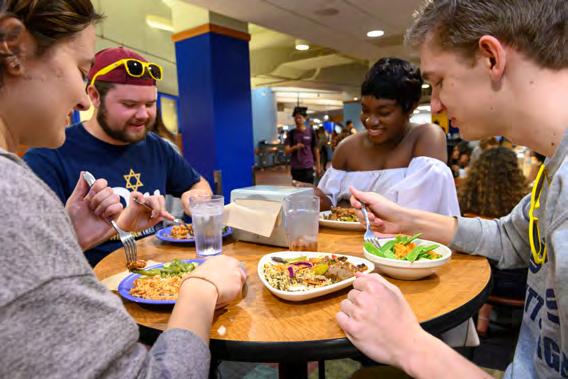
2018-22 Progress Report on Pitt Sustainability Plan 89
Sources: Emission factors from Poore and Nemecek (2018) (agricultural supply chain) and Searchinger et al. (2018) (carbon opportunity costs.) GHG equivalency to passenger vehicles from EPA (2021) and assumes 4.63 tCO2e/vehicle/year. Top graph shows only mandatory animal and plant proteins counted in the Cool Food Pledge for comparability across members.
Farmers Market : Since 2015, Pitt has hosted weekly seasonal farmers markets in the William Pitt Union Plaza to connect local, small business food vendors with the Pitt community. Through 69 markets, Pitt community members have spent more than $160,000 in direct campus tender (i.e., dining dollars, Pitt Cash, and Panther Funds) at 34 local vendors.*
Over 7 years, the Pitt Farmers Market has generated an estimated $500,000 in economic impact for Allegheny County’s food systems. Pitt’s Farmers Market is one of a very few campus markets nationally that allows campus tender to be used for market vendors.
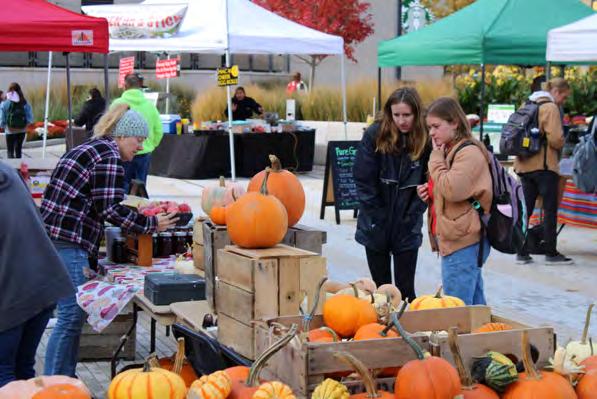


Pitt Farmers Markets have also provided opportunities for small local and minority-owned businesses to establish their businesses and even sell products through campus stores. Millie’s Homemade Ice Cream was able to grow their business as a Pitt Farmers Market vendor before operating a scoop shop in Oakland.
Pitt Eats Local: In 2020, an expansion of meal plan vendors enabled $772,000 in Dining Dollars to be spent at off-campus eateries by students, supporting local restaurants during the COVID19 pandemic recovery.
Where We Are: Zero Waste Dining Behind the Scenes
While many aspects of the University’s materials diversion practices are visible, quite a few zero waste dining practices occur behind the scenes in kitchens and prep areas.
Pre-Consumer Food Waste Diversion: In Fall 2019, preconsumer food waste collection was deployed across campus kitchens for composting, with 21.3 tons of organic waste collected from Pitt kitchens for FY22. Kitchen scraps, coffee grounds, and other inedible organic waste were collected through a partnership with a local compost hauler. In August 2022, our small business partner closed, requiring a temporary pause on compostable collection from kitchens until a new vendor is found.
Cooking Oil: Pitt has collected and recycled cooking oil from all campus facilities for quite a long time. From Fall 2020 through Summer 2022, Pitt Eats recycled 31,179 pounds of cooking oil.
31,179
Pounds of cooking oil recycled (FY20-22)
*Most vendors generate less than half of sales from campus tender.
$772,000
Dining Dollars in support of local restaurants (FY20-22)
107,938
Meals donated to hunger-fighting agencies (FY14-22)
2018-22 Progress Report on Pitt Sustainability Plan 90
Food Recovery: Led by student group Food Recovery Heroes, the University of Pittsburgh has been recovering and donating surplus food from campus dining facilities since 2014. From 2014 through September 2022, Pitt has donated nearly 130,000 pounds of surplus food to local hunger-fighting agencies, or approximately 107,938 meals recovered. Food Rescue Heroes and Pitt Eats partner with 412 Food Rescue and the Greater Pittsburgh Community Food Bank to divert and track surplus food from campus.
In 2015, Pitt was the first school in the Atlantic Coast Conference to become a Food Recovery Verified campus. In 2018, Food Recovery Heroes won Pennsylvania Resource Council’s Zero Waste Excellence Award and were recognized by the U.S. EPA for their campuswide food recovery efforts.

During the COVID-19 pandemic, Pitt Eats adapted campus food recovery procedures to ensure the continuation of surplus food recovery from dining locations across campus, donating 77,000 pounds of food since 2020.

Where We Are: Zero Waste To-Go
BYO[Cup]: Pitt’s BYO[Cup] program was formally launched in 2016 to help serve 50% of to-go beverages in reusable containers by 2025. Between 2016 and 2022, the program prevented at least 91,610 single-use cups from ending up in landfills (a conservative number, as tracking this metric can prove difficult and the program paused for two years at the onset of the COVID-19 pandemic).
Zero Waste To-Go: BYO[Cup]
Goal: Serve 50% of to-go beverages in reusable containers by 2025.
Where We Are:
2% of to-go beverages were served in reusable containers, a 12% decrease from pre-pandemic rates
Due to widespread use of campus-wide hydration stations, it’s hard to accurately account for all togo beverages on-campus; however, pre-pandemic, University dining tracked reusable to-go beverages at 14%. Reflecting a return to a disposable ethos of the global pandemic, only 2% of to-go beverages served by Pitt Eats from campus-run coffee shops and retail dining locations in FY22 were in reusable containers. To expand reusable beverage container options campuswide, Pitt Eats launched a campus-wide Soda Stream subscription in Fall 2022.
2%
2018-22 Progress Report on Pitt Sustainability Plan 91
Choose to Reuse: The University of Pittsburgh launched its Choose to Reuse program in 2016. In 2018, the goal was set to serve 50% of to-go meals in reusable containers by 2025. In 8 years, 76,820 reusable containers have been exchanged on-campus, helping reduce 10 tons of single-use packaging. The Choose to Reuse program was paused for one year at the onset of the COVID-19 pandemic; tracking this metric has been difficult.

Slowed down by the COVID-19 pandemic, Pitt served 2% of all to-go meals in reusables in FY22. Though short of our interim goals, the Choose to Reuse program has experienced exponential growth -- and is now the only option for takeout dining from


Zero Waste To-Go: Choose to Reuse
Goal: Serve 50% of to-go meals in reusable containers by 2025.
Where We Are:


2% of to-go meals were served in reusable containers, a rate significantly impacted by the COVID 19 pandemic
The Eatery and Perch (Pitt’s residential dining locations). Returned containers each have the potential to displace more than 300 single-use containers in their lifetime.
Where We Are: Student Food Connections
Over the past several years, Pitt has introduced and advanced a multitude of opportunities for students to learn about and engage with sustainable food systems at Pitt and around Pittsburgh; many of those opportunities are described in the “Teaching & Learning” section of this report.
Food Ecosystems Scholar Community : In 2019, the Frederick Honors College launched a Food Eco-systems Scholar Community, now dubbed ScholarCHEF (Community, Honors, Ecosystems, Food) to connect students with faculty and community experts with a variety of expertise in food ecosystems. Partnering with Food21, ScholarCHEF is advancing agricultural, engineering, health, and business techniques to equitably grow local food's economic impact from farm to plate.
Success Story: Plant2Plate Student Garden
Run by students, Plant2Plate grew out of a 2009 student course project. As student-run produce gardens, the Plant2Plate student organization has a mission to connect community members with their food through hands-on learning. In 2021, the University hired the first paid Plant2Plate Garden Intern to help fulfill this mission and create more opportunities for the organization’s hundreds of volunteers, including expansion plans.
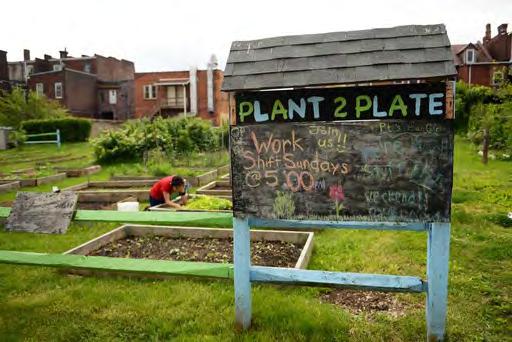
2%
2018-22 Progress Report on Pitt Sustainability Plan 92
HEALTH & WELL-BEING

We strive to enhance the physical and mental health of individuals as well as the quality of life of our campus community.
2018 PITT SUSTAINABILTY PLAN GOALS
Buildings: Embrace LEED and WELL Building certifications and WELL Communities for our built environment.

Space: Identify and improve the environmental quality of our indoor and outdoor spaces.
Movement: Support physical health through fitness access and active design principles.
Happiness: Support the mental health needs of our students, faculty, and staff.
Where We Are: Healthy Buildings
Certified Green Buildings: To date, Pitt has obtained the third-party LEED green building certification for 17 building projects totaling over 1.3 million square feet. All large University new construction and major renovation projects pursue LEED or better. LEED-certified buildings help enhance the health and well-being of the building’s occupants via increased ventilation, indoor air quality management plans, low-emitting construction materials, and access to daylight and views.

New Campus Recreation & Wellness Center: The Campus Recreation & Wellness Center will be a total health & wellness destination providing new campus connections & showcasing Pitt’s commitment to sustainability. In design since 2018, the Center is pursuing LEED certification with plans to open Fall 2024, providing 270,000 square feet of first-rate amenities and services that encompass all aspects of health and wellness. The Campus Recreation & Wellness Center embodies a holistic approach to support and enrich the student experience.

93 2018-22 Progress Report on Pitt Sustainability Plan
Success Story: Salk Hall

In 2023, renovations for Salk Hall achieved a LEED Platinum certification — the highest rating for the sustainable building system and a first for Pitt. The historic building (where Jonas Salk developed the polio vaccine) received upgrades to the existing structure and prioritized environmentally conscious efforts. The renovations reduced water consumption by 36.8% compared to similar buildings and reduced connected lighting power by 44.6%. Over 90% of construction waste was diverted from landfills. There are only 22 LEED Platinum buildings in Western PA, Pitt is one of only two universities to earn the distinction.

Pittsburgh 2030 District: The Pittsburgh 2030 District encompasses 550+ buildings aspiring towards measured high performance of 50% reductions in energy use, water consumption, and transportation emissions by the year 2030 while improving indoor air quality. The University of Pittsburgh was a Founding Property Partner of the Pittsburgh 2030 District’s Oakland boundary in 2014– and 2030 goals permeate the Pitt Sustainability Plan. From 2014 through 2018, Pitt also assisted District Partners in assessing indoor quality and helped create the foundations for the District’s Indoor Air Quality (IAQ) baseline. The University also participates in regular District-wide IAQ reporting and benchmarking.
Health Indoors: Pitt is working to help improve the health and well-being of community members through improved air quality. The quality of indoor air is monitored by Facilities via maintenance, occupants, and controls. Pitt also uses Aircuity systems to monitor and adjust indoor air quality and ventilation in over 125,316 square feet of space.
Indoor materials are covered in greater detail the “Materials & Waste” section.

Where We Are: Healthy Outdoor Spaces



Outdoor Spaces: University of Pittsburgh’s Pitt's Campus Master Plan and Institutional Master Plan explicitly address strategies to improve the quality of Pitt's outdoor spaces via open space, tree cover, mobility, planting improvements, and more.
Pitt is dedicated to increasing the quality of urban landscaping, including with design standards that promote preservation, conservation, and regeneration. Implemented in 2017, these guidelines are outlined in Facilities Management’s Sustainable Landscape Design Guidelines.

2018-22 Progress Report on Pitt Sustainability Plan 94
Utilizing sustainable landscape practices (such as the inclusion of rain gardens to mitigate storm water or planting of diverse and native flora) creates resilient environments with multiple benefits including but not limited to reducing heat island effects, improving air quality, and positively impacting mental wellbeing.
Pitt has a goal to increase public realm green space 15% by 2031. Campus landscape and ecology efforts include trees; edible, pollinator, and rain gardens; and green roofs. More detail about the quantity and quality Pittsburgh campus outdoor spaces is in the “Landscape & Ecology” section.

Founded in 2020, the University’s Public Art Committee works to engage the Pitt community in seeking new and exciting ways public art can be utilized on campus to further stimulate meaningful discussions, enrich the learning experience, and positively impact community wellbeing. Pitt recognizes and is working to expand the transformative effect public art has on our community, including by inventorying all artworks owned by the University.

Where We Are: Holistic Well-Being
Live Well Pitt: In Spring 2019, a student project for the GEOL 1333: Sustainability course collaborated with Pitt IT to create a “Live Well Pitt” module on the Pitt Mobile App. The Live Well Pitt module includes sections on Financial Wellness, Emotional Wellness, Social Wellness, Physical Wellness, Environmental Wellness, and Sustainability on Campus; the latter two app categories are now maintained by the Office of Sustainability.
2018-22 Progress Report on Pitt Sustainability Plan 95
Thrive @ Pitt: Launched in 2021, Thrive @ Pitt is an online resource from the Campus WellBeing Consortium developed to support and maintain all aspects of student well-being by promoting and improving accessibility to various resources relevant to our diverse student body. The site is focused on multi-dimensional well-being, including physical, emotional, intellectual, spiritual, environmental, financial, occupational, and social.
Wellness for Life: For Pitt employees, Pitt Human Resources has a Wellness for Life webpage that includes resources relating to physical, emotional, financial, environmental, intellectual, occupational, social, and mindful wellness. Additionally, starting in FY23, Health Incentive Account dollars earned for doing voluntary wellness activities can be used like flexible spending account money.
Success Story: RxWell




In 2022, the RxWell app developed by Dr. Eva Szigethy (Psychiatry, Medicine, and Pediatrics) was featured on theToday Show during U.S. Mental Illness Awareness Week. Available to all Pitt students and employees, RxWell helps people learn how to better relax, meditate, and tolerate stress, alongside access to health coaches and proven techniques on a variety of wellness topics, including depression, anxiety management, nutrition, weight management, and tobacco cessation.

Where We Are: Active Bodies

Wellness & Recreation: Pitt’s student body is very physically active as demonstrated by student organizations, intramurals, club sports, group fitness classes, and open recreation. Interest in physical activity options on campus is strong with 604,000 views of Pitt’s campus recreation website in Fall 2022 and ~8,000 followers on Instagram.
University stakeholders developing campus-wide wellness and campus recreation activities (including outreach, group exercise, care, and support interventions) work to be grounded in cultural humility that supports Pitt’s diverse student population.
In Fall 2022 alone, Campus Recreation facilities were booked by student organizations 2,550 times for a total of 5,193 hours.

2018-22 Progress Report on Pitt Sustainability Plan 96
Pitt’s Fall 2022 Intramurals program welcomed 1,924 unique participants, with 371 individuals participating in multiple intramural sports. Refined and expanded intramural offerings including co-ed volleyball, cornhole, pop-a-shot, flag football, and smaller team basketball and soccer.
In Fall 2022, Pitt’s student club sports welcomed 44 competitive and 22 recreational clubs, reaching over 2,000 collective participants, 38 on-campus competitions, and 100 club sport competitions (home and away). UPMC athletic trainers performed 198 injury evaluations and treatments for club sport participants in Fall 2022, helping ensure that Pitt’s club sports athletes participate in physical activity and competitions safely.
Accessible to the entire Pitt community, the University’s group fitness offerings are robust, ranging from rock climbing to yoga. The Fall 2022 semester alone engaged 1,406 participants in 40 weekly group fitness classes (each over 10 weeks of classes) for a total of 400 in the semester. Campus Recreation also completed 101 wellness consultations and 232 personal training sessions with students in Fall 2022.


Active Campus: In 2021, Bigelow Boulevard became Pitt’s first Complete Street by creating a safer and more accessible route for pedestrians, cyclists, and vehicles on the heavily trafficked section of road linking Fifth and Forbes Avenue. Increasing inclusive connectivity around campus promotes active mobility options that positively impact health.
In 2020, Pitt started partnering with POGOH to provide free 30-minute bike rides to students and employees. The University also designs all new buildings to have visible stairwells and walking connections between buildings to encourage occupants to be physically active.
2018-22 Progress Report on Pitt Sustainability Plan 97
Success Story: Bigelow Boulevard & William Pitt Union Plaza
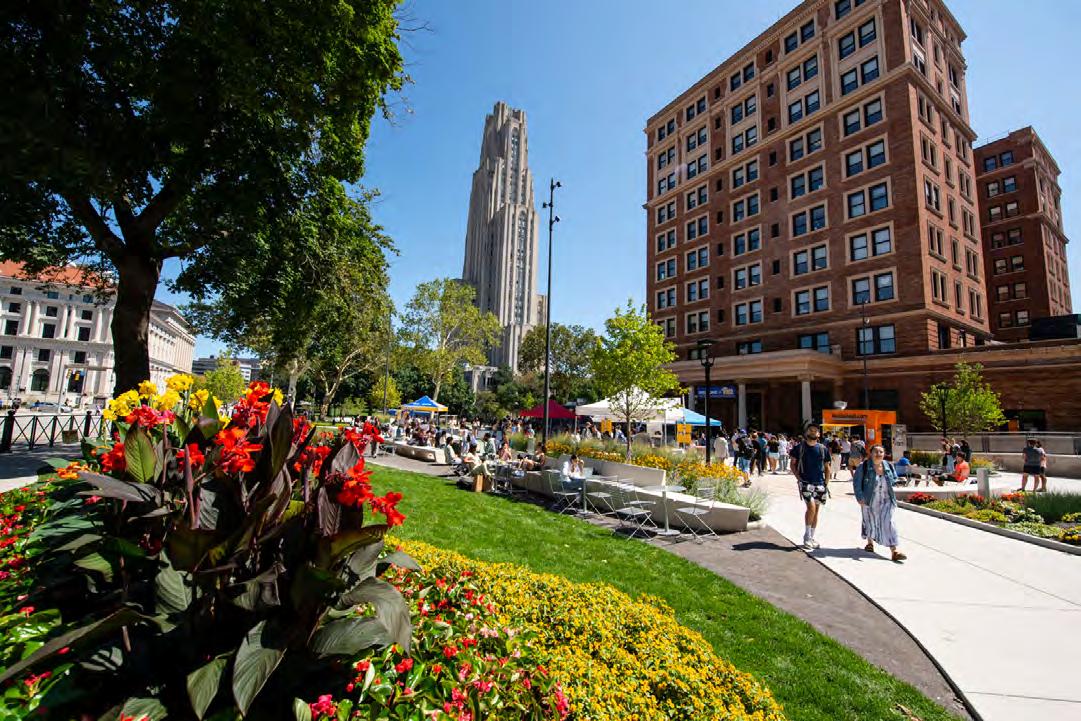

Completed in 2021, the renovation of Bigelow Boulevard exemplifies how quality design can create safe urban pathways shared by a wide variety of people and vehicles. Located between the William Pitt Union and the Cathedral of Learning, the pathway has been recognized as Pitt’s first Complete Street and was named a top ten “Best New U.S. Bike Lanes”.
The project created new protected bike lanes and a raised crosswalk alongside bioswales that can handle 5,150 cubic feet of stormwater. Underneath, updates to utility infrastructure create resiliency and redundancy to support the campus.

Underutilized space beside the William Pitt Union was also transformed into a versatile gathering place constructed with permeable pavers and rain gardens, in addition to ample outdoor seating.
Panther Walking Route: of several campus walking routes, the Walking Route physical activity. It includes 10 stops across the Pittsburgh campus, each with signage that includes a QR code for participants to learn more about the history, architecture, and sustainability facts related to that location.
Get Active: Future organized campus physical activities will include more inclusive, accessible, and collaborative offerings, including working to reach every student living on-campus. Efforts will include more “Intro to” series for activities like biking, climbing, and weight training, as well as additional co-ed and non-competitive intramural offerings that offer physical activity while enhancing social relationships like capture the flag, eSports, and spikeball. New programming will be offered for students with non-dominant identities, make space for creativity, and focus on the overlap between physical, mental, and environmental wellness (including an outdoor recreation therapy series and therapy dog visits).
2018-22 Progress Report on Pitt Sustainability Plan 98
Where We Are: Individual Health
COVID Sick Bank: To assist full and part-time employees during the COVID-19 pandemic, a Temporary Voluntary Sick Day Bank was created. During the height of the pandemic, employees had the opportunity to make a one-time donation to the bank and/or request additional sick time. During this time 18,333 hours were donated by 218 employees, assisting 91 employees so far with 4,839 hours of sick time.
Year of Emotional Well-Being: Since 2014, the University of Pittsburgh has celebrated a “Year of” initiative, with past themes including sustainability, creativity, and engagement. The 2022-23 academic year is the Year of Emotional Well-Being, which aids our ability to manage stress, overcome adversity, reduce feelings of negativity, and approach life in a positive manner.


The pandemic underscored the importance of fully supporting the emotional welfare of students, faculty, and staff.

2018-22 Progress Report on Pitt Sustainability Plan 99
CITY & REGIONAL CONNECTIONS
We understand our campus and our community are part of a larger set of systems and embrace Pittsburgh sustainability initiatives to be leaders within the region.
2018 PITT SUSTAINABILTY PLAN GOALS
Transparency: Create a process of greater transparency between Pitt and our community for knowledge sharing and capacity building (building the tools for empowering change).
Leadership: Take active leadership roles in sustainability initiatives in Oakland, Pittsburgh, and the surrounding region and demonstrate solutions to our grand challenges.

Community: Incentivize sustainability activism, and community work and provide opportunities for volunteerism, internships, service, and community engagement efforts that focus on sustainability.
Partnership: Embrace a culture of impactful service through longterm investment in our communities.
Where We Are: Transparency
Ease of access to information is both critical for understanding and a requirement to review and improve systems in pursuit of more sustainable outcomes. As a result, Pitt Sustainability has worked to centralize and publish key data and informational resources that support transparency within and about the Pitt community. Data availability and accessibility is also the first tactical approach to using the Pitt campus as a living laboratory, empowering every student and employee to positively interact with sustainability on-campus.
Pitt Sustainability Dashboards: First published in 2020, the Pitt Sustainability Dashboards provide interactive views of progress on select Pitt Sustainability Plan goals. Community members can track multiple performance indicators for the Pittsburgh campus, ranging from building energy and water use intensity to compostable diversion to food recovery.

Pitt Diversity Dashboards: First published in 2021, the Vendor Contracting Diversity Dashboard provides a view into the direct spend of the University with contracted vendors by diversity group. This enables community members to track the progress Pitt is making towards institutional diverse spend goals in construction and nonconstruction contracts.

100
2018-22 Progress Report on Pitt Sustainability Plan
The Association for the Advancement of Sustainability in Higher Education’s (AASHE) Sustainability Tracking, Assessment, & Rating System (STARS) is a national college and university certification that uses 108 key performance indicators to rank higher education sustainability performance. Recognition levels include Participant (lowest) through Platinum (highest). The University of Pittsburgh first reported to AASHE for review in 2018 and received a Silver rating. Pitt submitted again in 2021 and advanced to an AASHE STARS Gold rating, recognizing achievements made from 2018 through 2021.

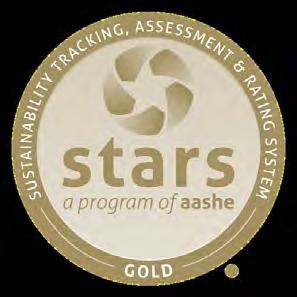
University Reports to the Commonwealth: As a public state-related institution of higher learning, the University of Pittsburgh reports annually to the Commonwealth of Pennsylvania on the impact Pitt has on the region and world.

Board of Trustees: Pitt’s Board of Trustees provides University governance, including “stewardship of Pitt resources and assets.” Various Board committees receive regular and ad hoc sustainability updates, including the Property & Facilities and Budget Committees.
Where We Are: Sustainability Leadership in Regional Higher Education
Higher Education Climate Consortium: Since 2008, the Higher Education Climate Consortium (HECC) has played a critical role in both bringing the Pittsburgh region’s higher education institutions together and putting intentionality behind advancing campus greenhouse gas reduction goals, both individually and collectively. The University of Pittsburgh was a founding HECC member and has co-chaired HECC over the years, most recently from 2019 to present day. In 2023, HECC finalized its Strategic Plan for Equitable Climate Mitigation for the collaborative, while simultaneously providing the support to institutions who have historically had less capacity to advance imperative climate action.
101 2018-22 Progress Report on Pitt Sustainability Plan
AASHE STARS Gold, 2021
Where We Are: Sustainability Leadership with Regional Governments

Marshall Plan for Middle America: In November 2020, the City of Pittsburgh launched the Marshall Plan for Middle America (MP4MA) – a strategy focused on how the Ohio Valley could become a global leader in clean energy and circular economy by building a regional, multisectoral coalition to drive investment in infrastructure and energy diversification. The MP4MA was crafted by Pitt’s Center for Sustainable Business (CSB) with inputs from academic researchers, the City of Pittsburgh, the United Nations Sustainable Development Solutions Network USA, and others.
The MP4MA was globally recognized in 2021 with second place in the International Climate Challenge Cup City of Pittsburgh. Pitt CSB has worked to share the MP4MA globally at conferences, including at the 2022 Global Clean Energy Action Forum. The MP4MA team has collaborated on a number of convenings and events, including the 2021 MP4MA Summit with Resilient Cities Catalyst focused on accelerating regional MP4MA projects towards implementation.
Further 2023 Pitt CSB-led Middle America convenings are planned with government and university representatives to establish next regional steps with supported from a new Pitt CSB full-time person focused on decarbonizing Middle America as envisioned in the MP4MA.

Congress of Neighboring Communities (CONNECT)
CONNECT has three working groups:
Economic & Environmental Development
Infrastructure & Utilities Coordination
Public Safety, Health, &
Human Resources
CONNECT Climate & Sustainability Action: An ever-evolving initiative of the Pitt Graduate School of Public and International Affairs (GSPIA), the Congress of Neighboring Communities (CONNECT) serves as a policy think tank comprising of neighboring municipalities in Allegheny County. CONNECT members share resources, research, and opportunities to advance environmental and economic development for the benefit of the region. In the last few years, 9 CONNECT communities inventoried their greenhouse gas (GHG) emissions and developed individualized plans to guide future emissions reductions in their jurisdictions (Carnegie, Etna, Forest Hills, Millvale, Munhall, Sharpsburg, Swissvale, West Homestead, and the City of Pittsburgh).
Building on that work, in 2022, CONNECT adopted the first CONNECT Climate Action Plan to engage and empower its members to reduce greenhouse gas emissions and adapt to regional climate impacts. Alongside climate change, CONNECT members focus on other sustainability topics, including lead safety, recycling, stormwater, transit, and more.
2018-22 Progress Report on Pitt Sustainability Plan
102
Photo courtesy of U.S. Dept. of Energy
Where We Are: Service to Our Communities
Pitt provides and connects a wide variety of sustainability-focused and -related volunteer and service opportunities for Pitt students and employees to get involved in sustainability regionally, nationally, and globally.
Partnerships of Distinction: In 2019, the Mascaro Center for Sustainable Innovation (MCSI) received one of Pitt’s inaugural Partnerships of Distinction Award for a multi-year partnership with Pittsburgh’s Kingsley Associationon community-based environmental justice and air pollution initiatives.
In 2021, Dr. David Sanchez (MCSI, CEE) received the Tracy Soska & John Wilds Outreach & Engagement Leadership Award acknowledging his outstanding dedication to University-community connections. One of Dr. Sanchez’s most impactful educational partnerships started in 2015 withthe Oasis Project (the outreach extension of Bible Center Church in Homewood). The partnership focuses on sustainable urban agriculture and local food production in Pittsburgh’s food deserts.
Working with the Kingsley Association allowed the University to impact the greater Pittsburgh community while responding directly to a community’s definition of their needs…As a result of the EJCAM, community members are knowledgeable about green materials, infrastructure and land use practices, and they are more active in the management of forthcoming landscape features in housing developments and pollution control schemes.
Volunteering: Pitt students and employees are actively engaged in sustainability-related service across the region; examples from Civic Action Weeks in 2021 and 2022 include:
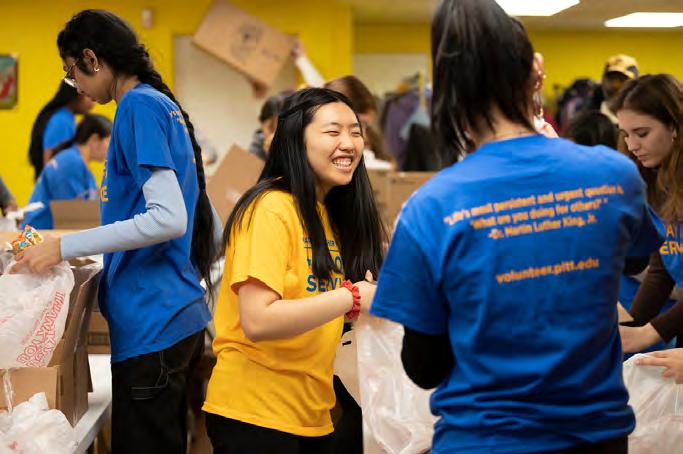
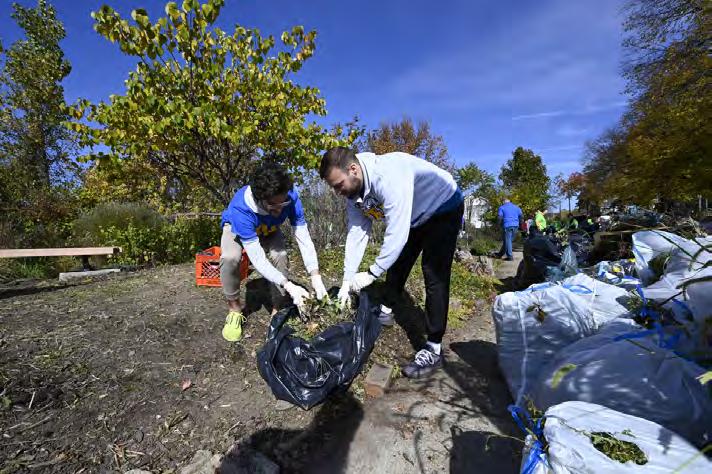

Hilltop Urban Farm — Crop and orchard maintenance (42 volunteers).
Millvale Community Development Corporation — Cleaned, painted, and advanced two affordable housing projects and maintenance at Gardens of Millvale (63 volunteers). Plant Five For Life — Planting 150 trees for habitat restoration (19 volunteers).
Additionally, all MCSI summer undergraduate research students participate in 2 full day service projects; from 2018 through 2022, ~2,000 person-hours of service were dedicated to organizations including Garfield Community Farm, Grounded, Oasis Project, and the community of Millvale.
"
— Dr. Melissa Bilec, Mascaro Center for Sustainable Innovation
103 2018-22 Progress Report on Pitt Sustainability Plan
"
Pitt Pandemic Service Initiative
From 2020-22, Pitt employees volunteered over 6,000 hours to help with community needs
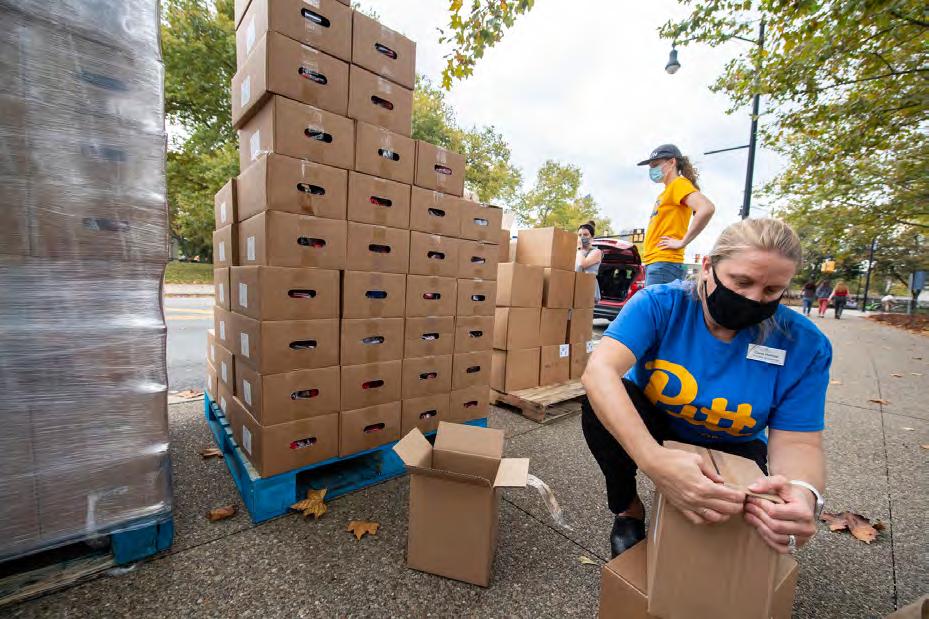
6,279 hours of service
Pitt Pandemic Service Initiative:
The COVID-19 pandemic presented an opportunity for Pitt to support our neighbors in new ways. Through the Pitt Pandemic Service Initiative umbrella, Pitt employees could volunteer up to 8 hours a week to help fill unmet community needs in the pandemic. As a result, more than 1,000 Pitt employees and students assisted 30 institution-wide efforts to fill the gaps of unmet needs – and in 2020 and 2021 students and employees tracked over 2,879 hours of service including tech assistance, distributing food, and more. Since the start of the initiative in 2020 through 2022, 1,595 Pitt employees tracked a total of 6,279 hours of service.
Employee Service & Professional Development: In 2022, Pitt formalized its service commitment, allowing employees to receive paid time off for one day a month to participate in community service, volunteer activities or professional development opportunities during regular working hours. This strategy allows Pitt employees to lend their expertise and support throughout the region on a recurring basis (see “Pitt Community Members on Boards” below) in addition to pursuing professional development opportunities.
Where We Are: Sustainability-Related Community Work
Through internships, community engagement, and other mechanisms, Pitt provides opportunities for Pitt students and employees to get involved in sustainability regionally, and nationally. While Pitt’s Community Engagement Centers are summarized in the “Partnerships” section of this report, the University has a wide variety of connections with communities in the City and across the regions.
Environmental Law Clinic: Pitt’s Environmental Law Clinic represents clients on issues related to air quality, water quality, trail access, oil and gas production, and environmental regulations with priority given to issues impacting Western Pennsylvania. From 2018 through 2022, Pitt students annually provided ~1,200 hours of pro bono legal assistance ranging from client counseling to regulatory advocacy to litigation.
Water Collaboratory Partnerships: Since 2018, Pitt’s Water Collaboratory for Research, Education and Outreach has paired undergraduate and graduate researchers with local nonprofits, governments, and community groups on projects that address significant resource challenges and regional environmental concerns (e.g., flooding, stormwater infrastructure, and water quality). Undergraduate students, graduate students, and faculty join with key stakeholders and decisionmakers to develop research questions and deliverables responsive to communities' concerns and needs. Partners have included, but are not limited to: 3 Rivers Waterkeeper, Saw Mill Run Watershed Association, UpstreamPgh, UrbanKind Institute, and elected officials.
104 2018-22 Progress Report on Pitt Sustainability Plan
Where We Are: Sustainability Policy & Advocacy

Pitt Community Members on Boards: As part of the University’s long-term investment in our communities, many Pitt employees and students embrace a culture of impactful service by applying their expertise to the benefit of numerous regional governments, school boards, and nonprofits through board and committee service. Pitt employees across various fields and positions serve on City of Pittsburgh and regional government boards and commissions that guide and create regional polices on and/or relating to sustainability including, but certainly not limited to:
Allegheny County Board of Health — Member, Infectious Disease Professor
Allegheny County Sanitary Authority — Board Member, Clinical Associate Professor, Business Administration
City of Pittsburgh Planning Commission — Member, Graduate School of Public and International Affairs Associate Professor
Clean Pittsburgh Commission — Member
Pittsburgh Water and Sewer Authority — Board Member, Professor of Business Administration, Psychology, and Public & International Affairs
Southwestern Pennsylvania Commission — Commissioner, Executive Director of Sustainability
PItt Votes: Pitt has a long-held commitment to civic engagement and is working to create a more civically engaged institution. As a result, the Pitt Votes coalition started collaborating with national partners on voter engagement in 2020, including the National Study of Learning, Voting, and Engagement (NSVLE). Pitt’s own 2020 NSVLE report showed a University-wide student voting rate of 78.5% in 2020 -- a 12.6% increase from 2016. In 2022, Pitt was recognized in the inaugural cohort of “Most Engaged Campuses for College Student Voting” determined by the ALL IN Campus Democracy Challenge.

CaseStudy:Student SustainabilityAdvocacy
Overthepastseveralyears,Pitt studentshavebeenveryactiveand visibleinlocalsustainabilityadvocacy. Fromleadinglocalclimatemarchesto advocatingforstudentbasicneeds resourcesandmenstrualequity,Pitt studentsarefocusedonsocialand environmentaljustice.

105 2018-22 Progress Report on Pitt Sustainability Plan
Sustainability Policy Support
Whether local, national, or global policy, Pitt students and employees play a wide variety of roles in advocating for, informing, researching, and implementing sustainability policies. A few highlights since 2018 include:


Bike+ Master Plan: City and regional bike lanes & trails help facilitate biking to and around campus. Reflecting this symbiosis, in Spring 2020, the University submitted comments and a letter of support to the City of Pittsburgh’s Department of Mobility and Infrastructure (DOMI) regarding implementation of the City of Pittsburgh’s Bike(+) Master Plan, which set a strategy for expanding the city-wide biking network by providing over 220 new miles of safe and accessible connections for bikers across Pittsburgh.
MoveForwardPGH: The University of Pittsburgh was a lead supporter of DOMI’S MoveForwardPGH campaign demonstrating how all users of the road benefit from bike infrastructure improvements, whether driving, walking, scooting, cycling, or rolling.
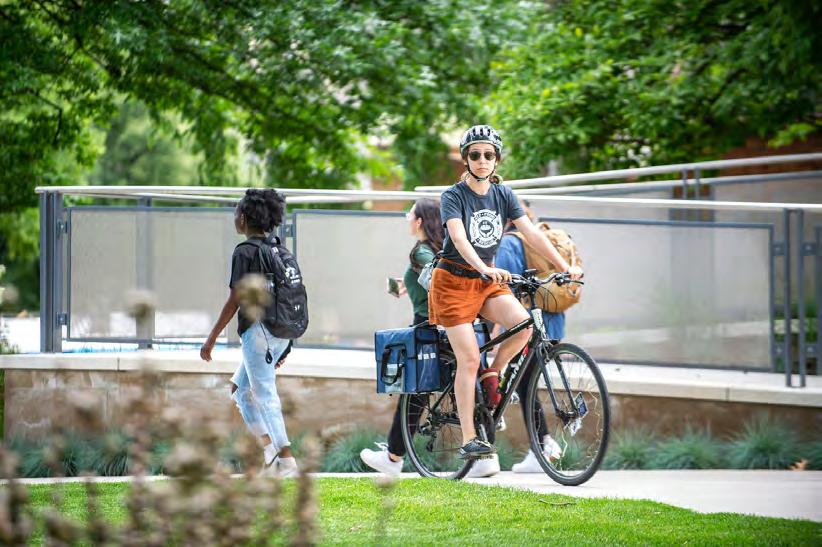
City of Pittsburgh Single-Use Plastic Reduction: The University of Pittsburgh has been a local leader in single-use plastics reduction since 2014, including phasing out single use plastics from retail and foodservice – and is a member of Sustainable Pittsburgh’s Plastics Collaborative. Alongside other universities, the University supported City-led plastic waste reduction policies in 2021 that led to a 2022 Single Use Plastic Bag Ban by the City of Pittsburgh.
Plugging Oil & Gas Wells: Research and advocacy by Dr. Jeremy Weber (GSPIA) helped advance local and federal funding to plug oil and gas wells in Pennsylvania.
America’s Energy Gamble: Dr. Shanti Gamper-Rabindran’s 2021 book, America’s Energy Gambledetails how institutions entrench fossil fuel dependency, but cost-competitive renewable energy has gained traction. Her advocacy focuses on both diverse local energy and federal funding.
106 2018-22 Progress Report on Pitt Sustainability Plan
This report and the efforts described within would not be possible without dedicated effort by individuals and groups across the University. The Pitt community has risen to the challenge of preserving our planet with the collaboration, determination, and creativity that makes the impossible a reality every day. Together, we are creating a more sustainable future.


Thank you.
107 2018-22 Progress Report on Pitt Sustainability Plan


Office of Sustainability 153 Benedum Hall 3700 O’Hara Street Pittsburgh, PA 15261 412-624-5122 sustainability@pitt.edu sustainable.pitt.edu









































































































































































































































































































